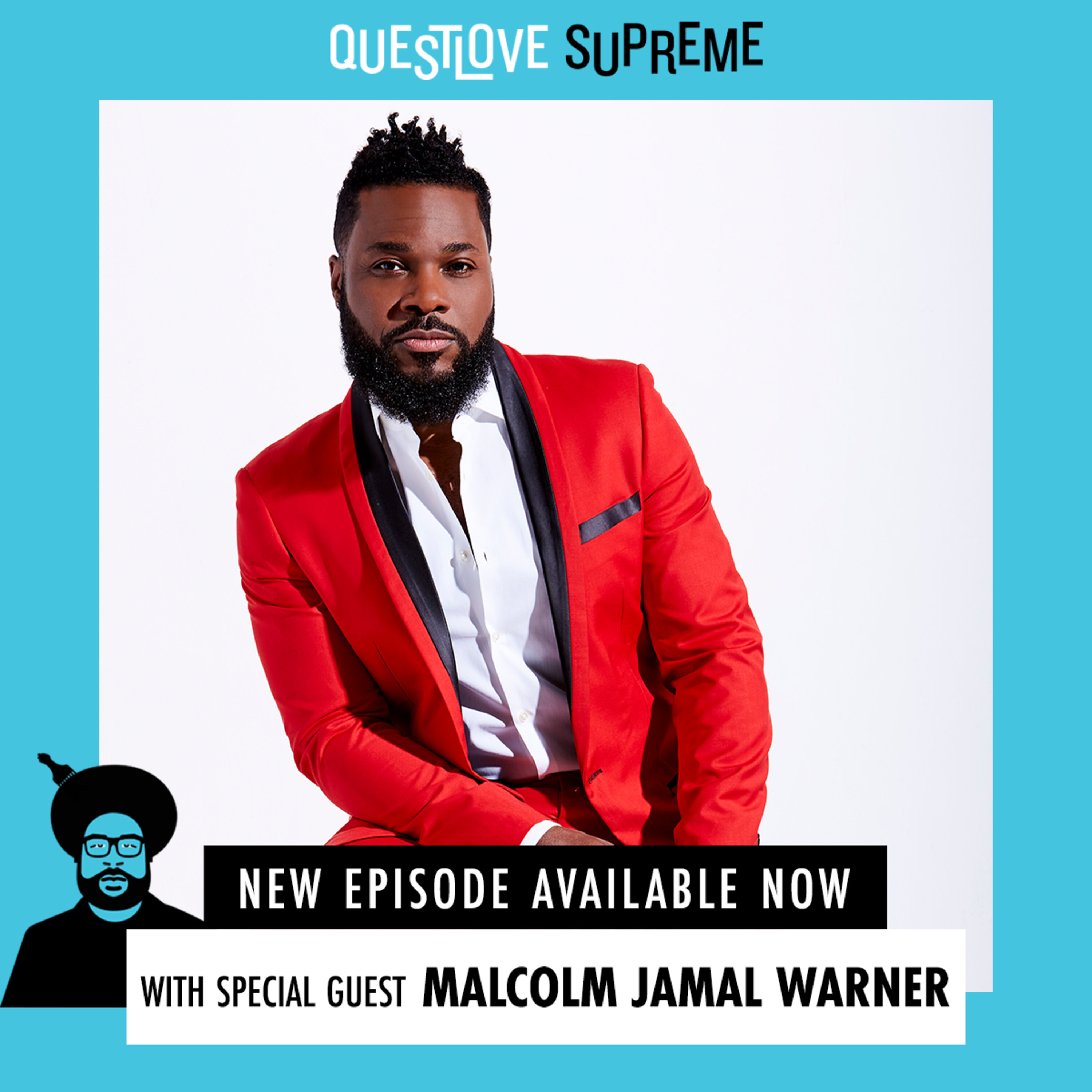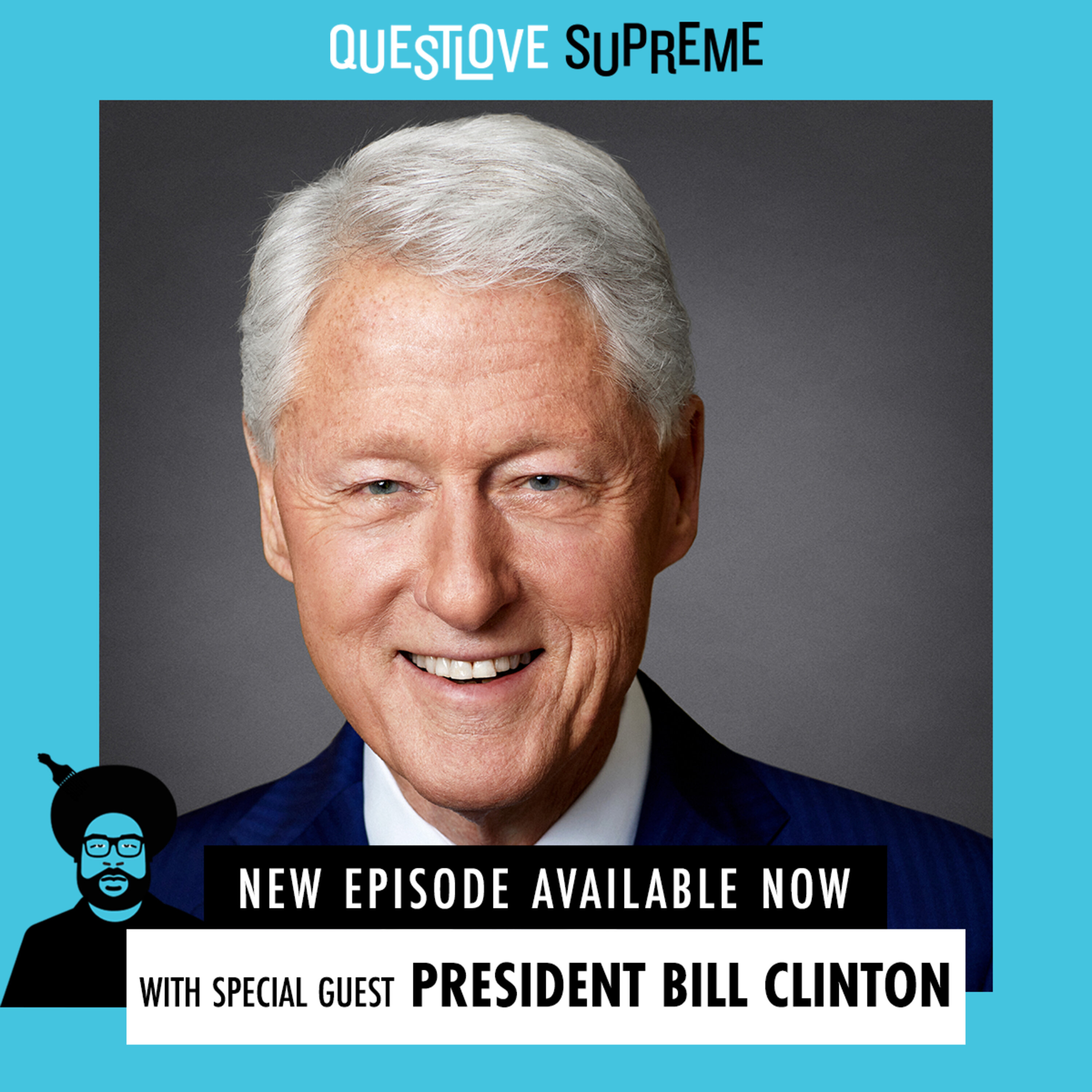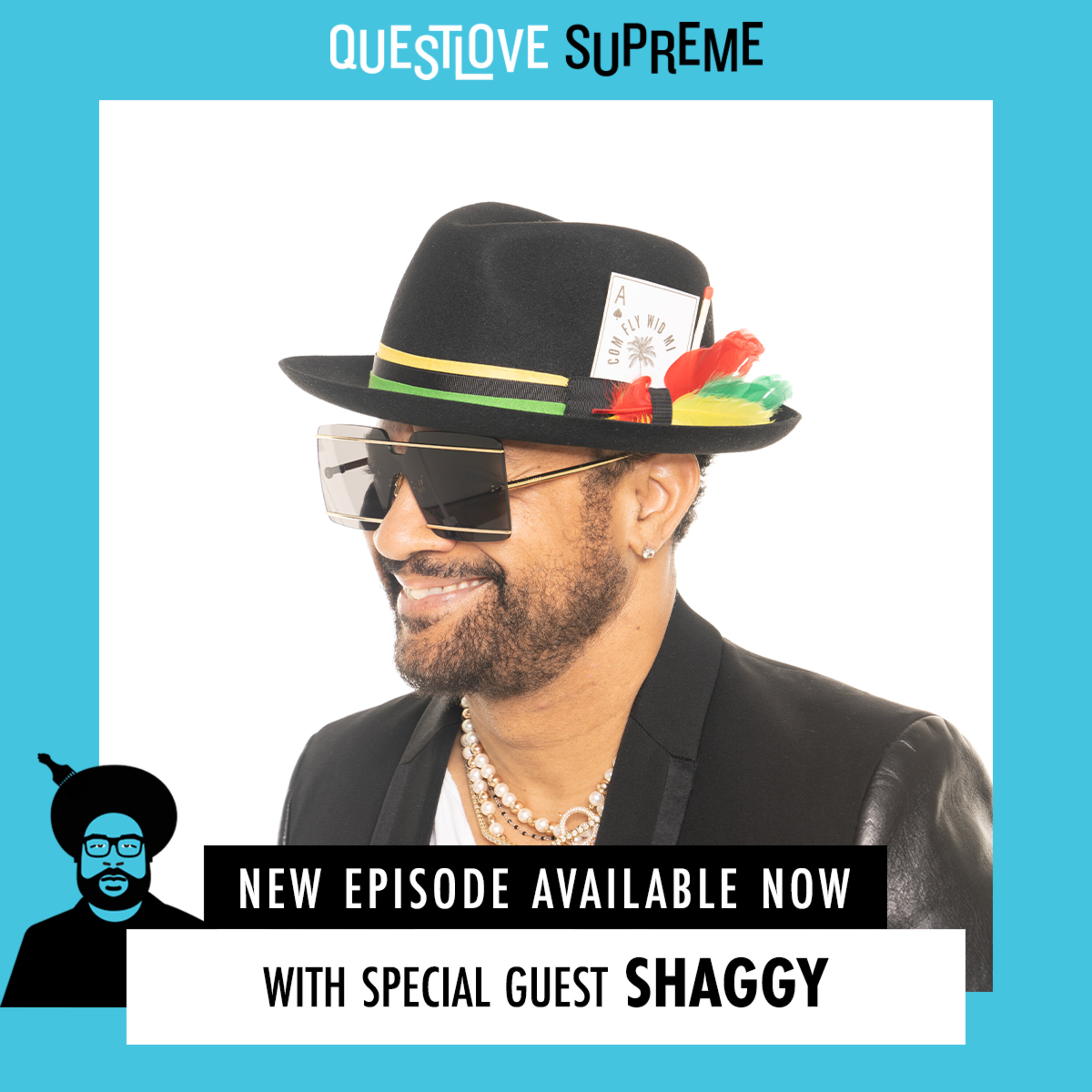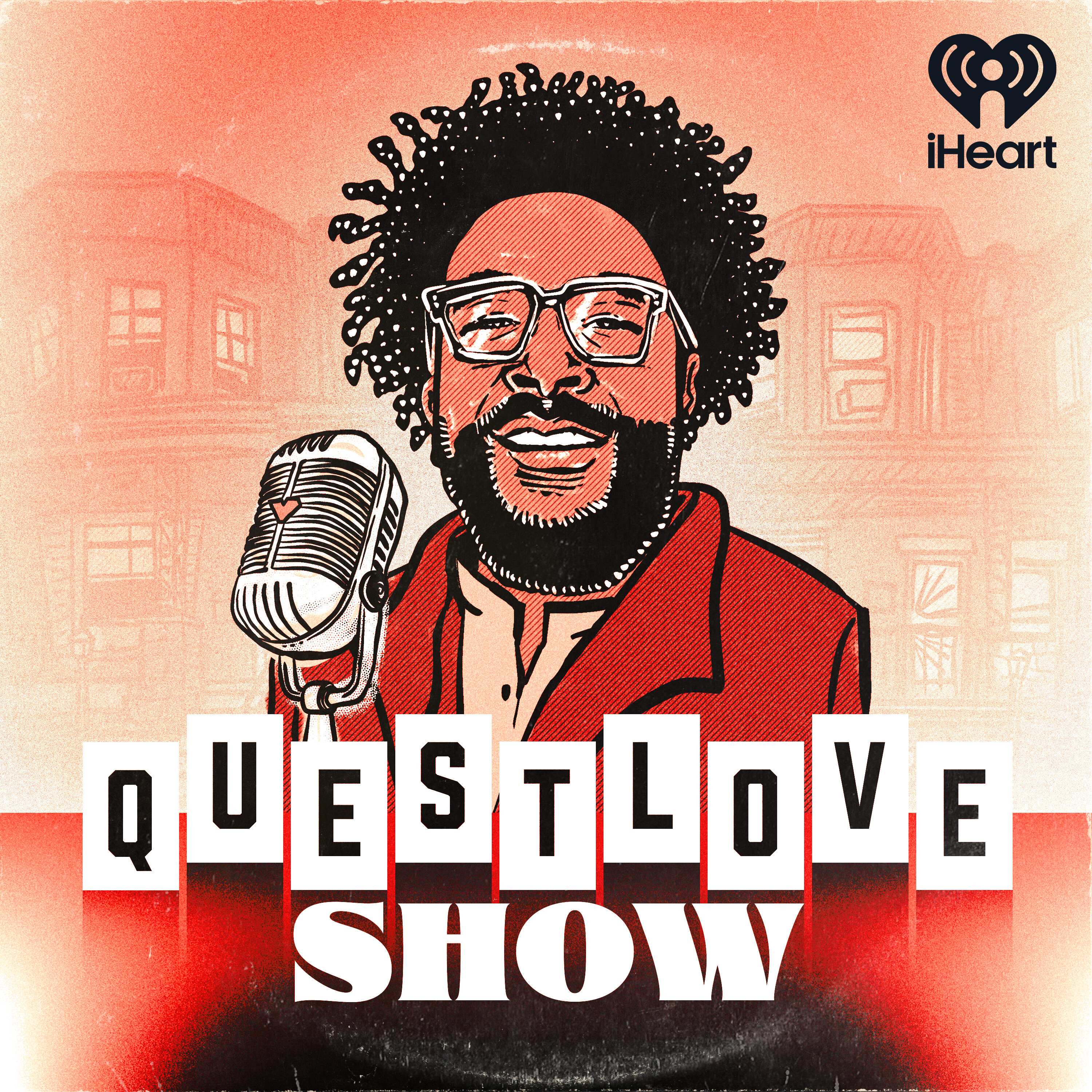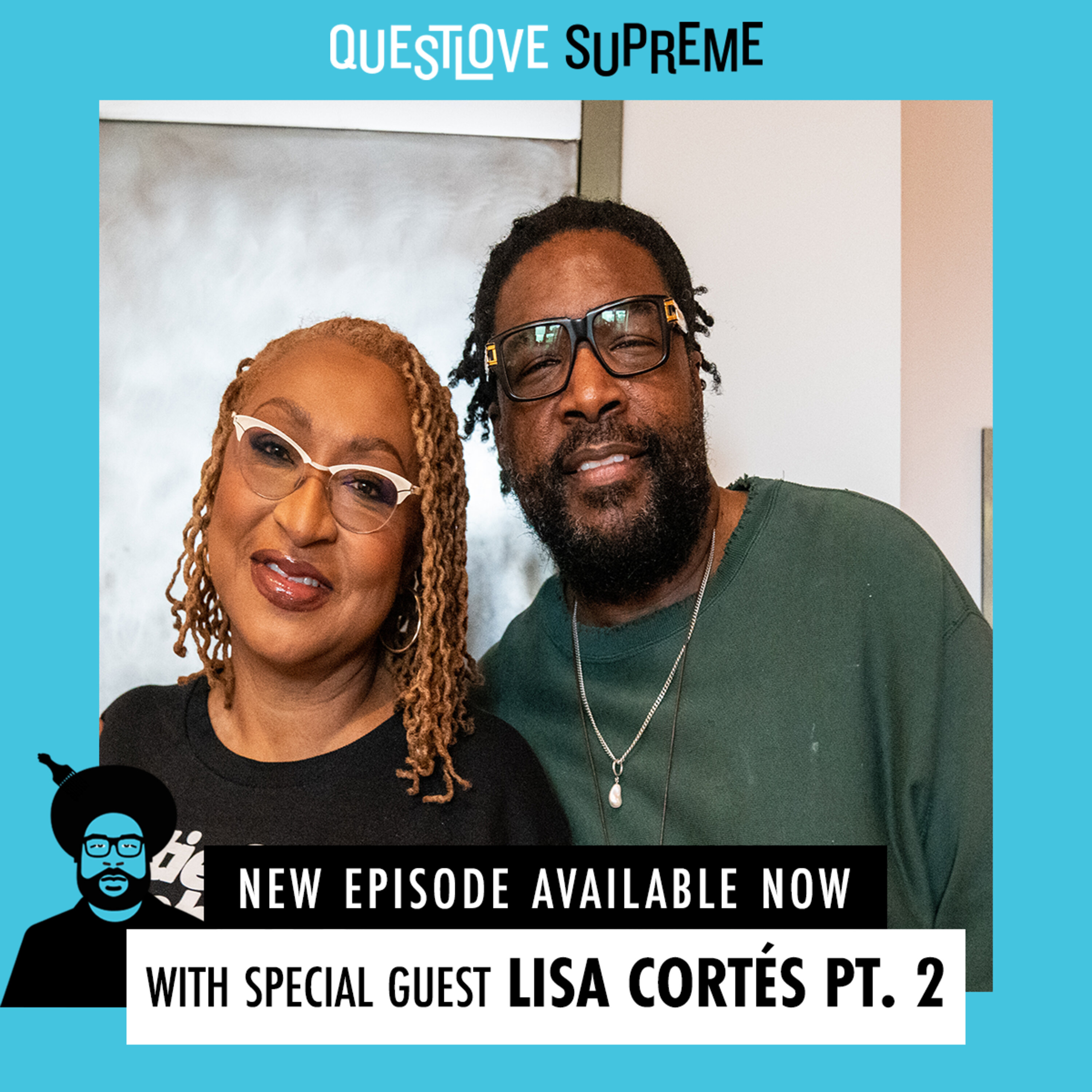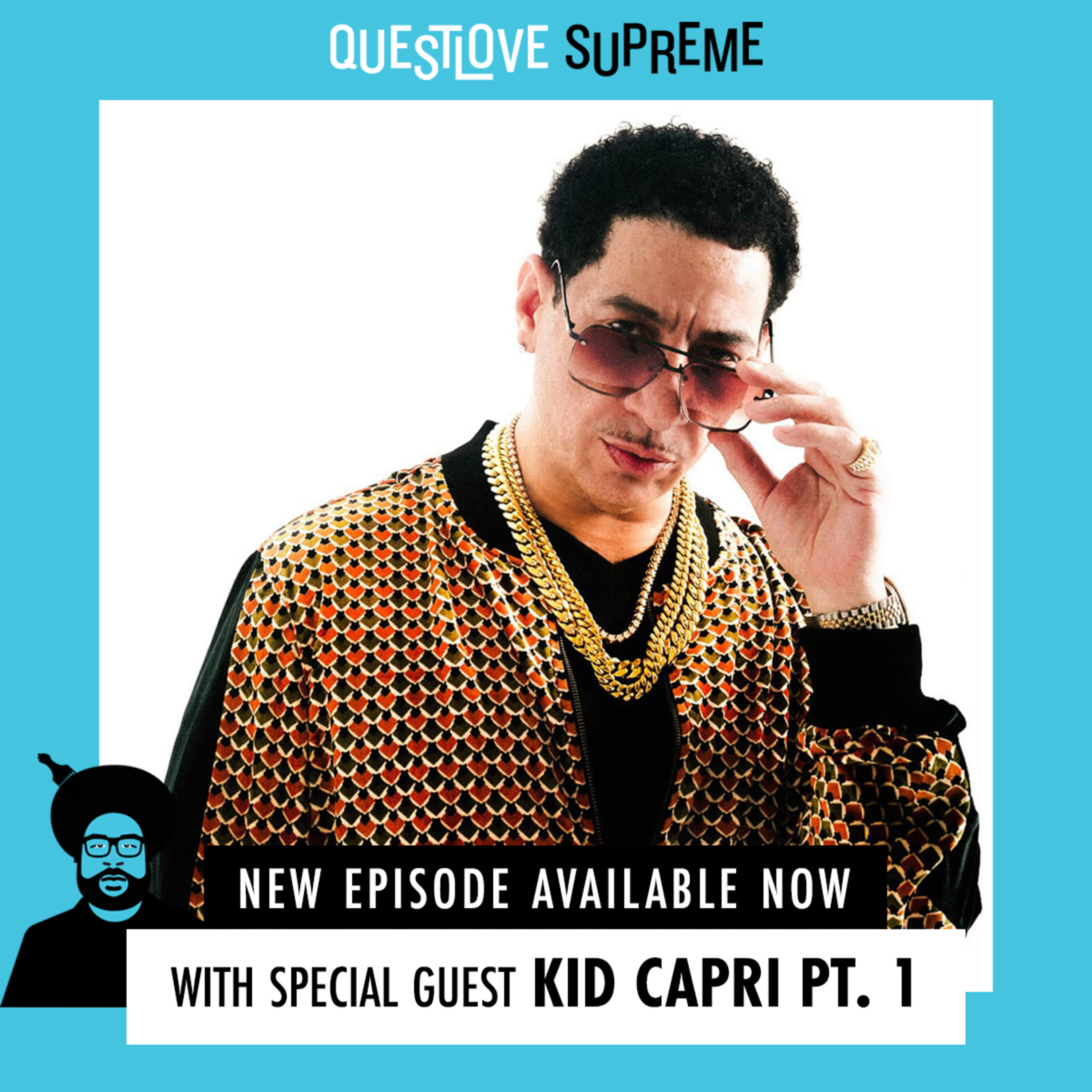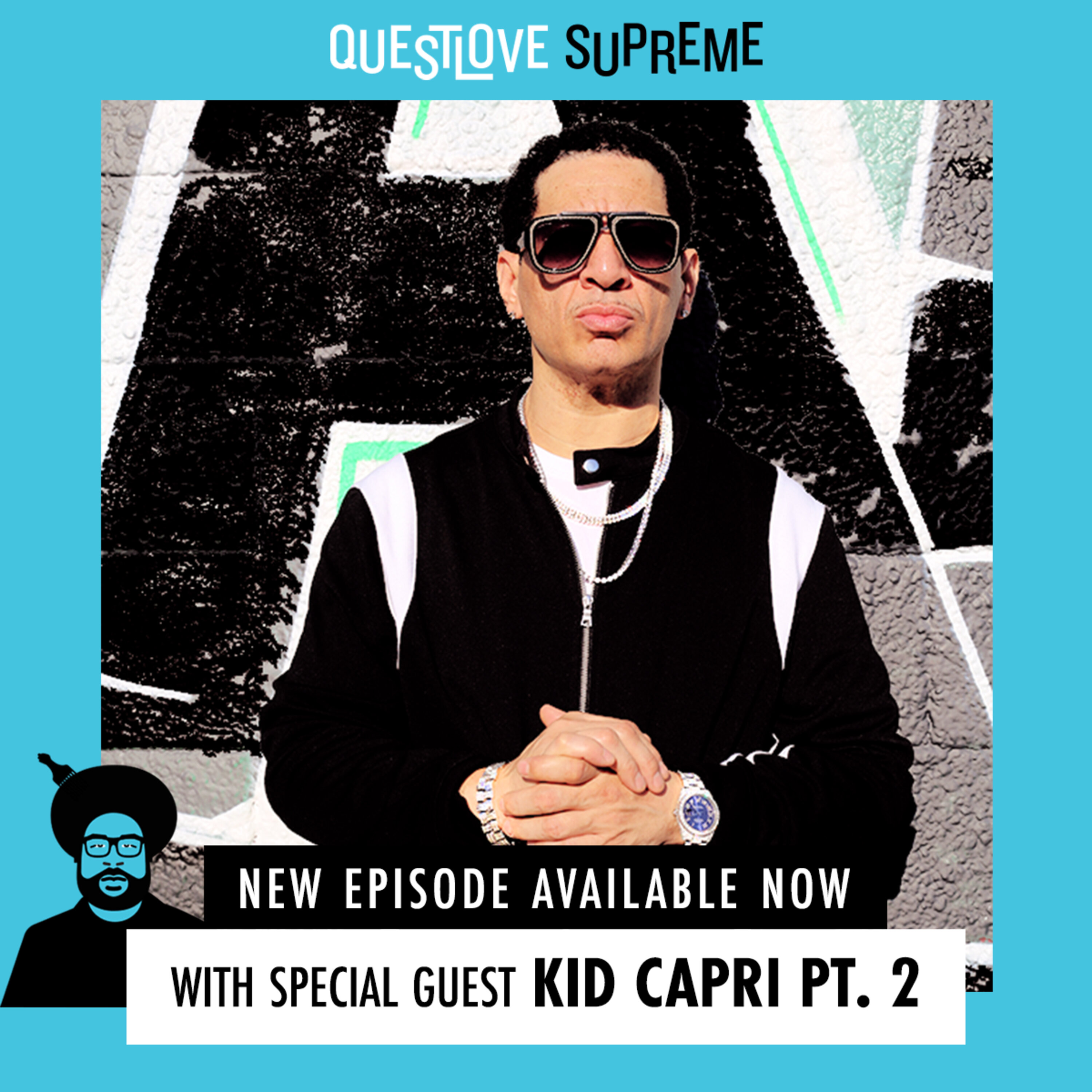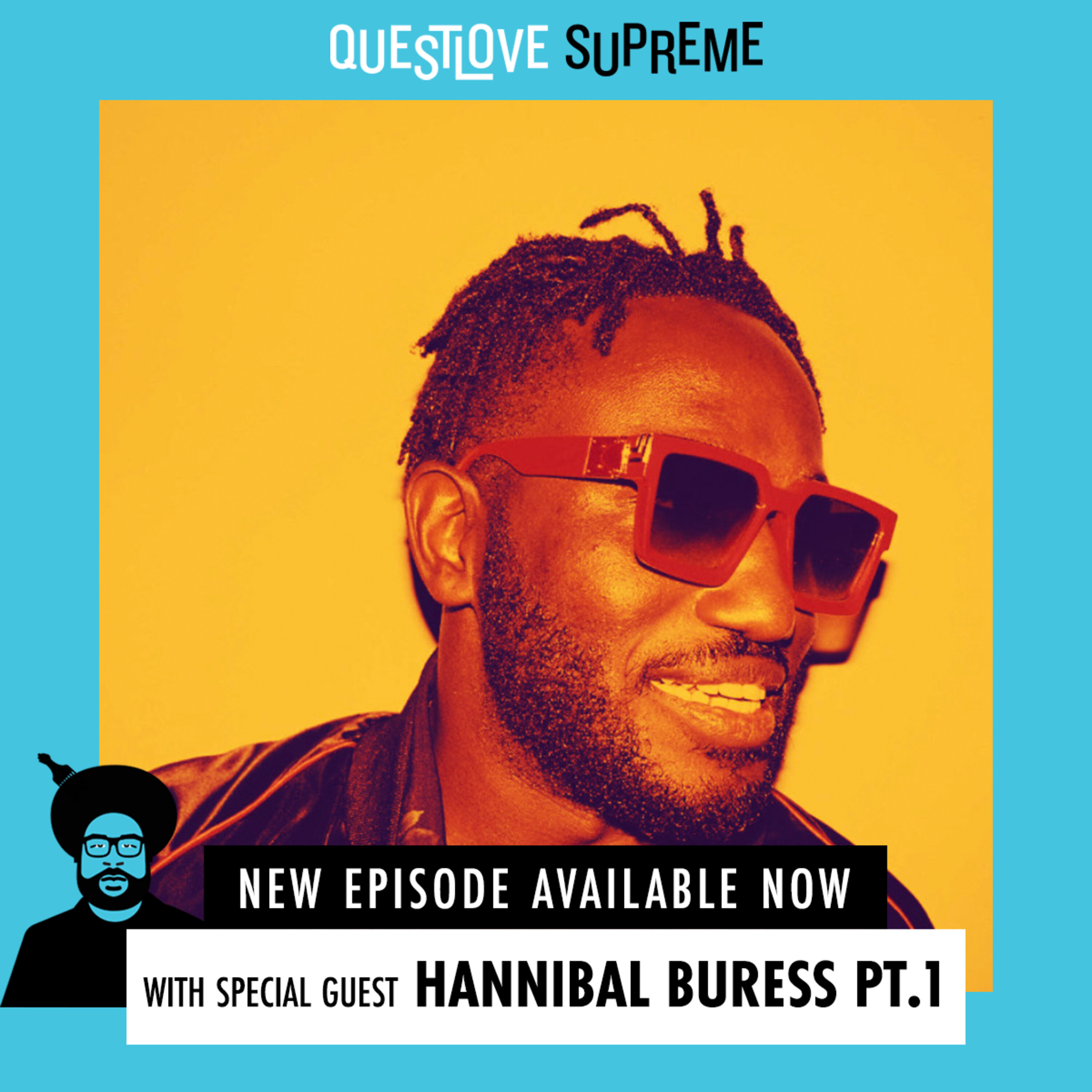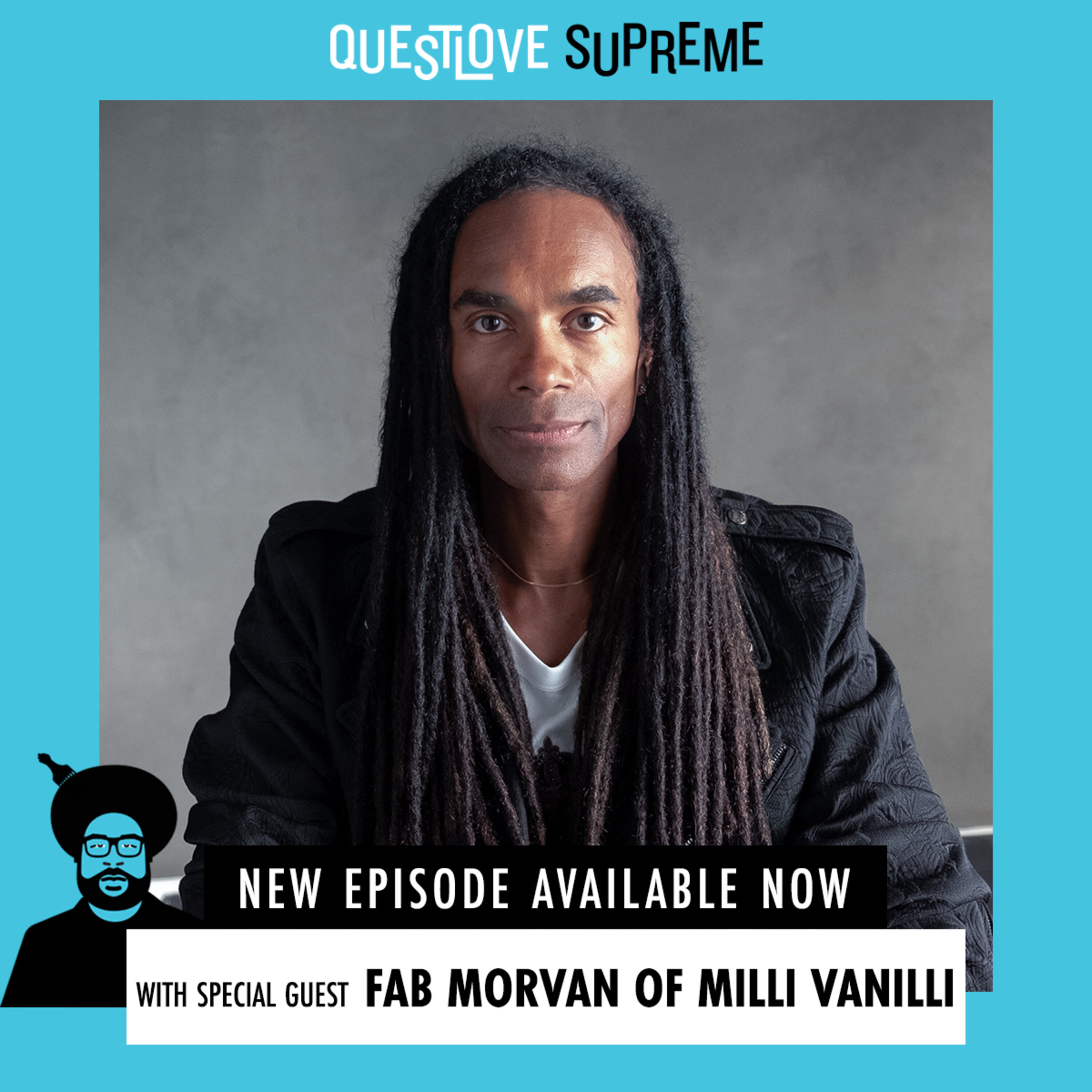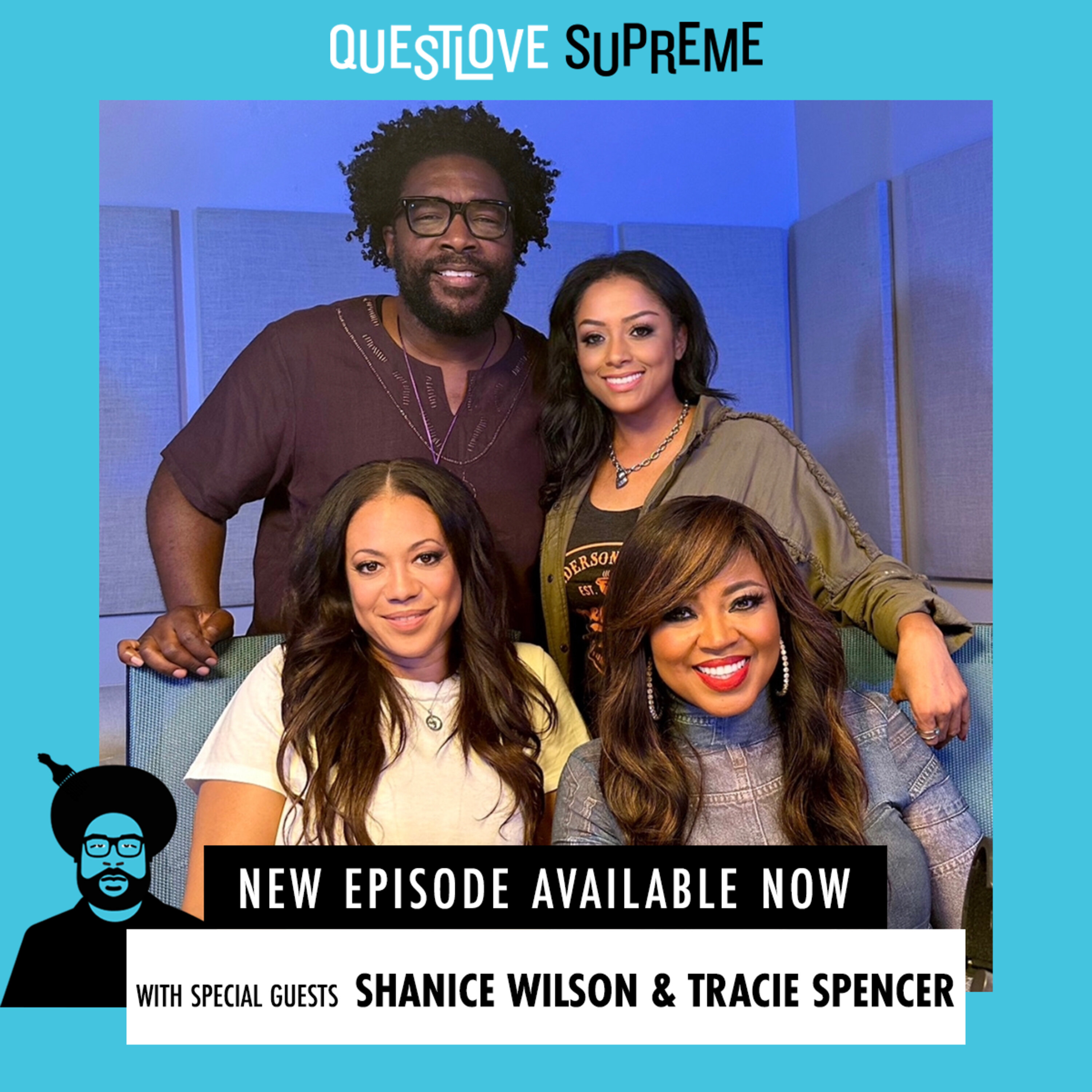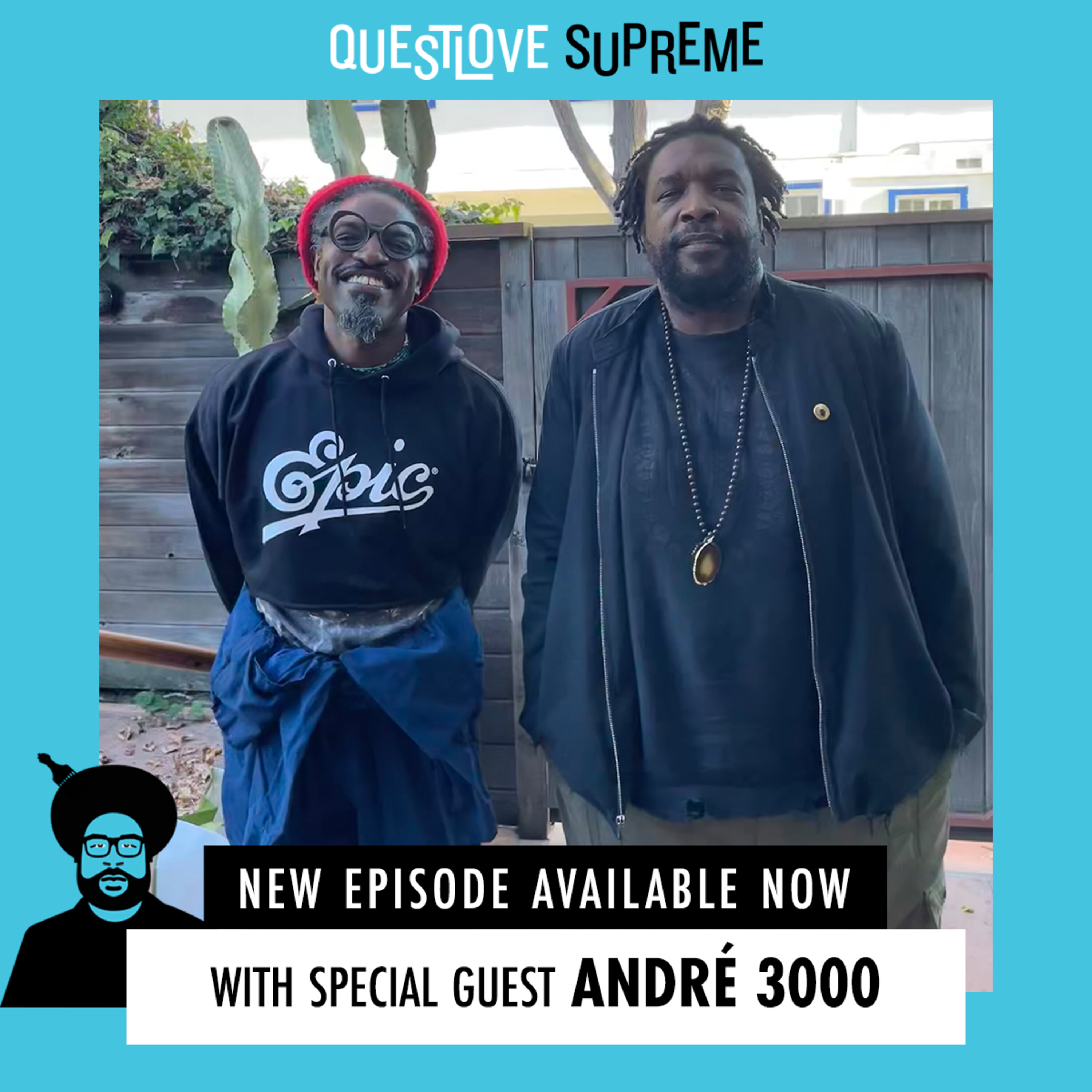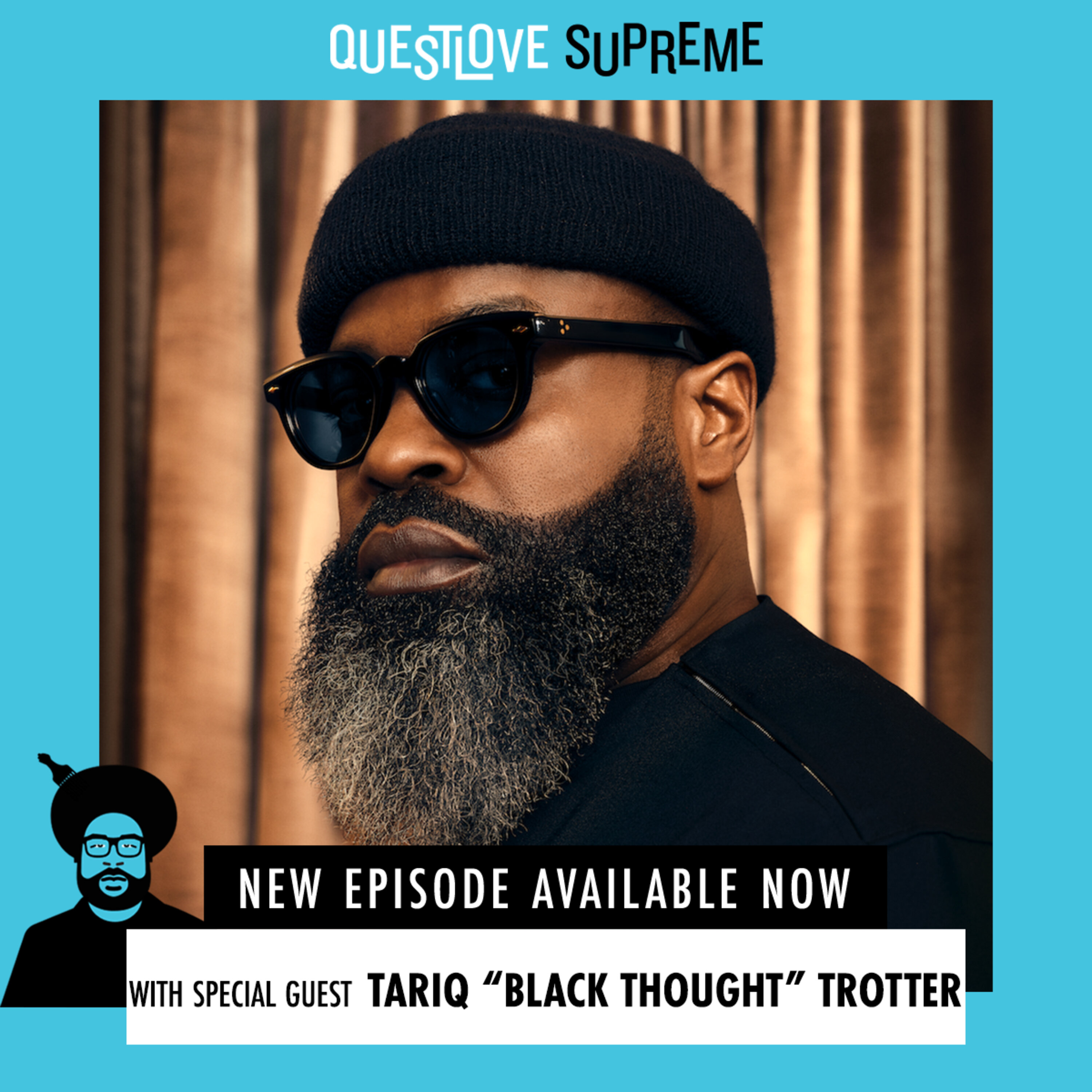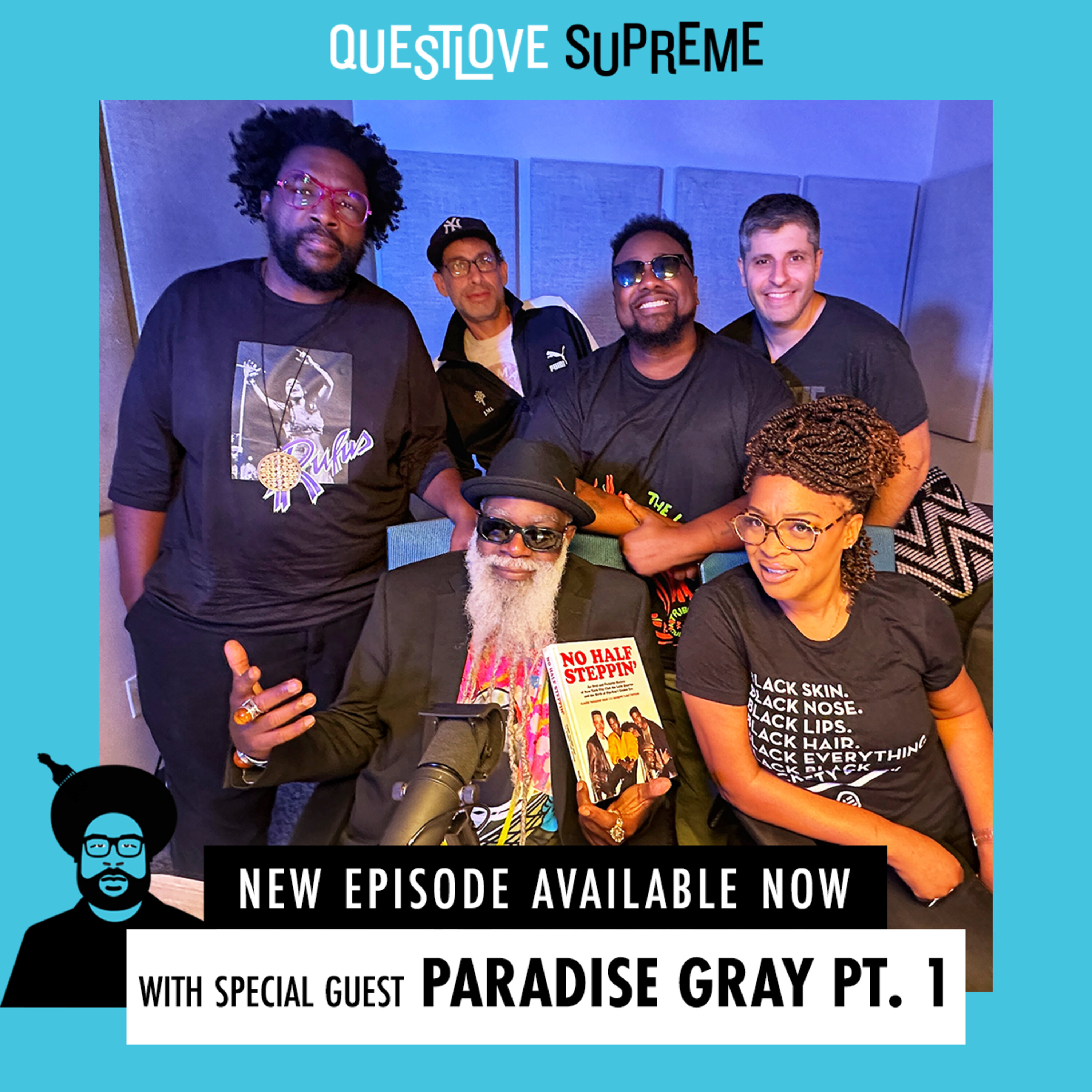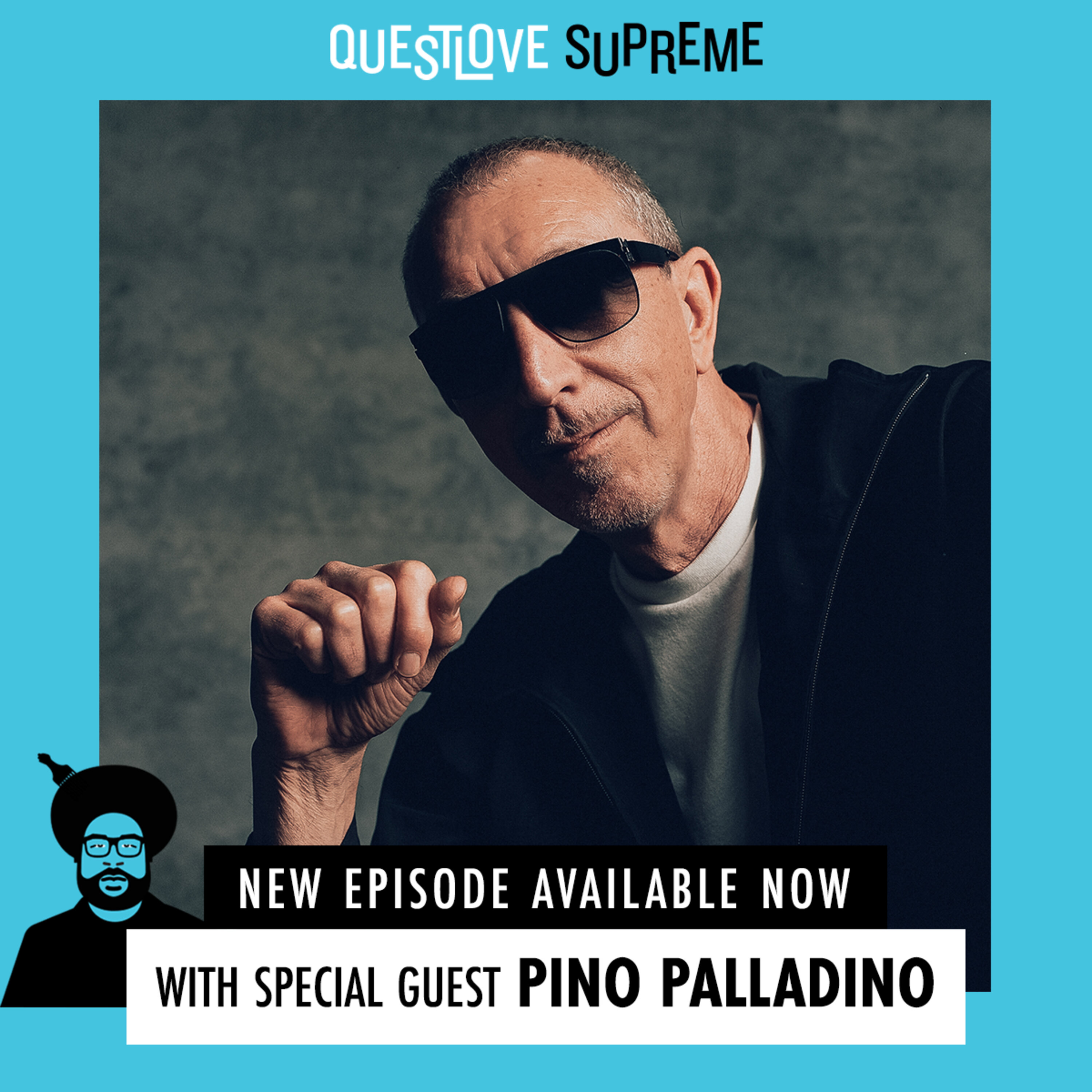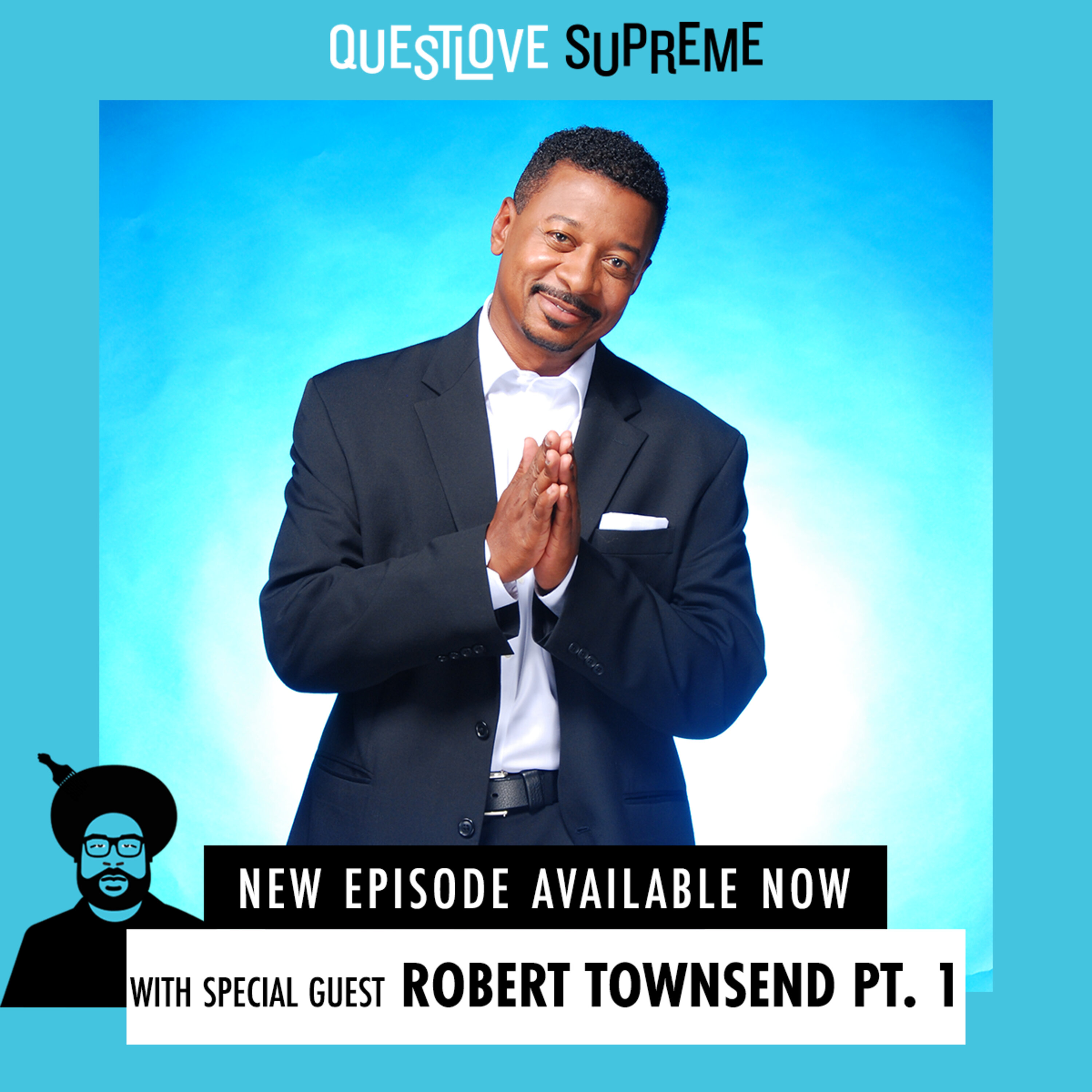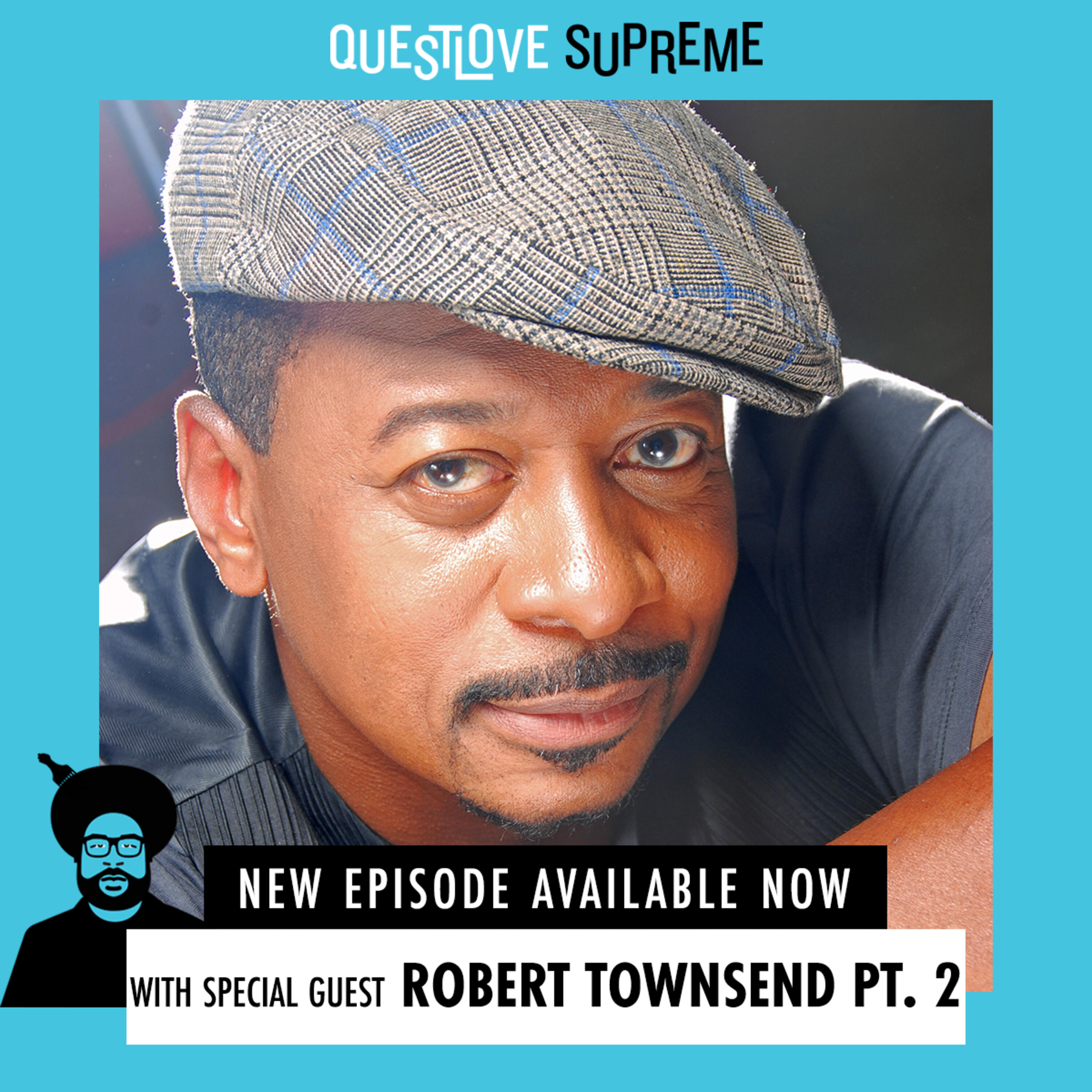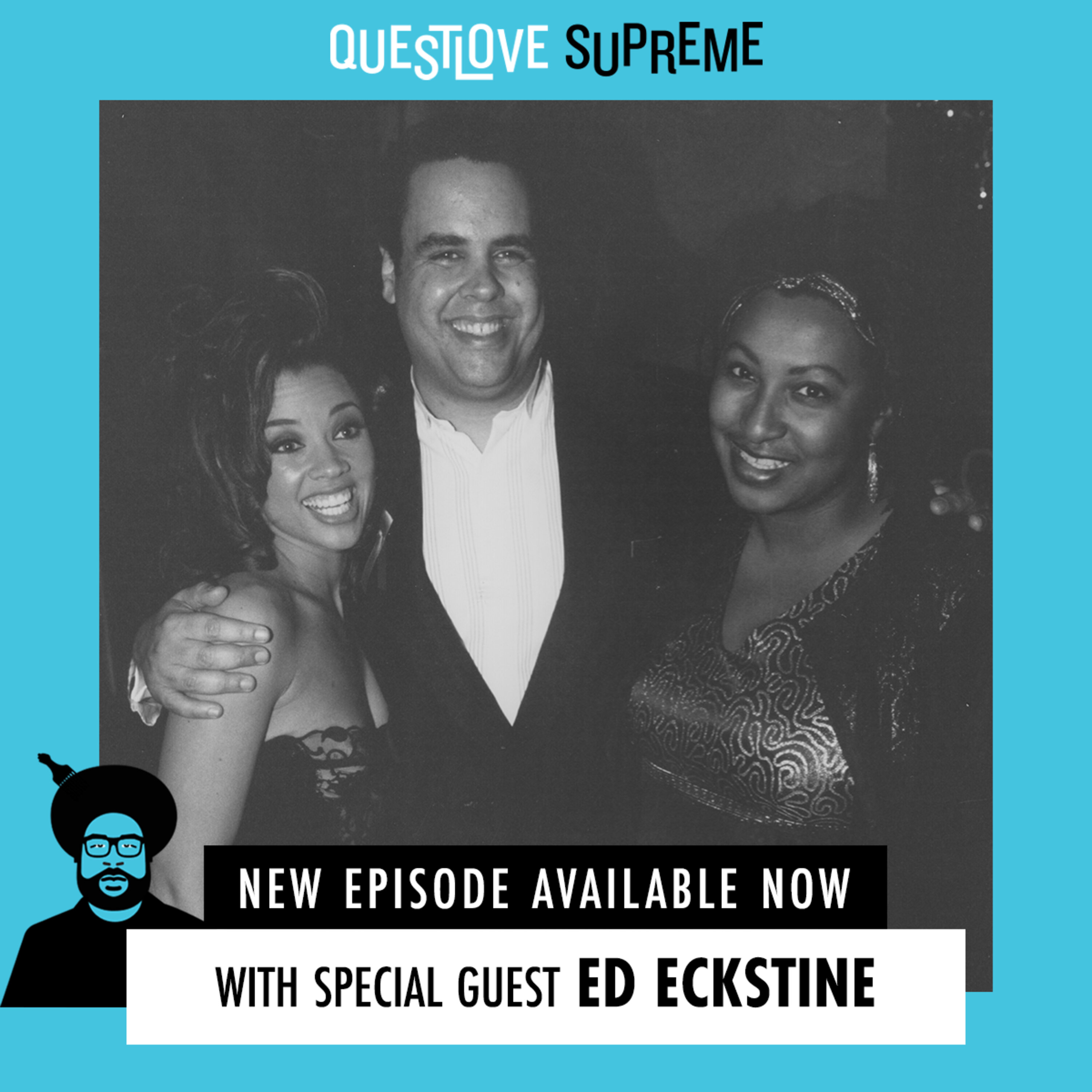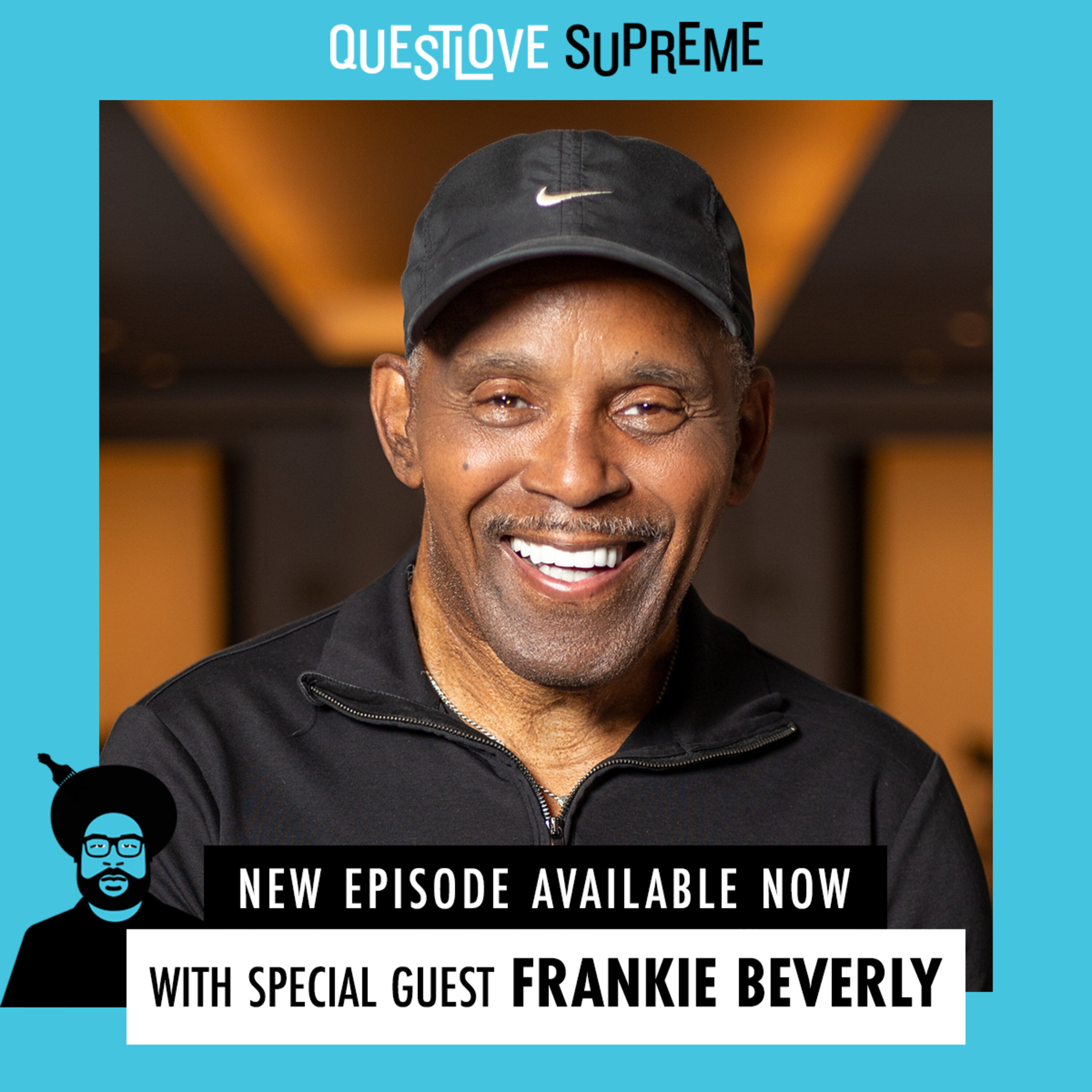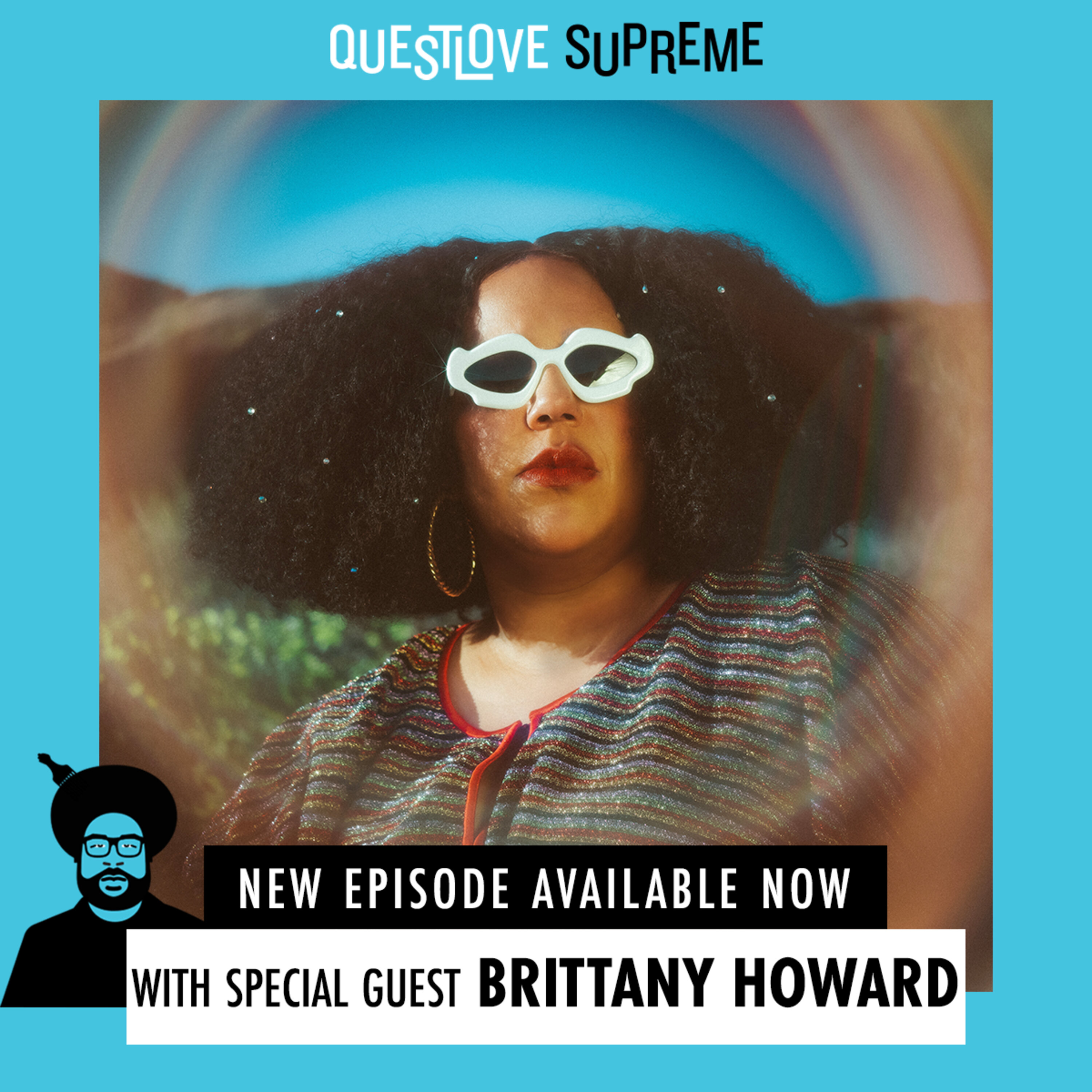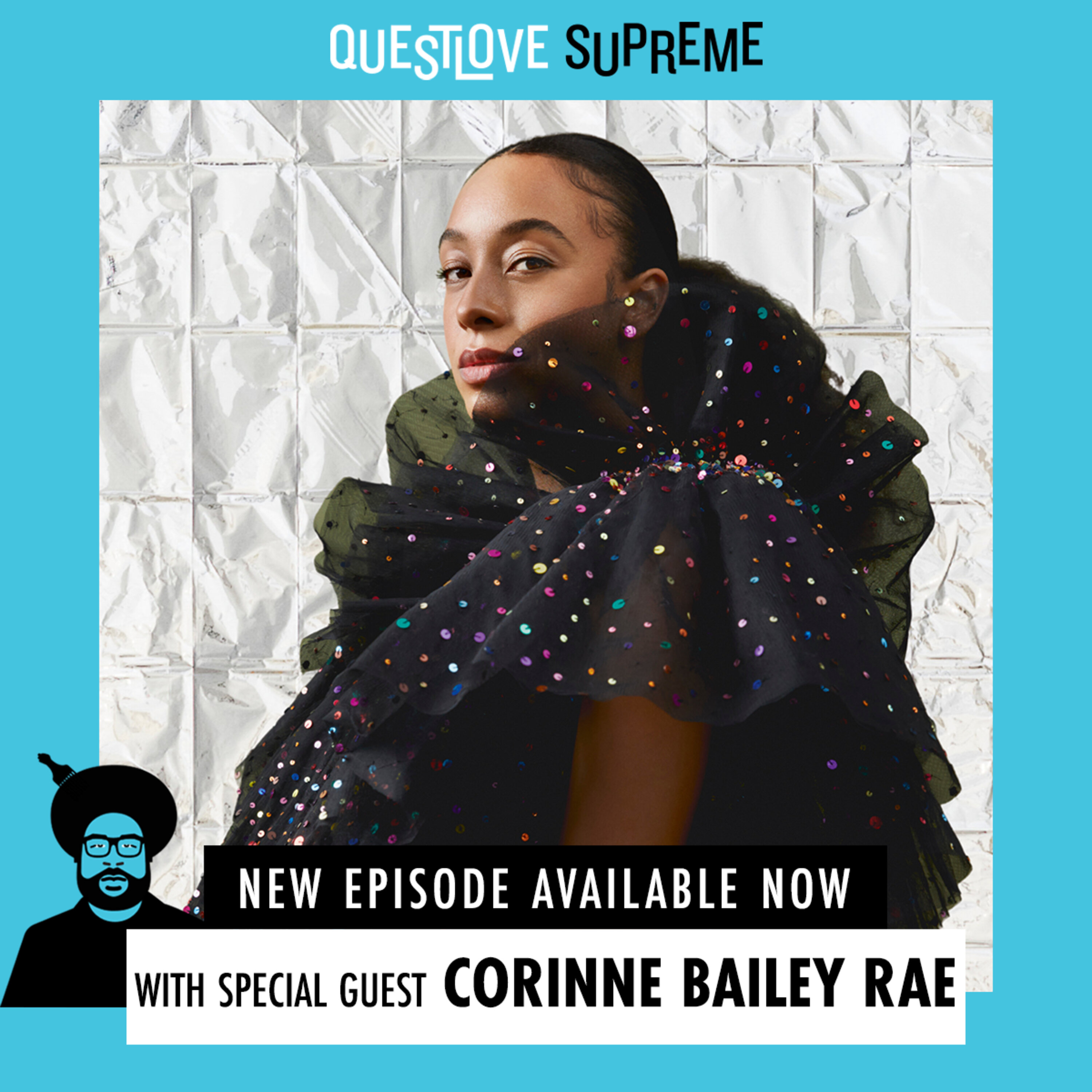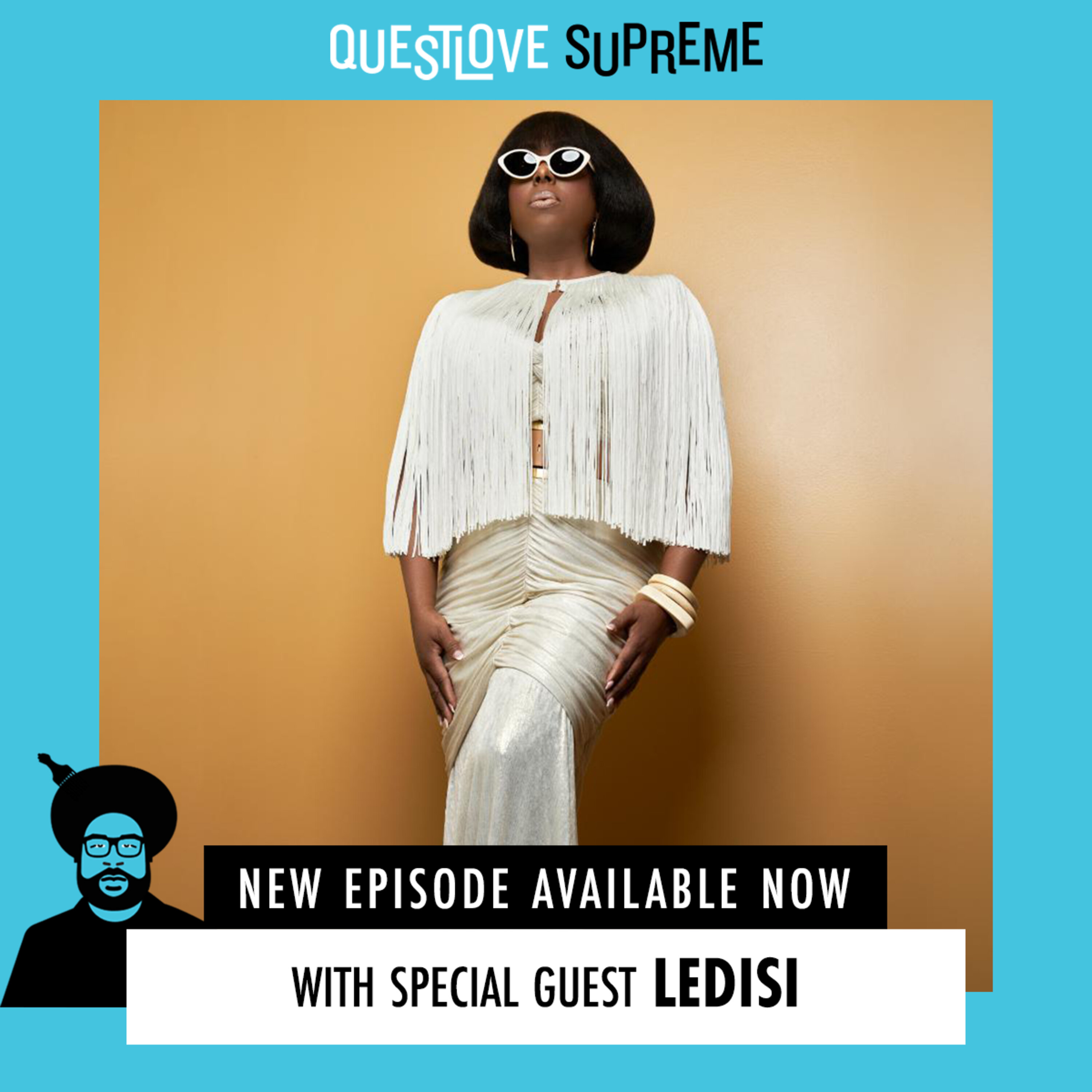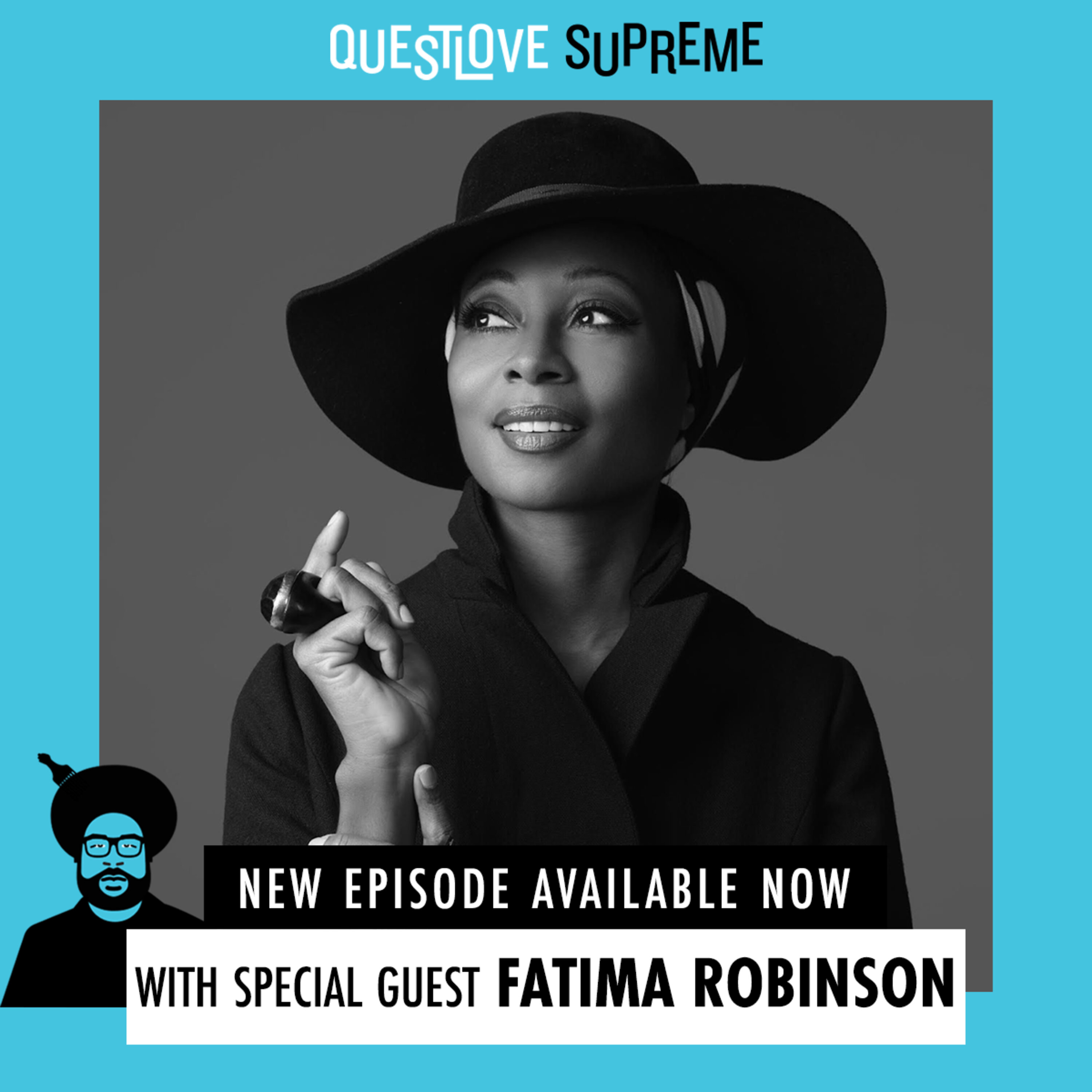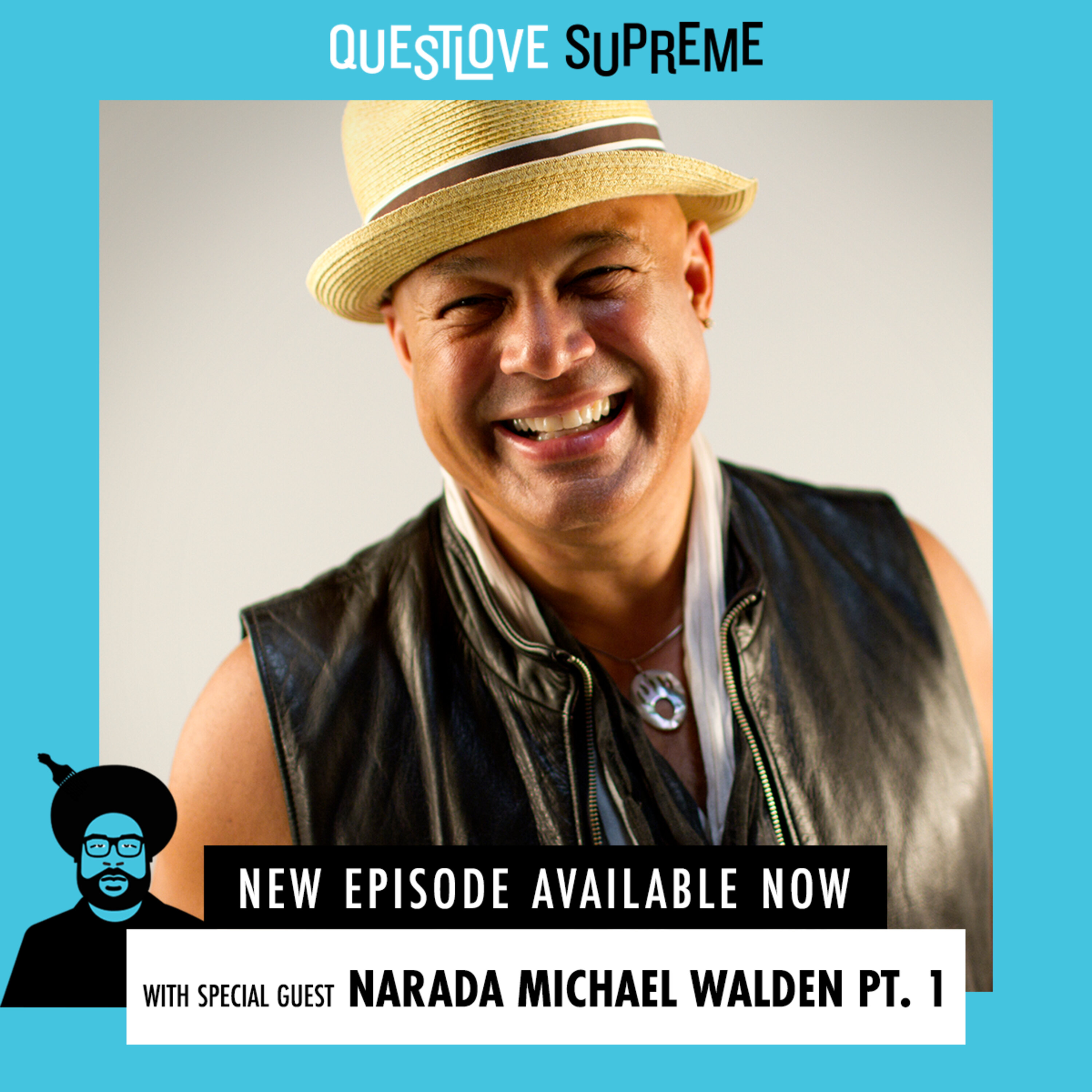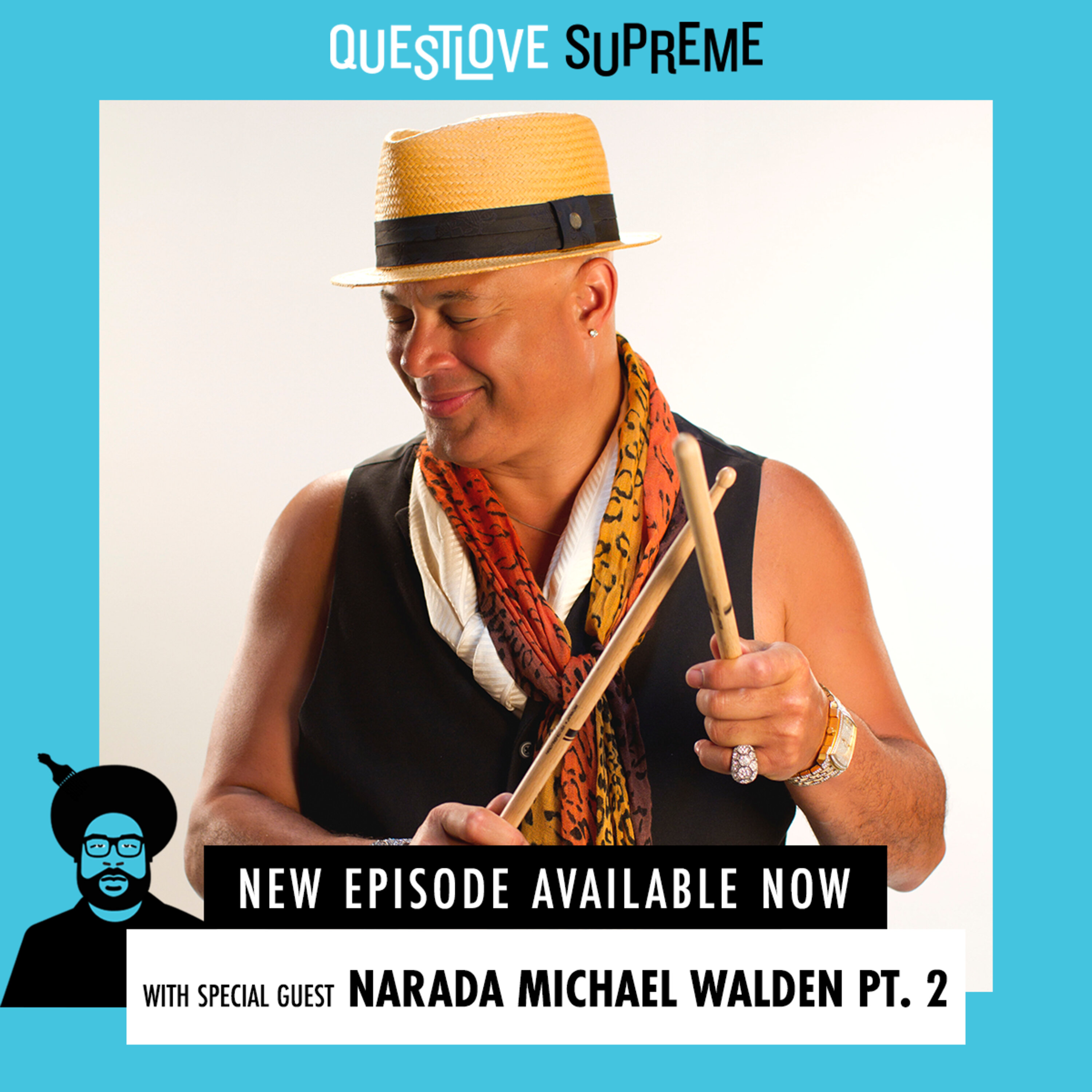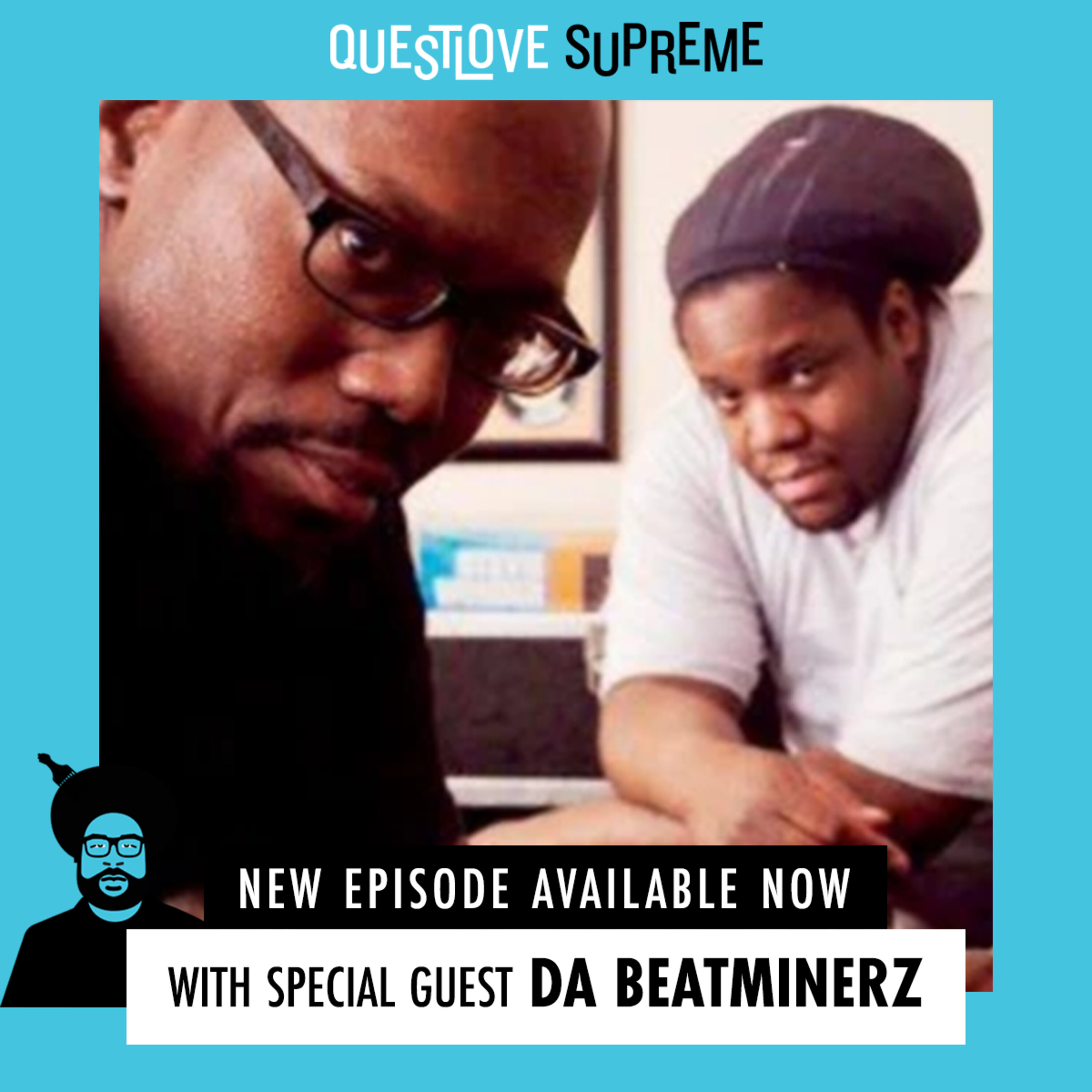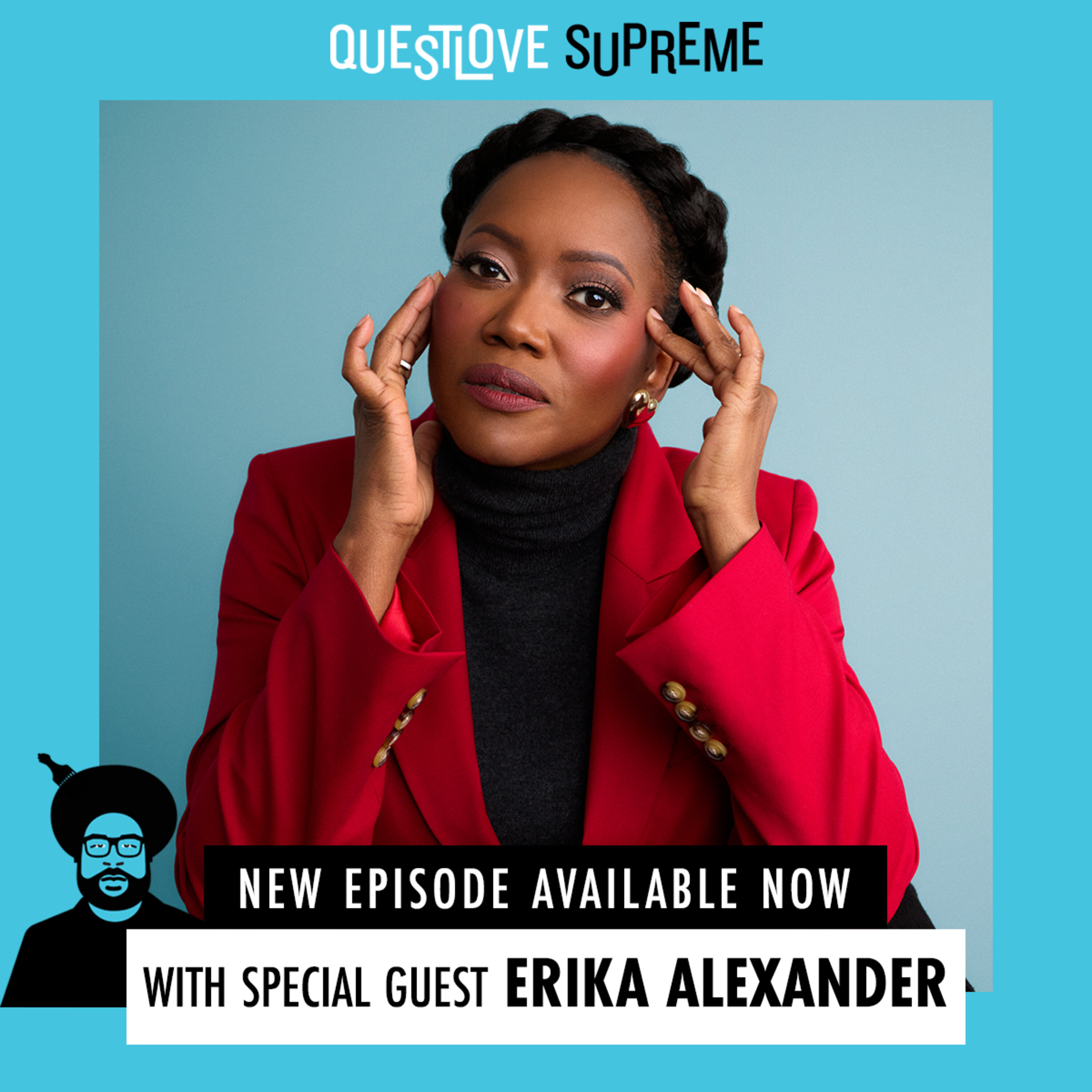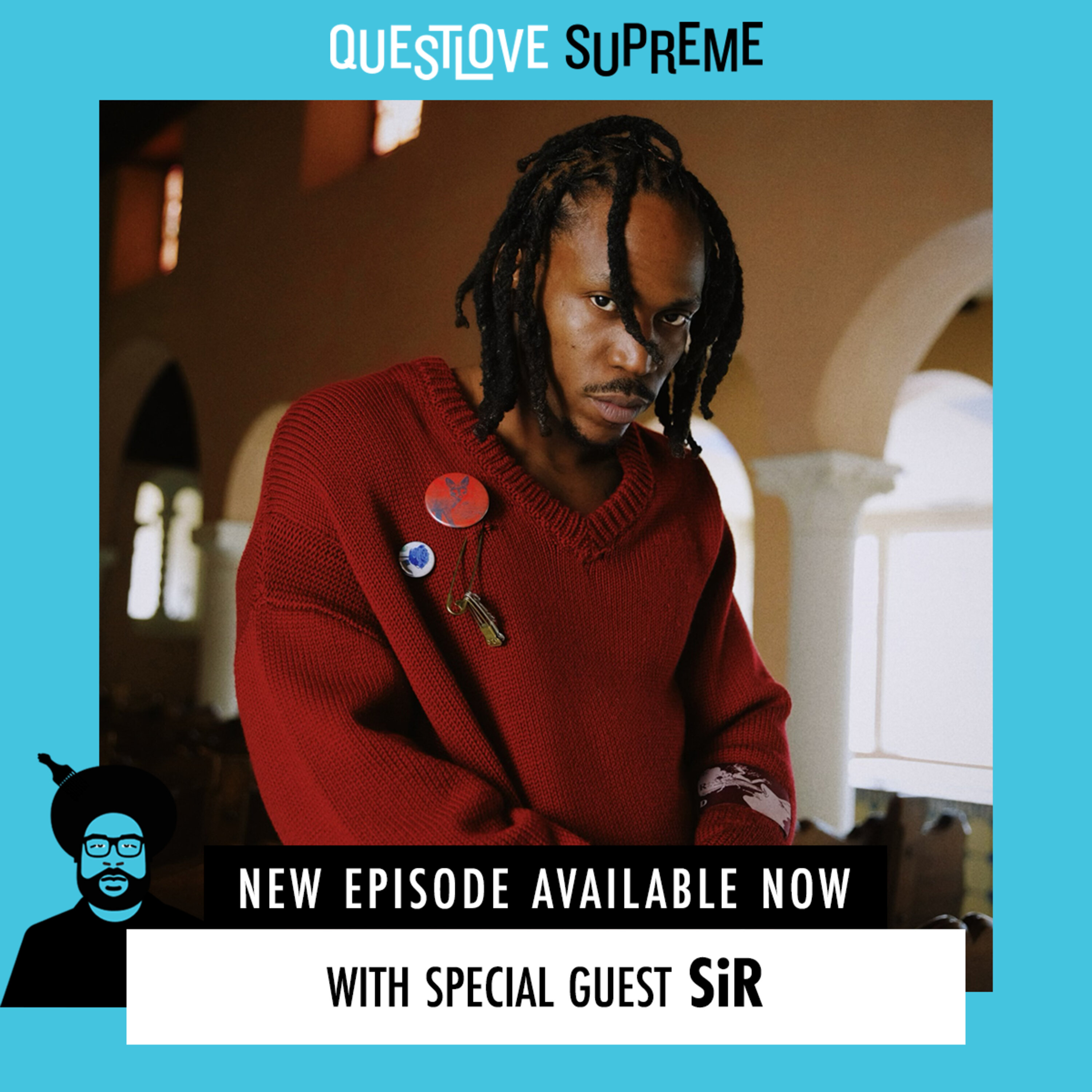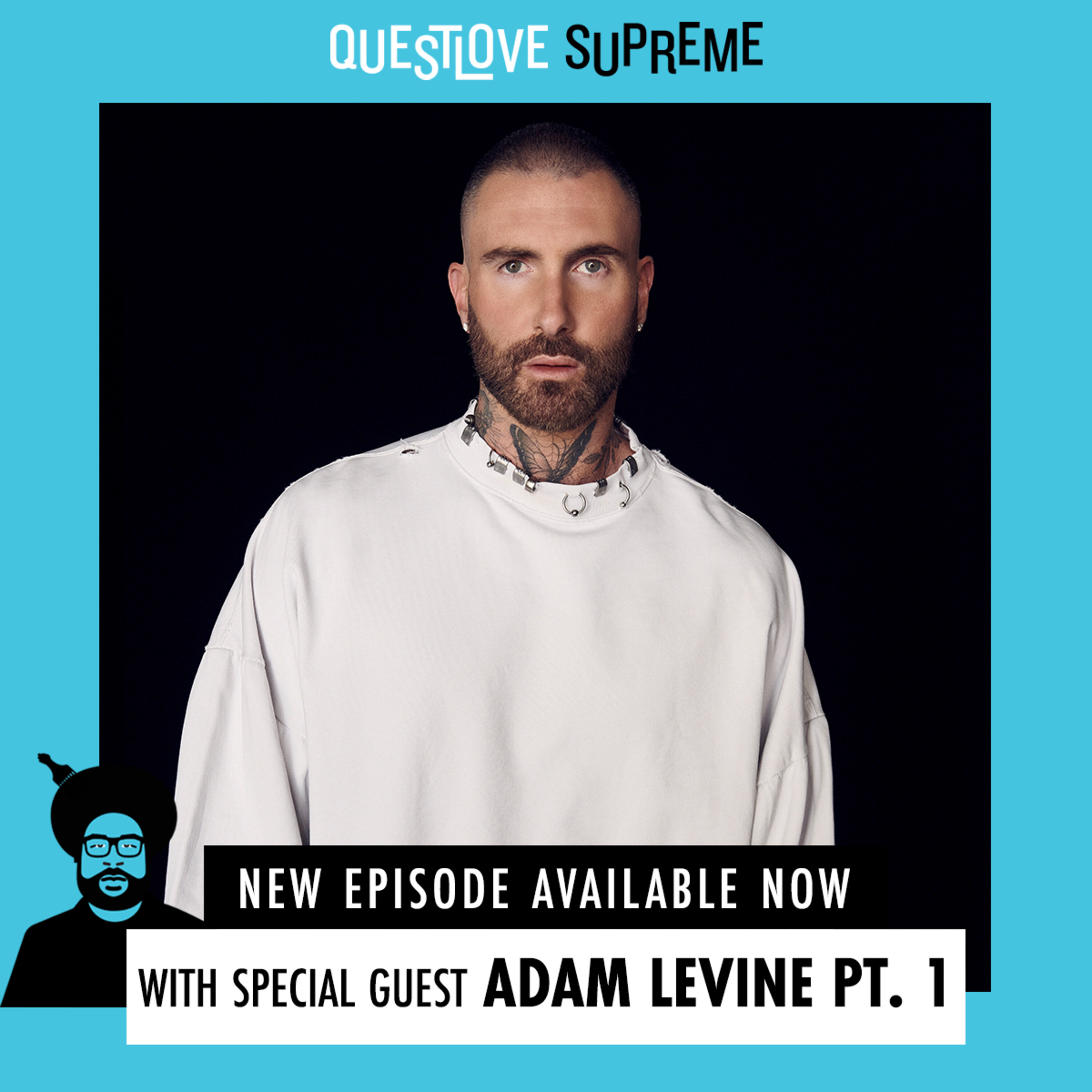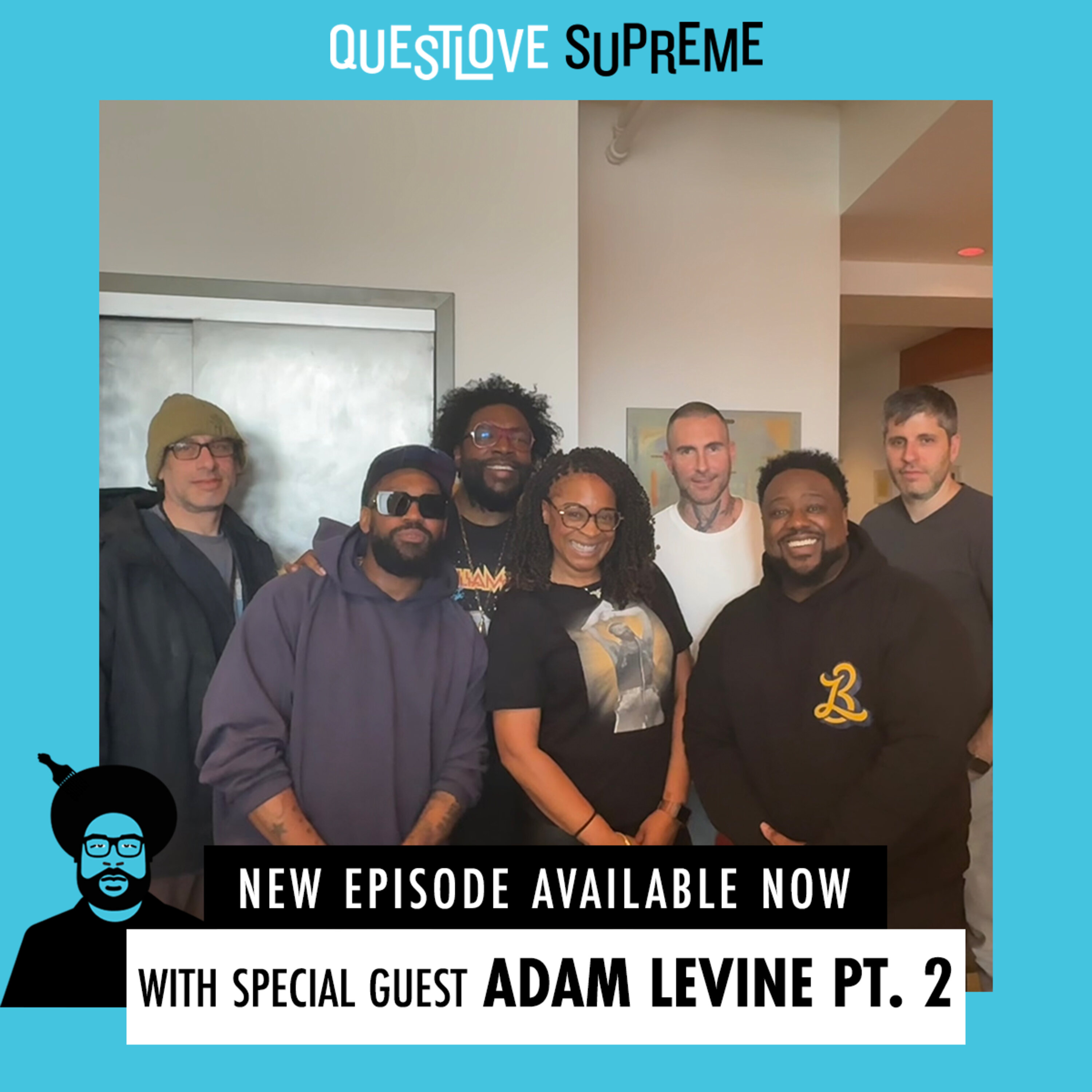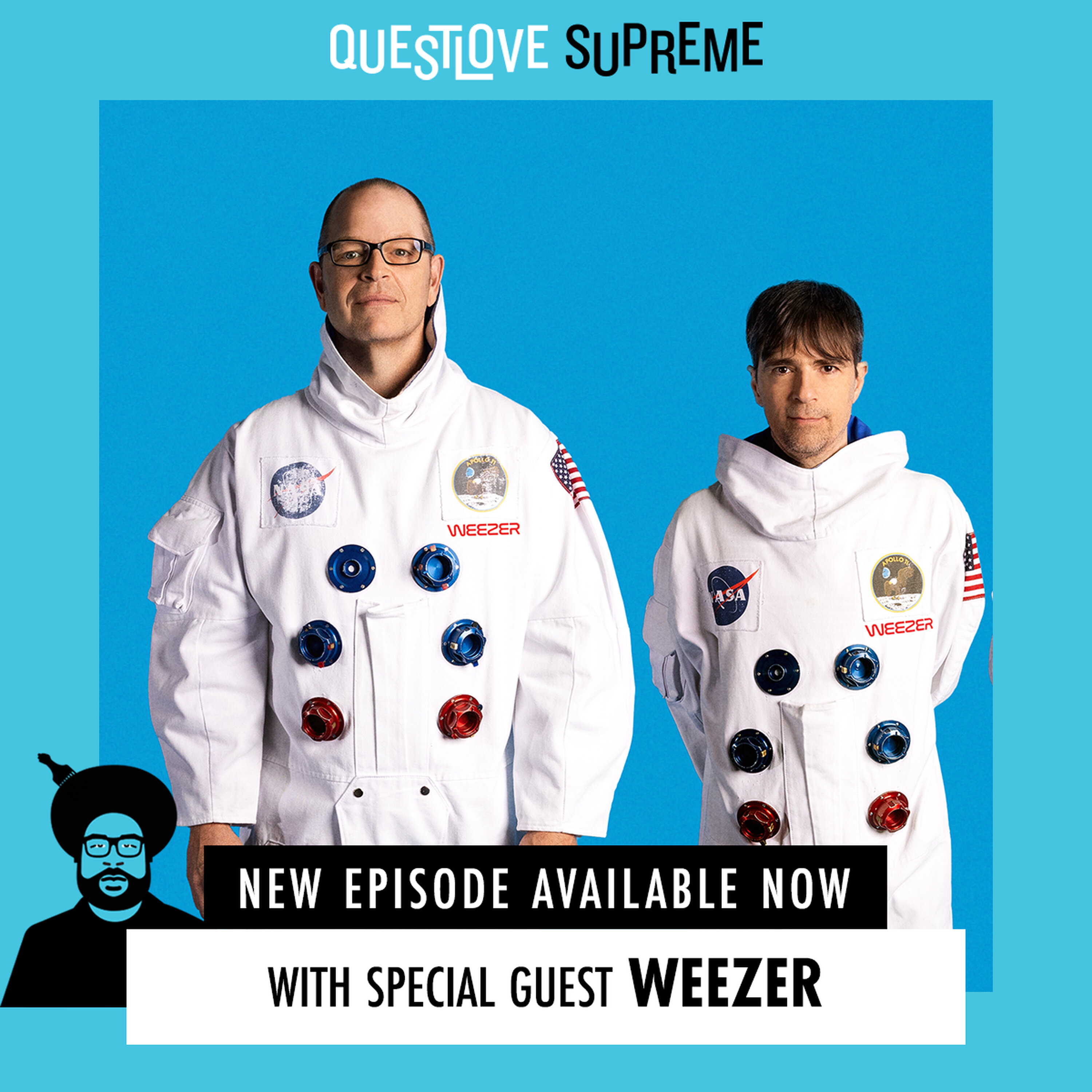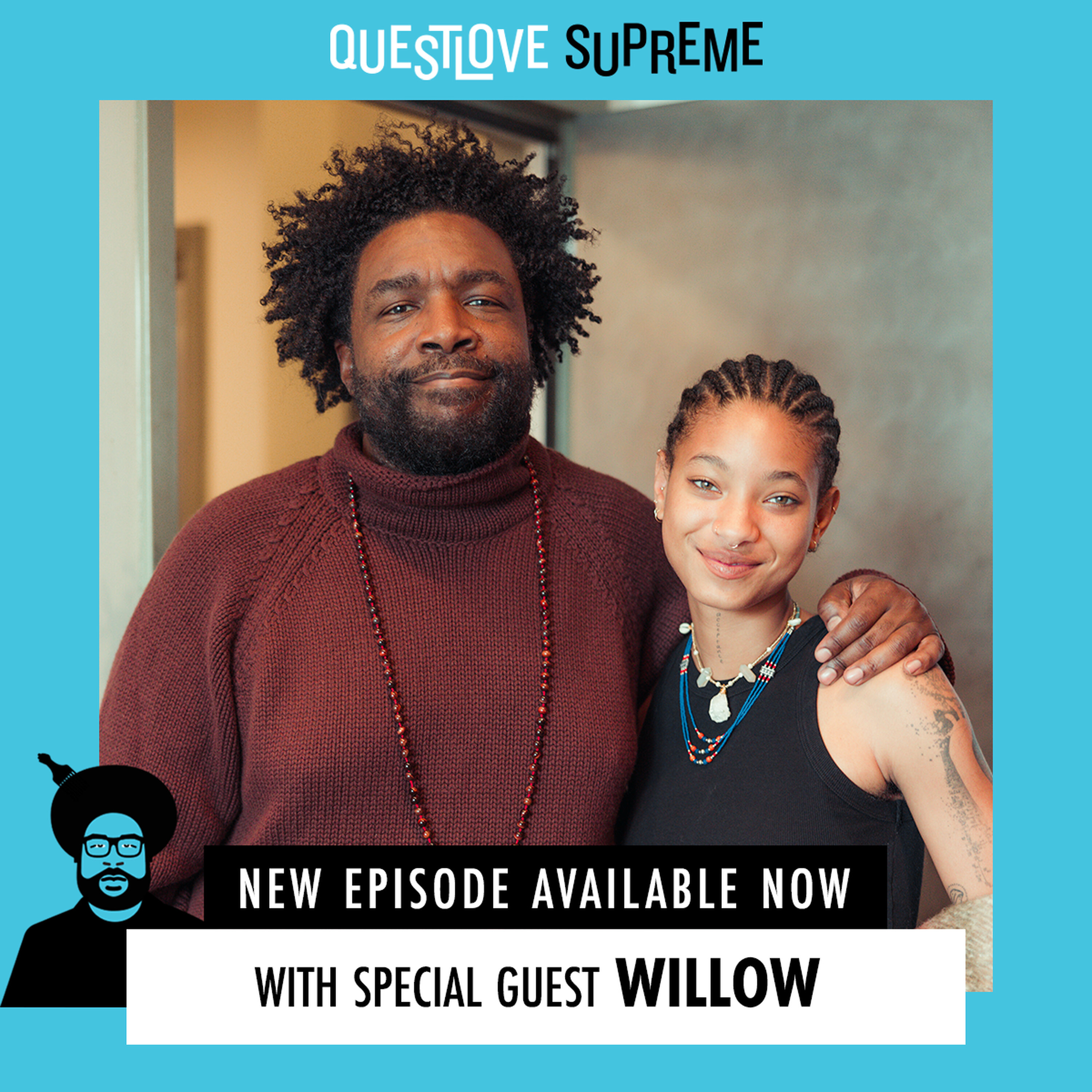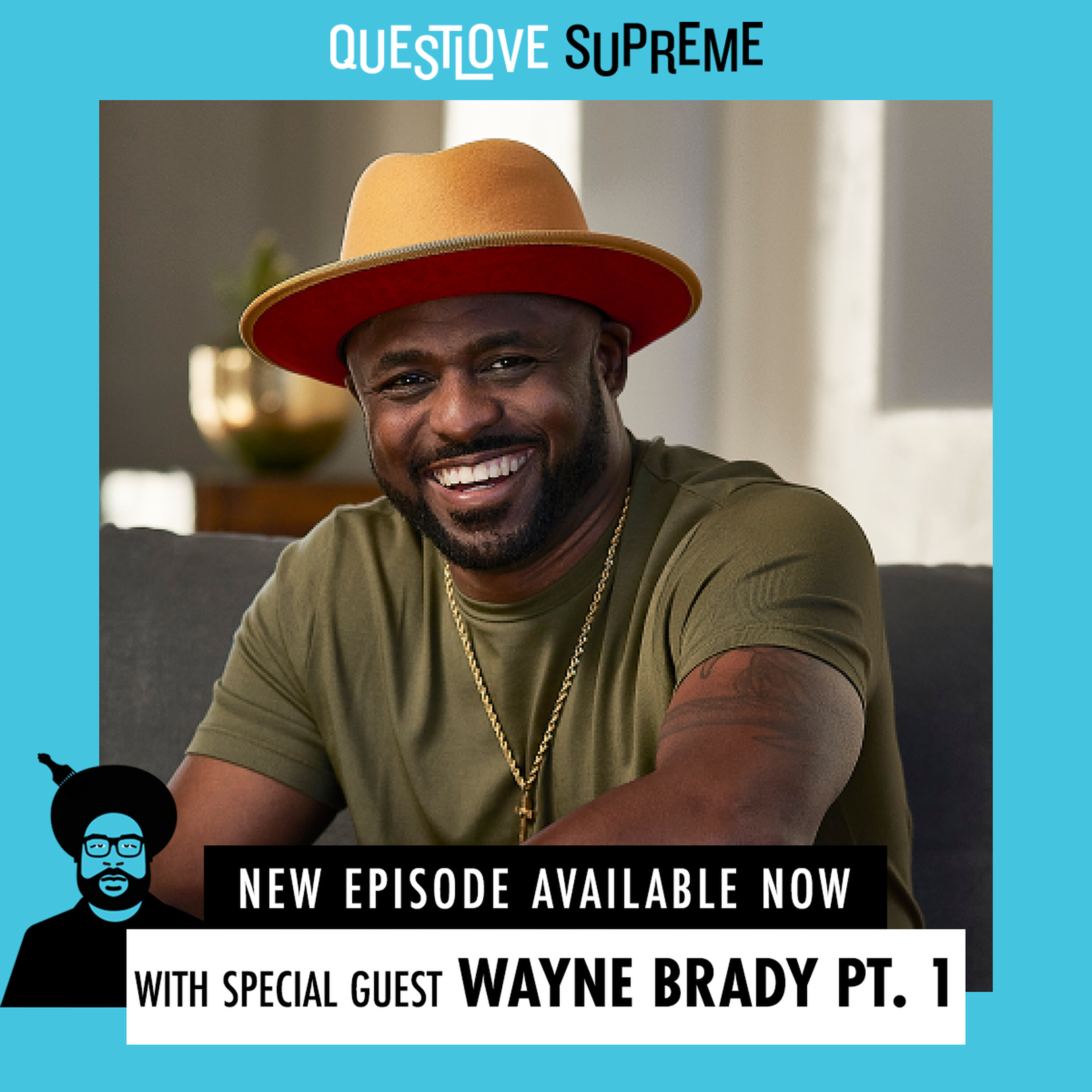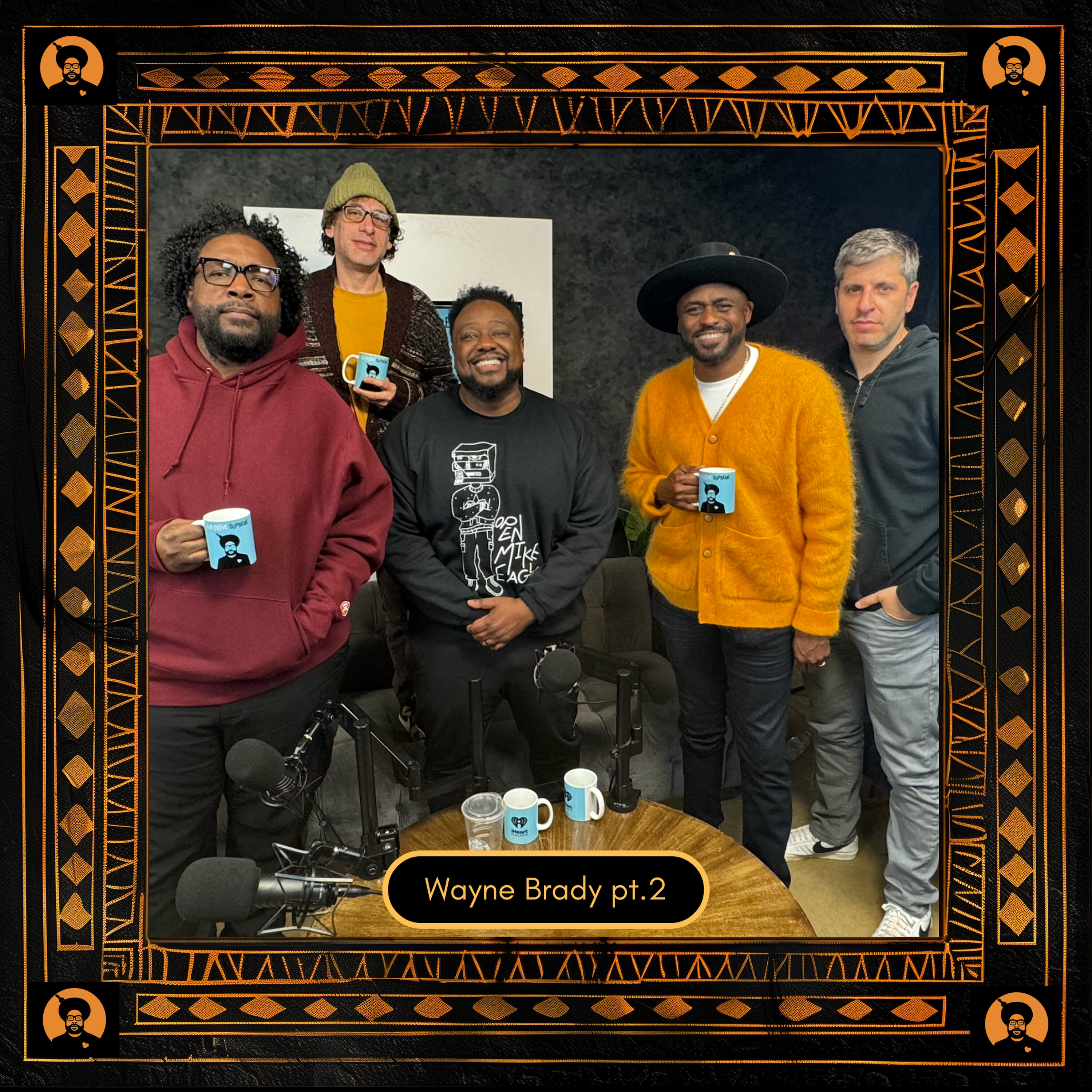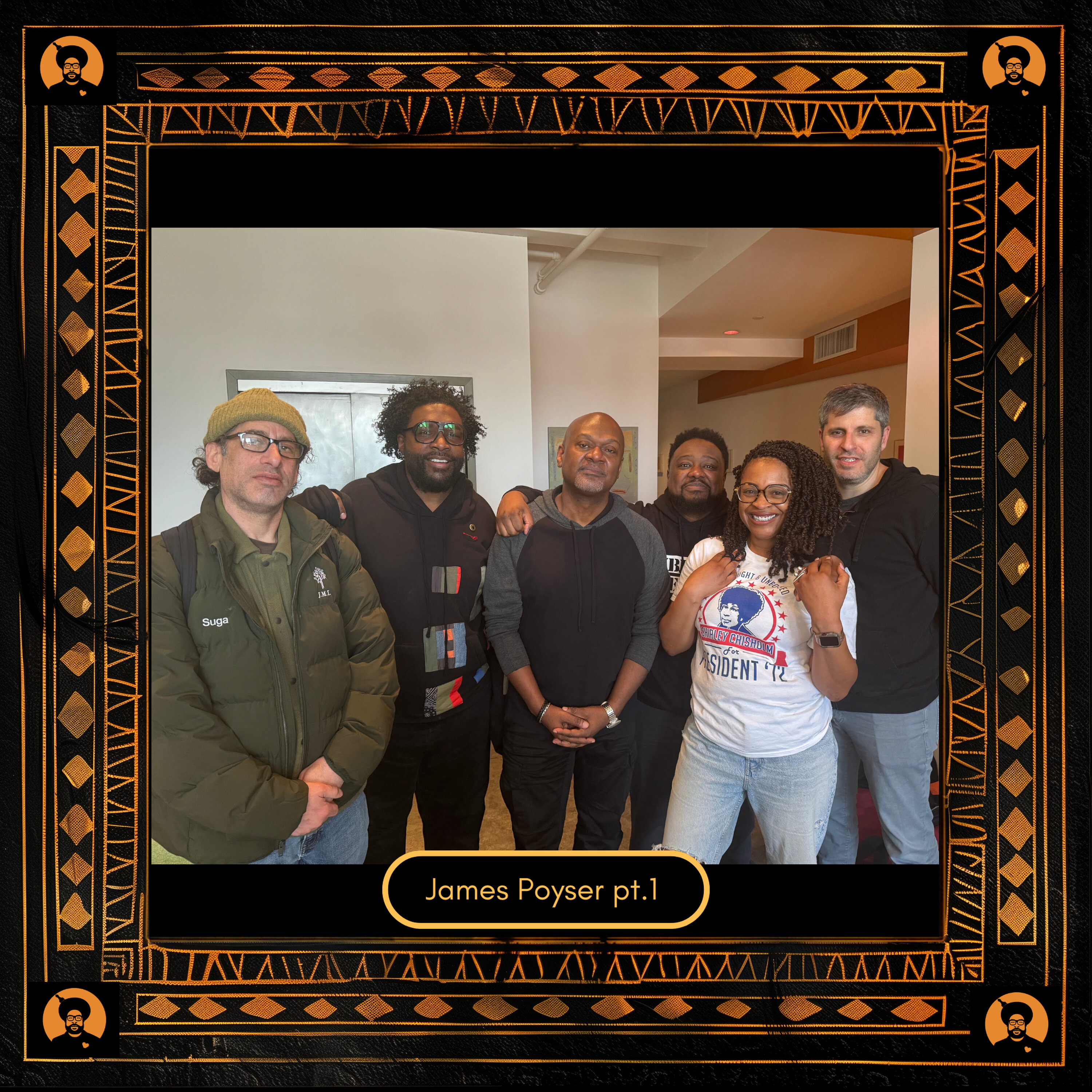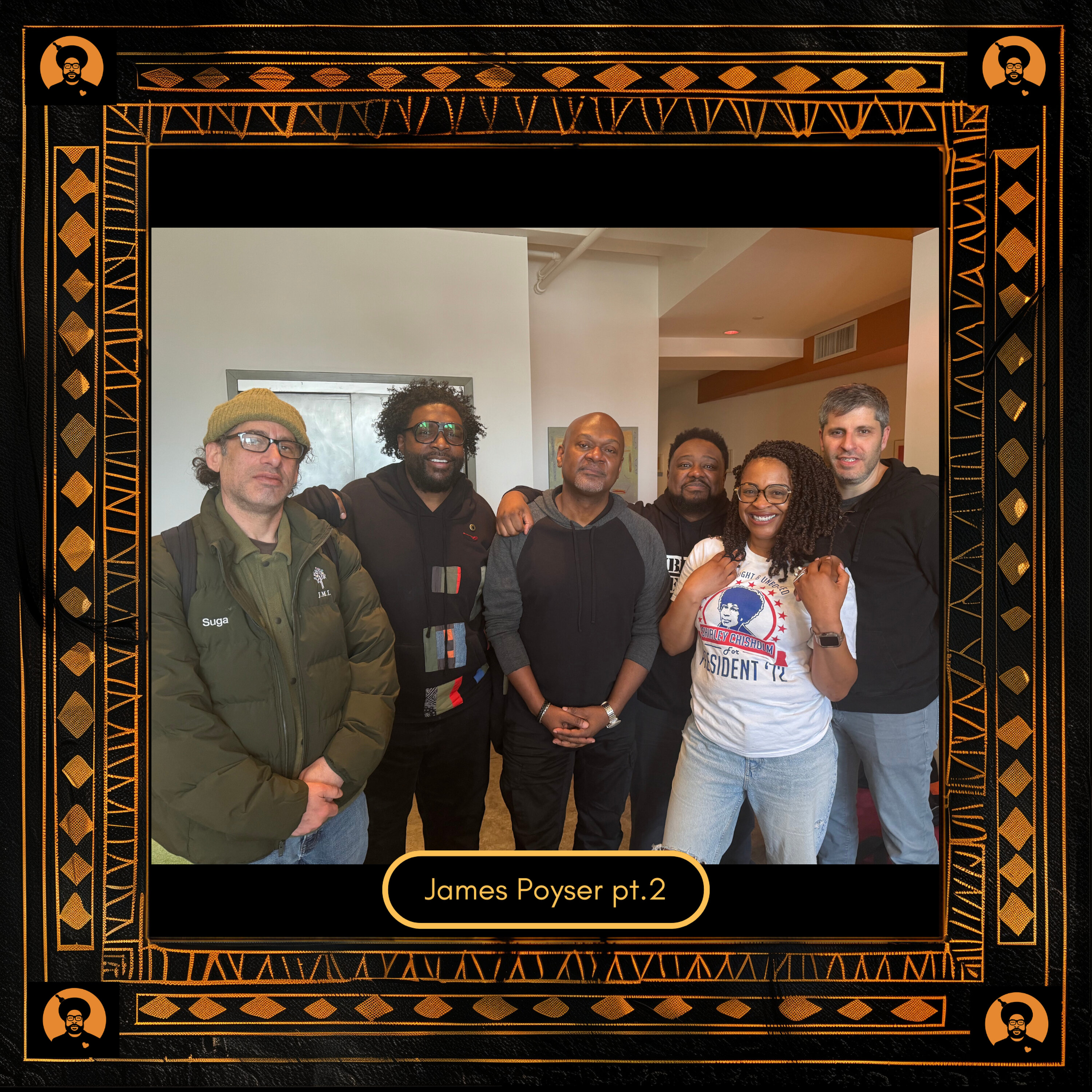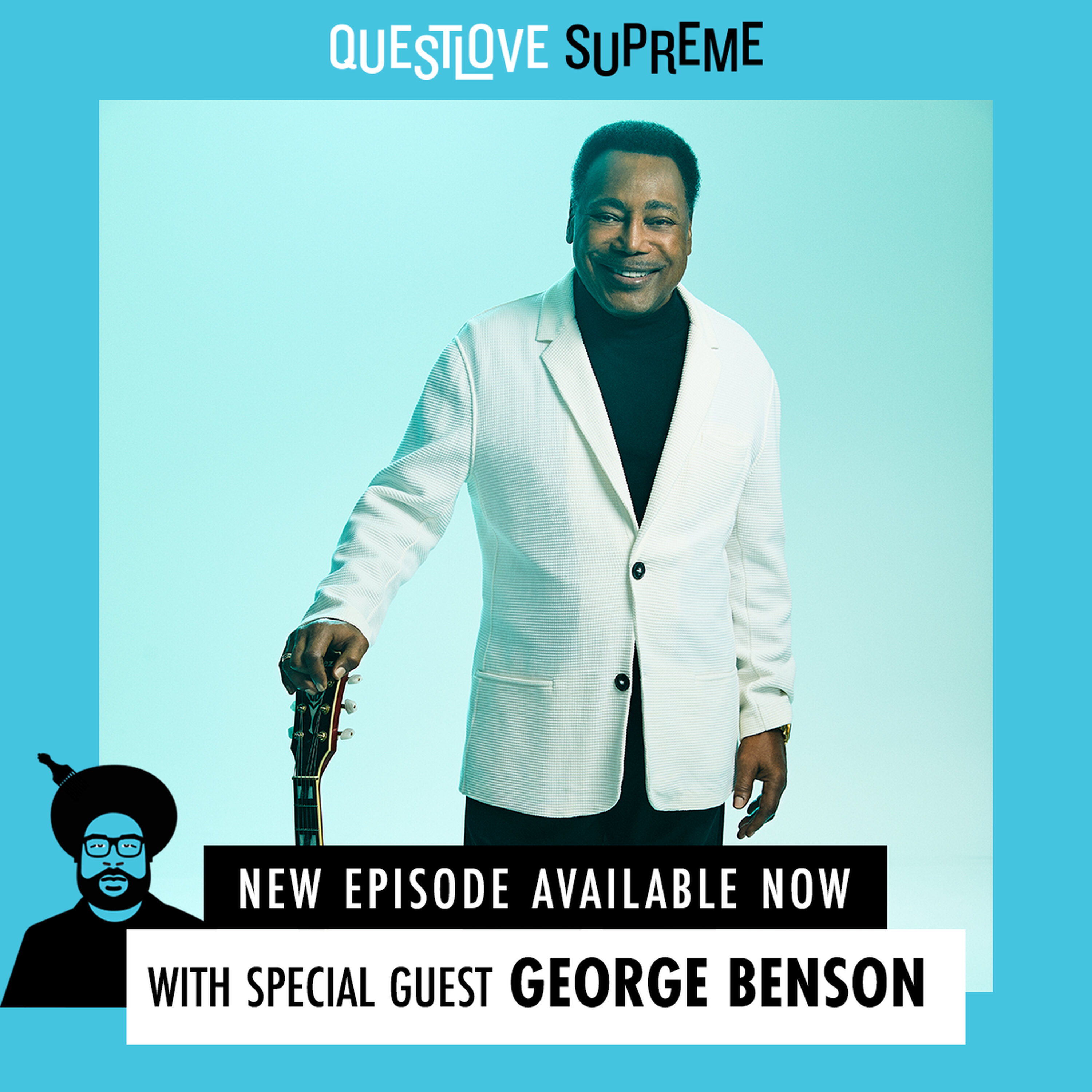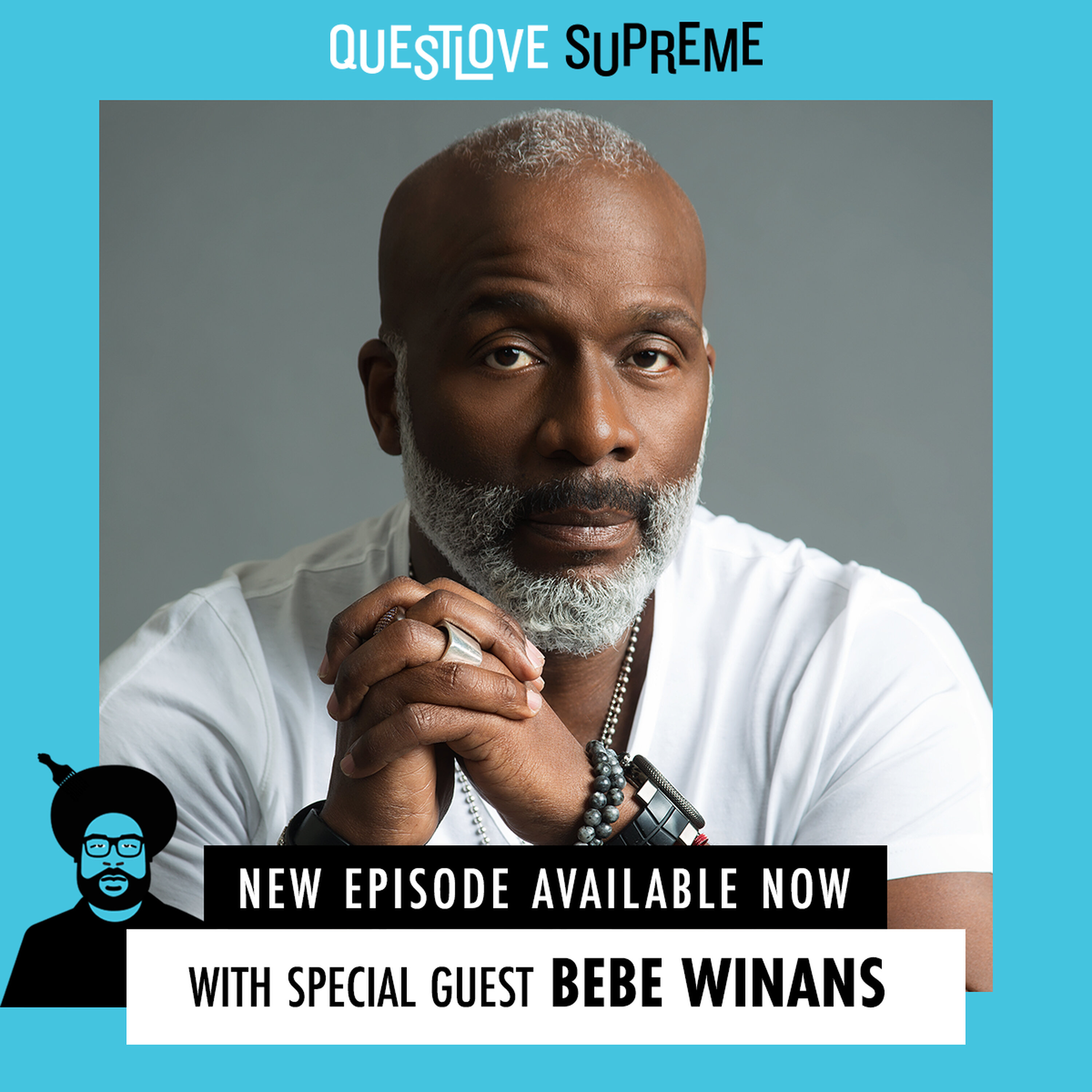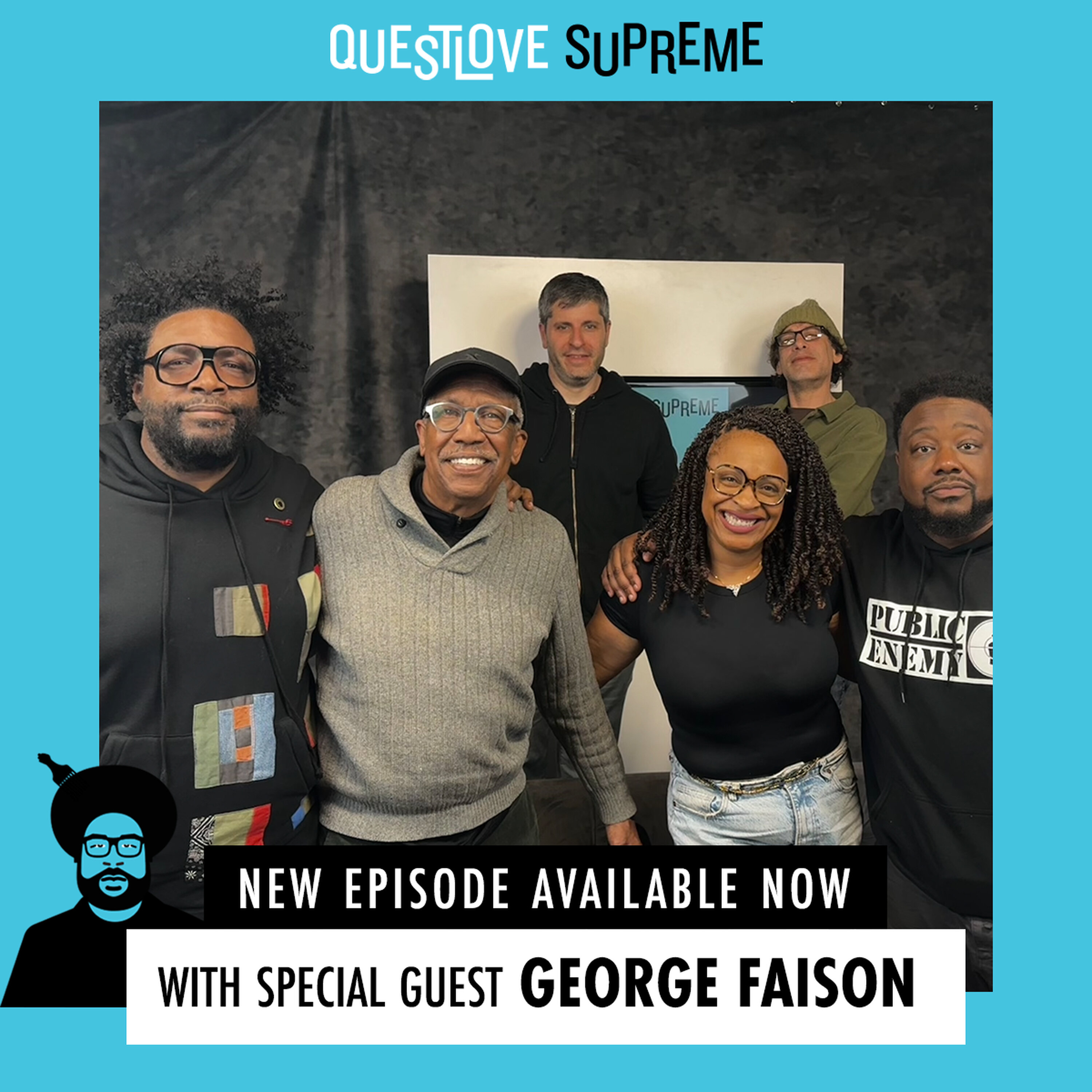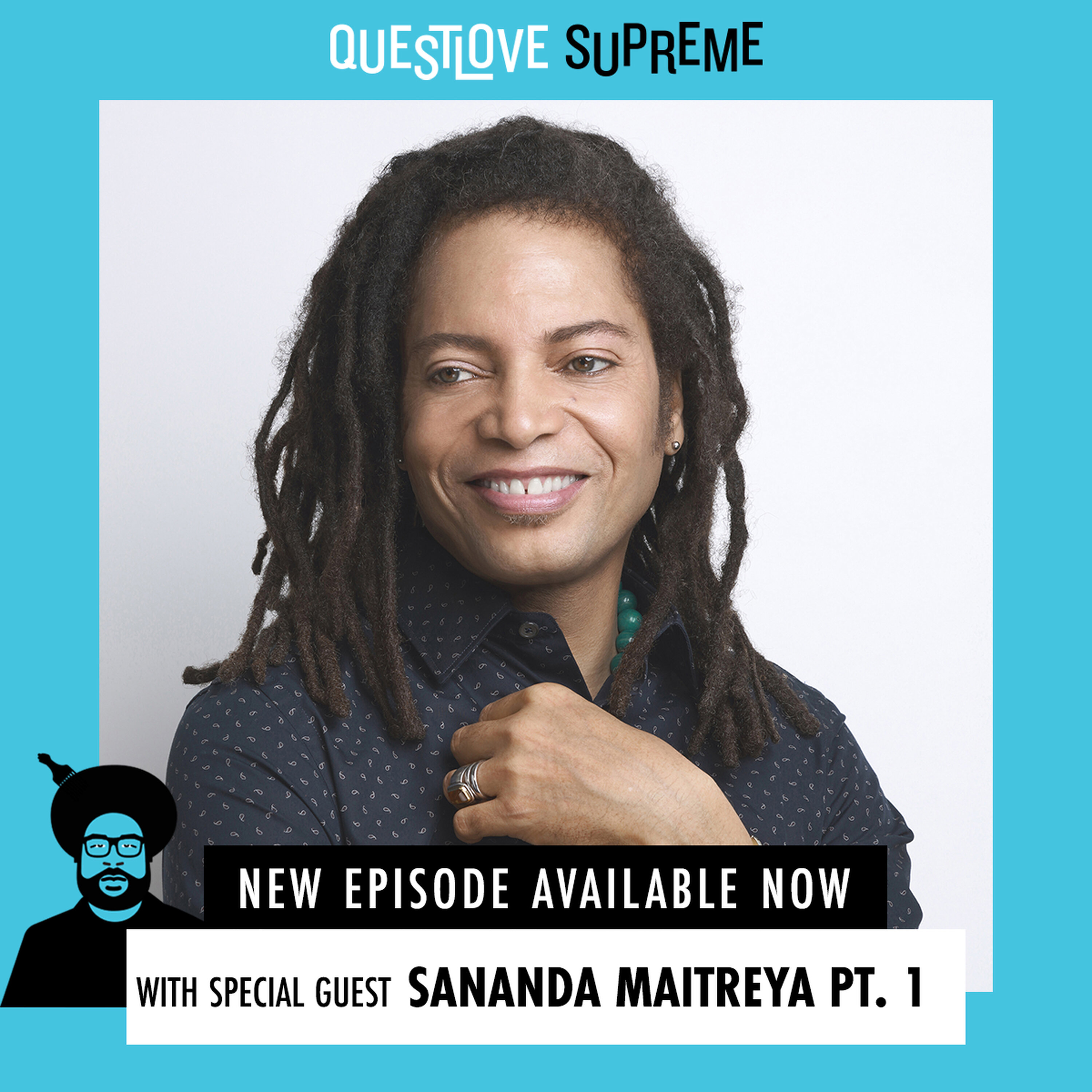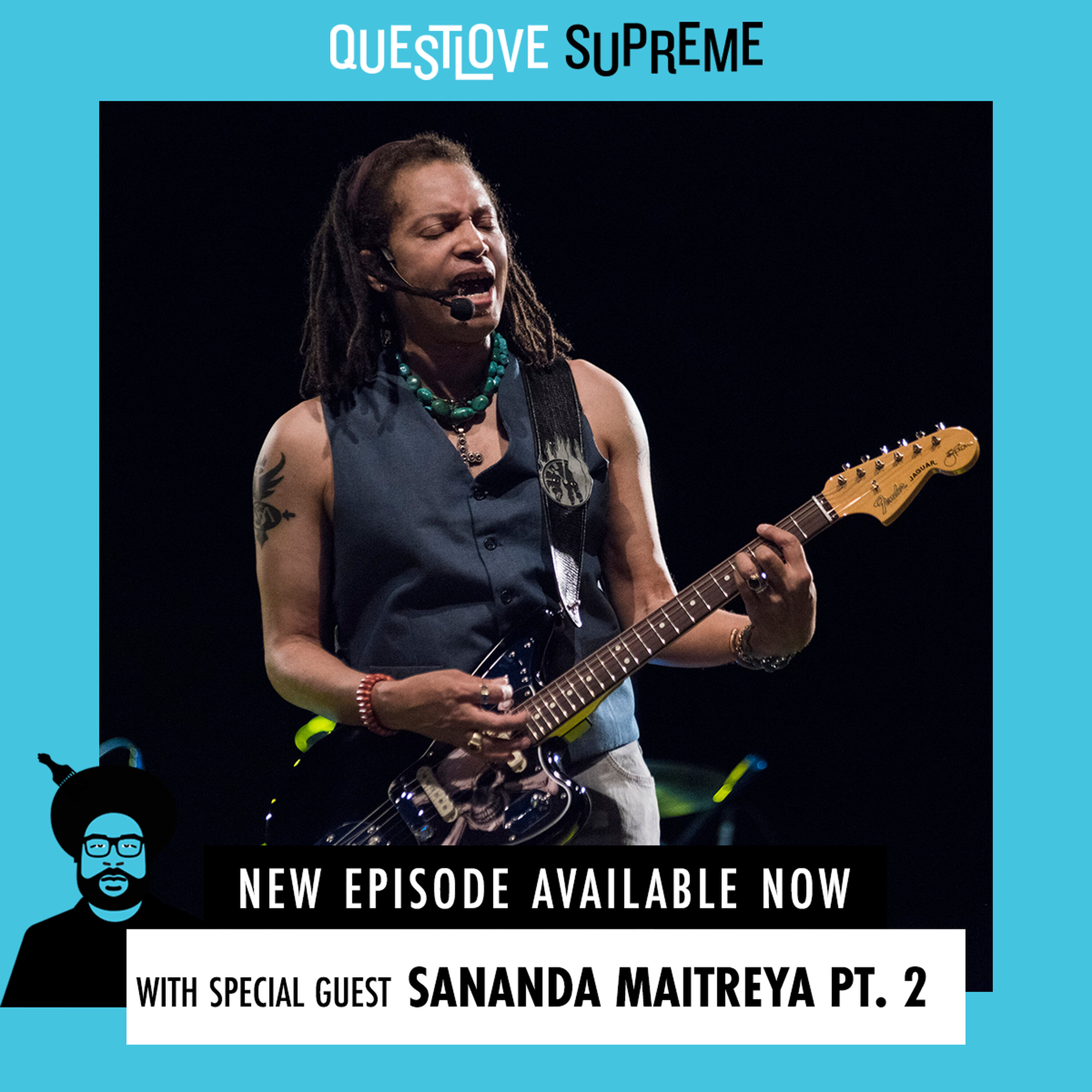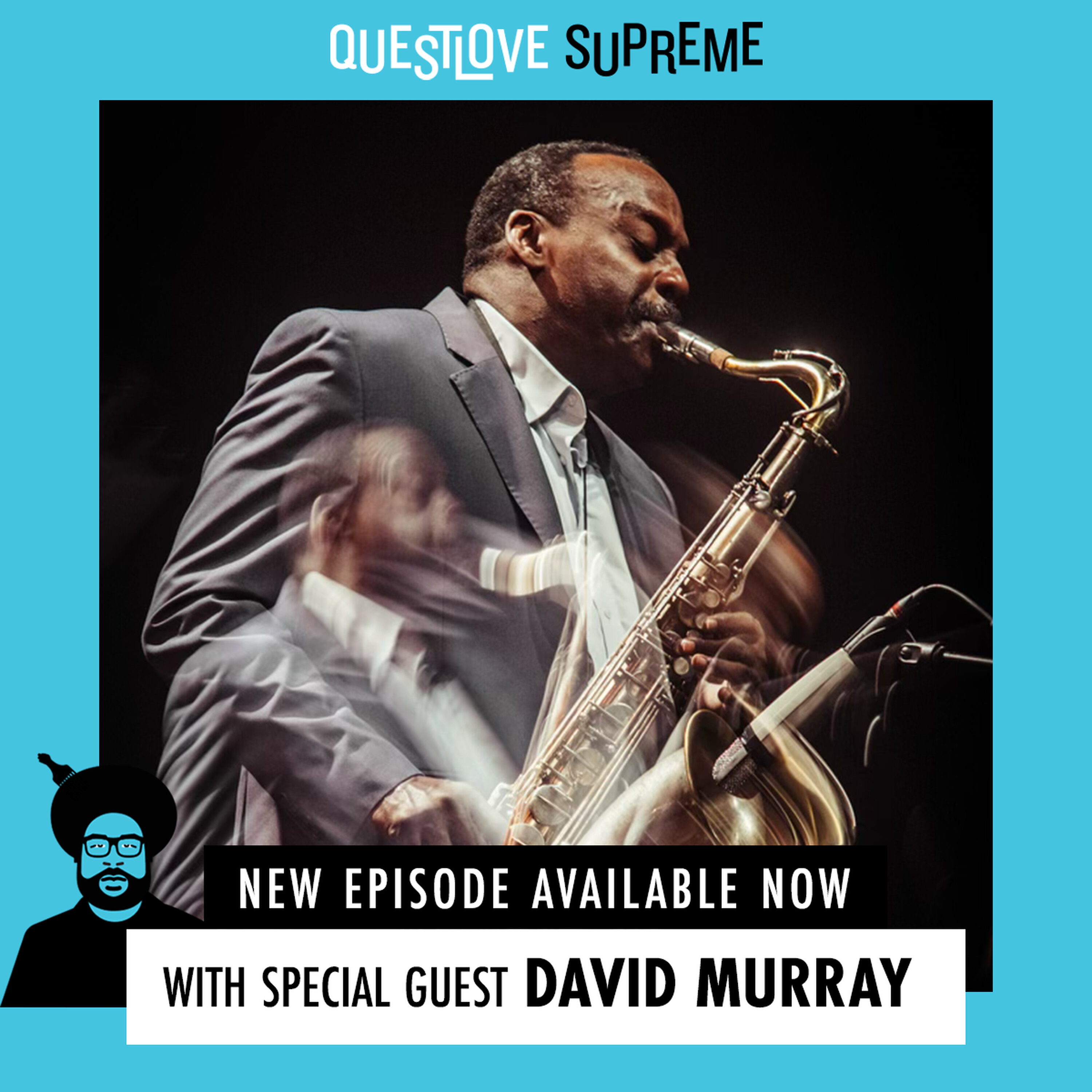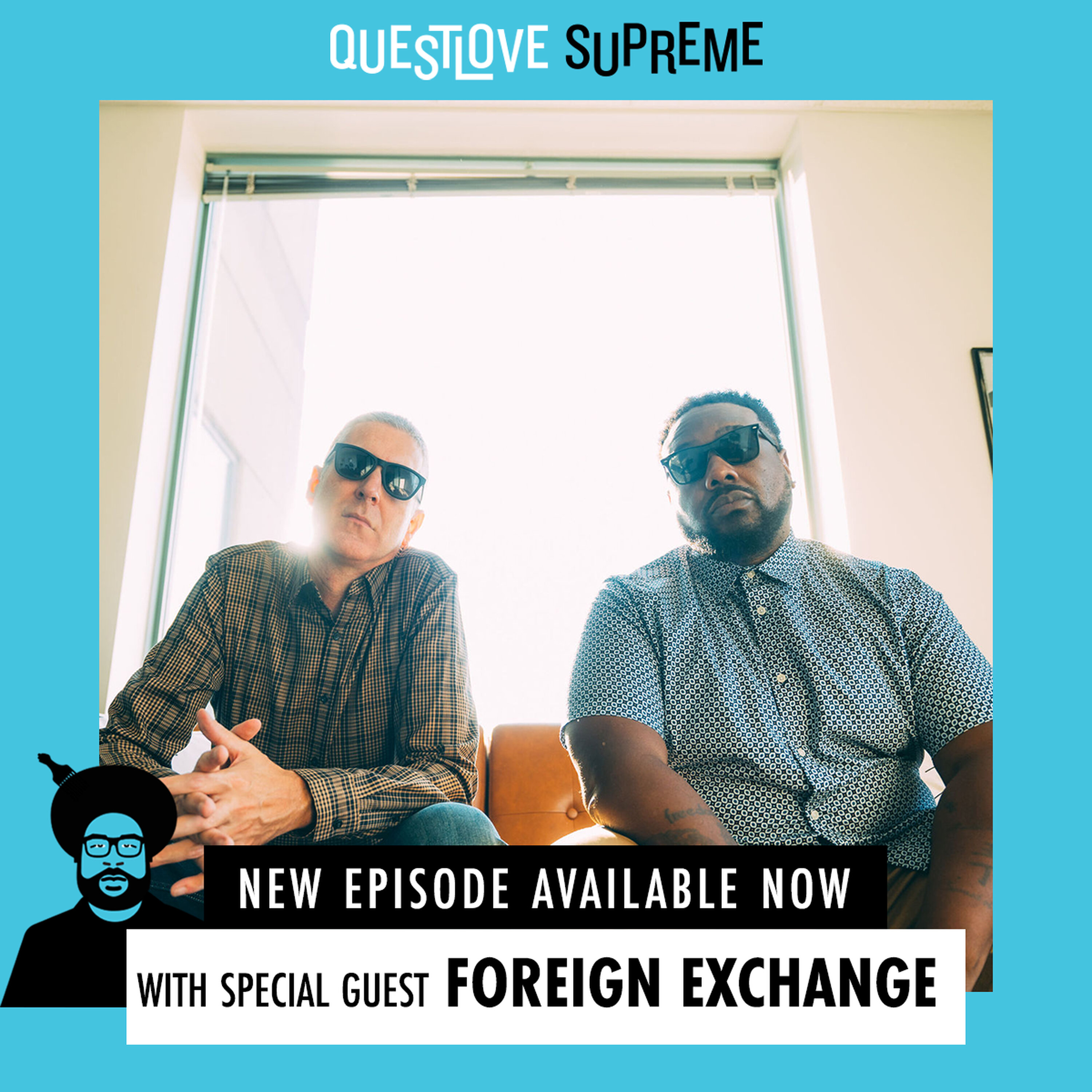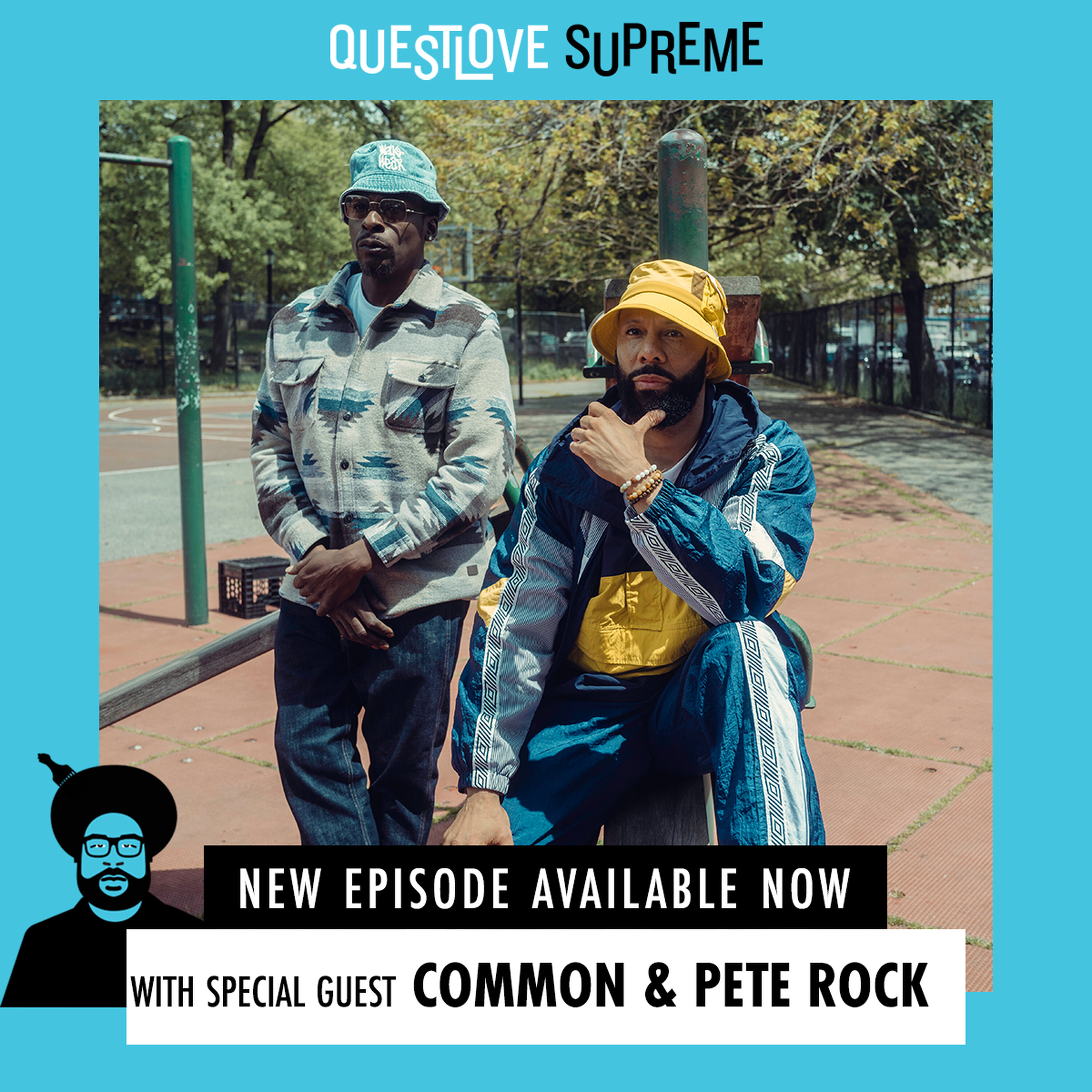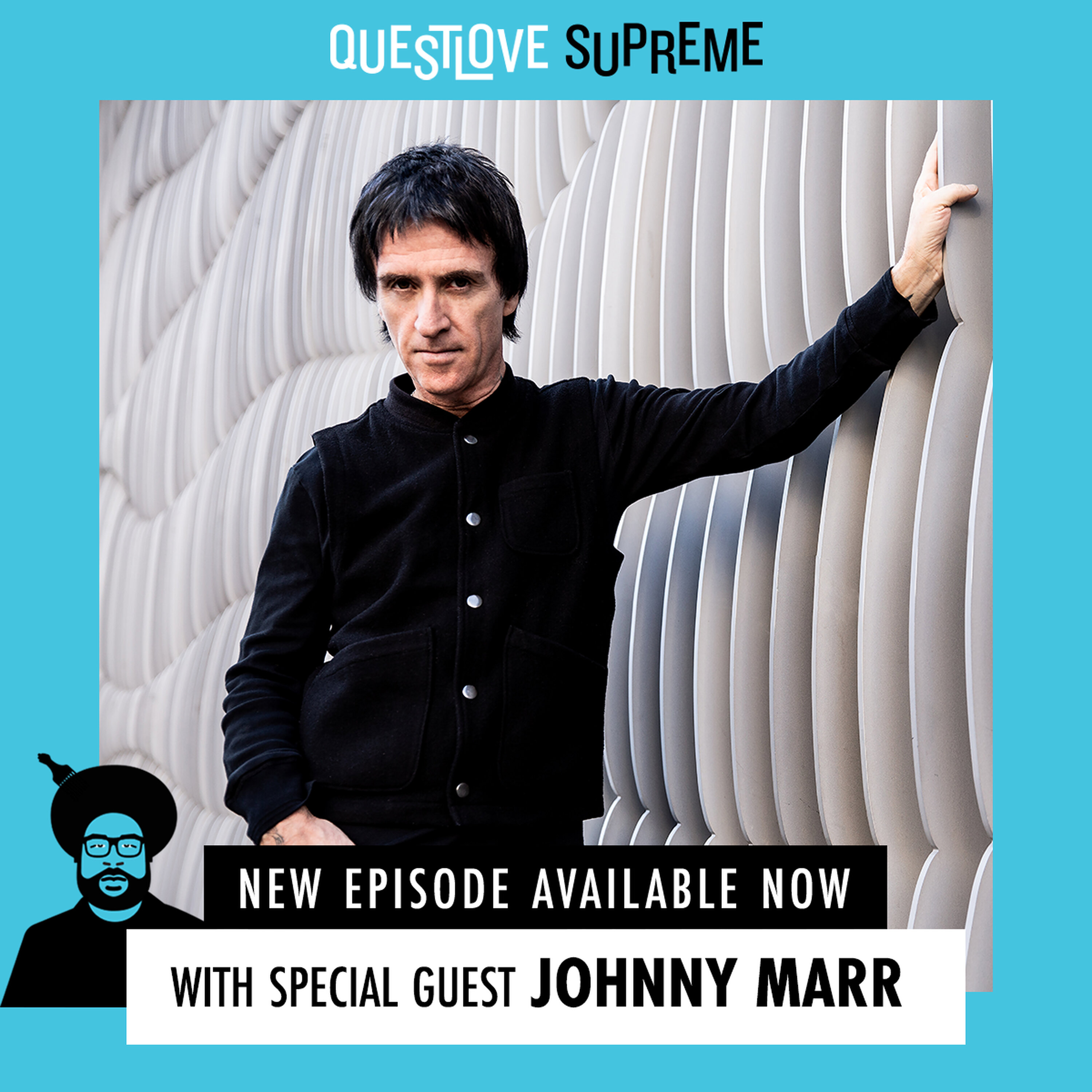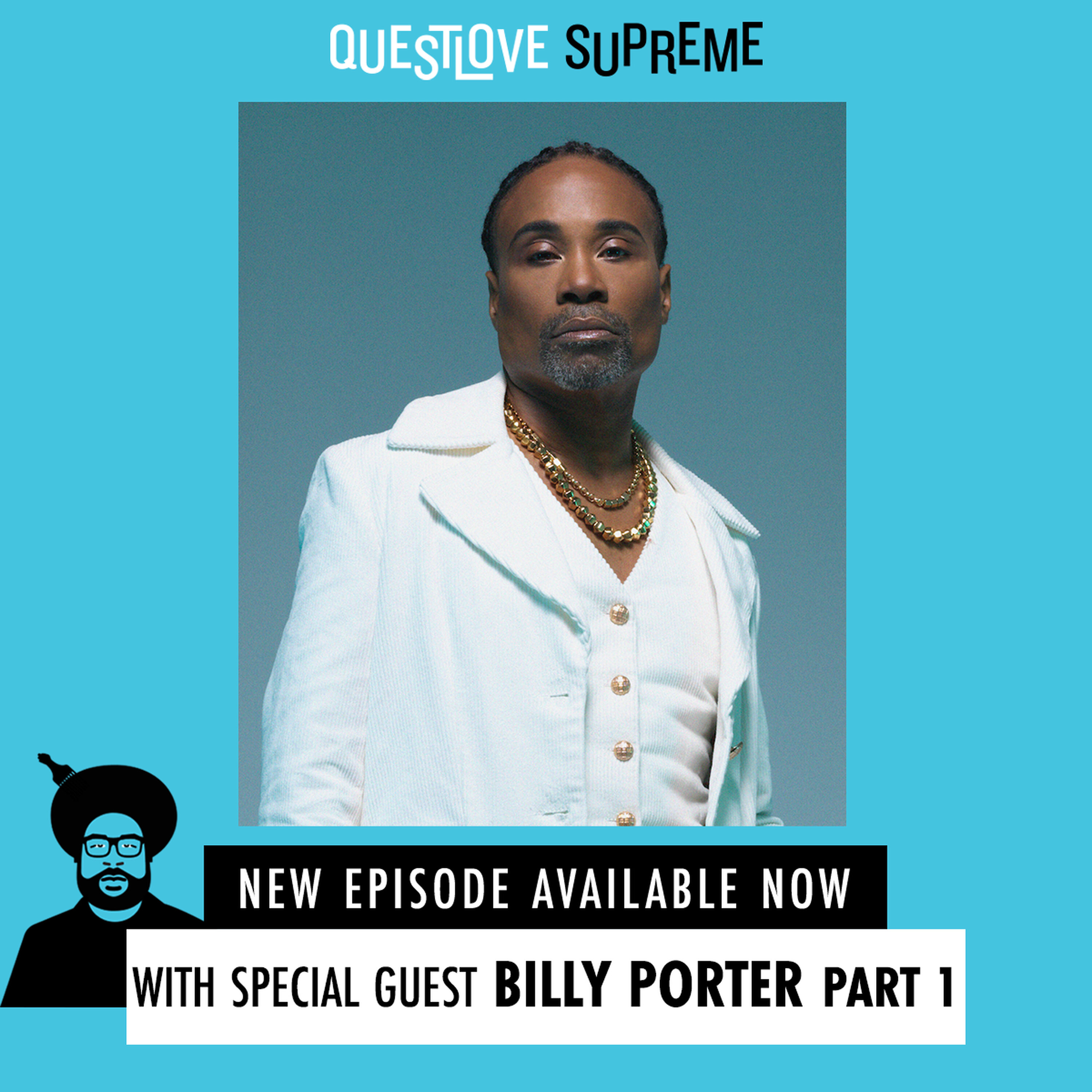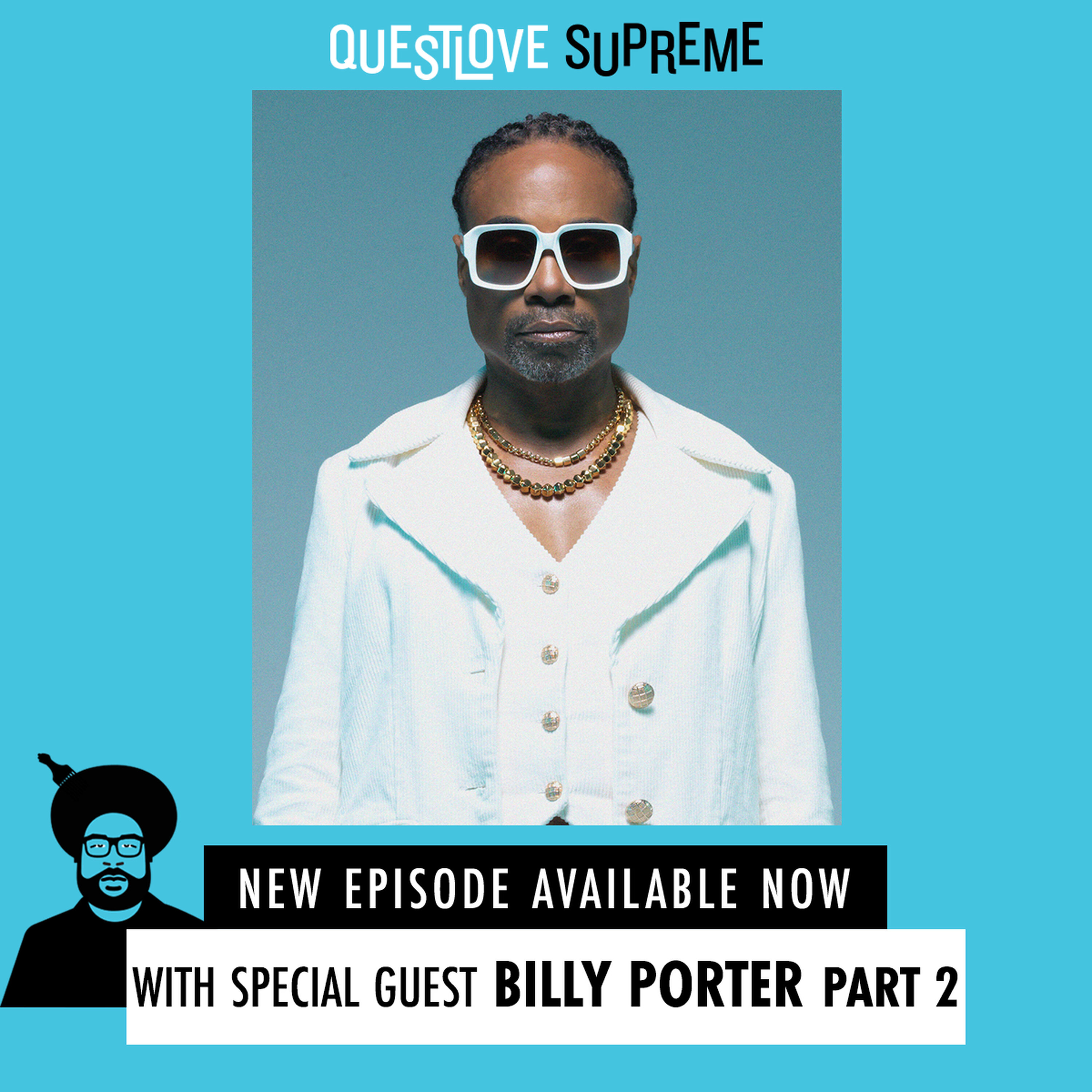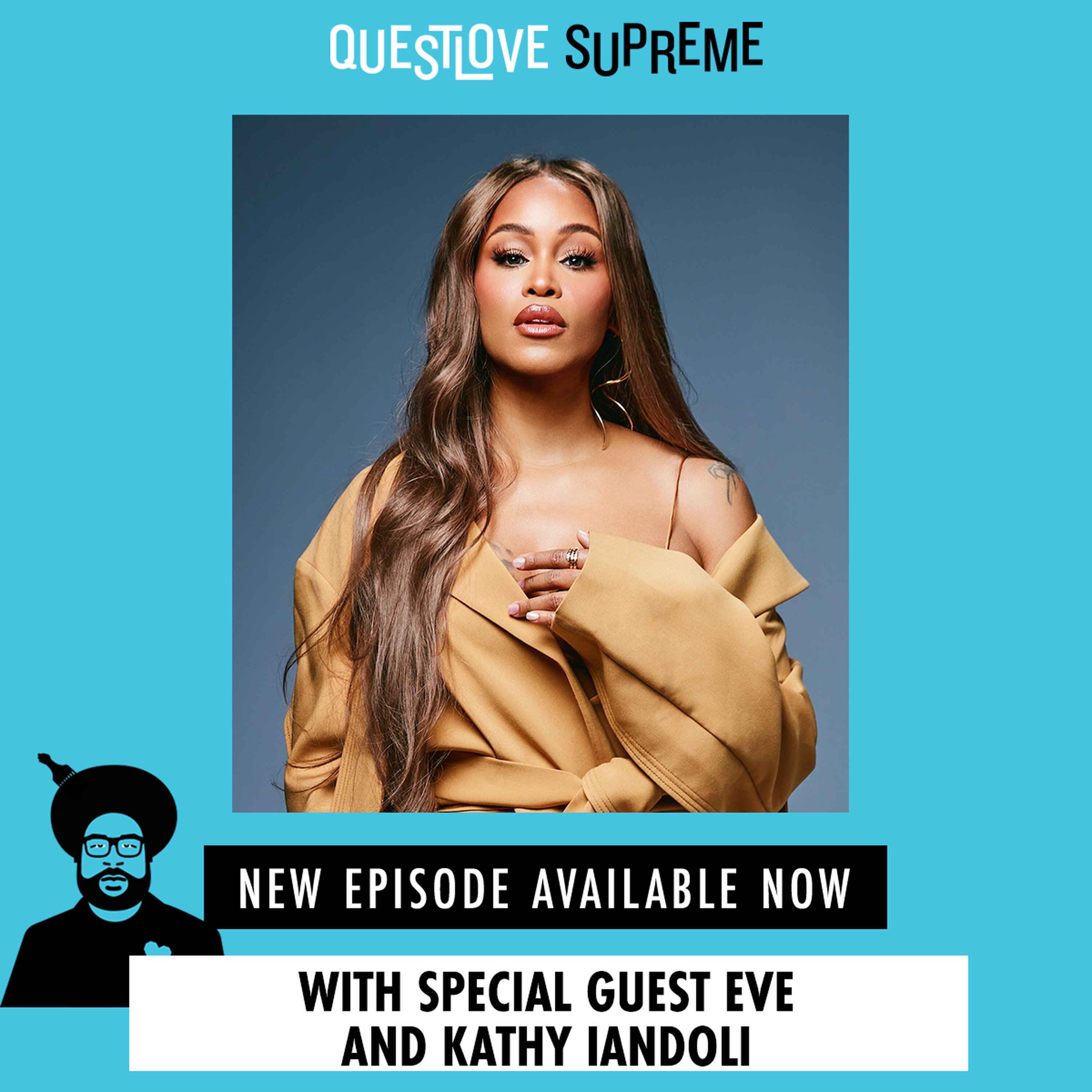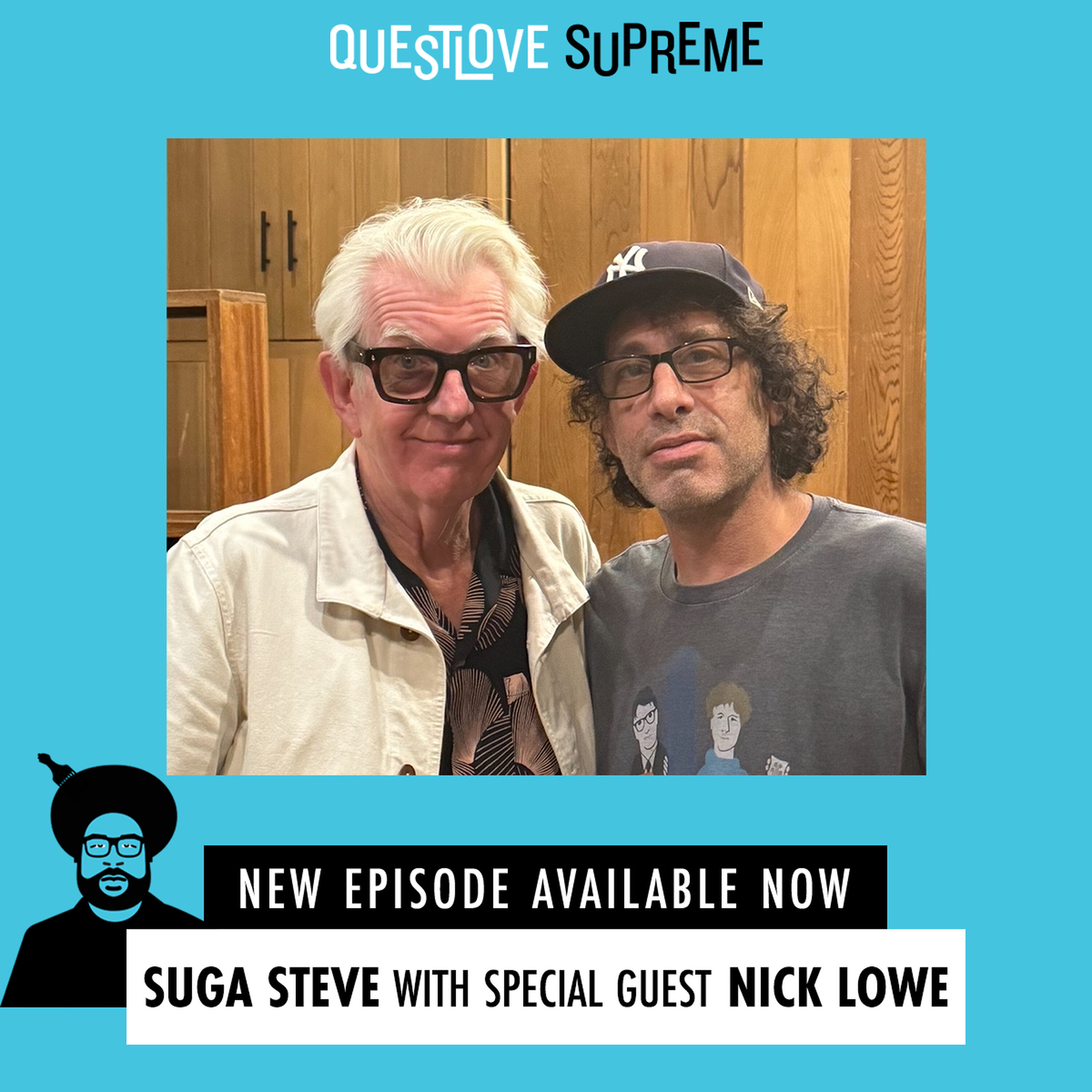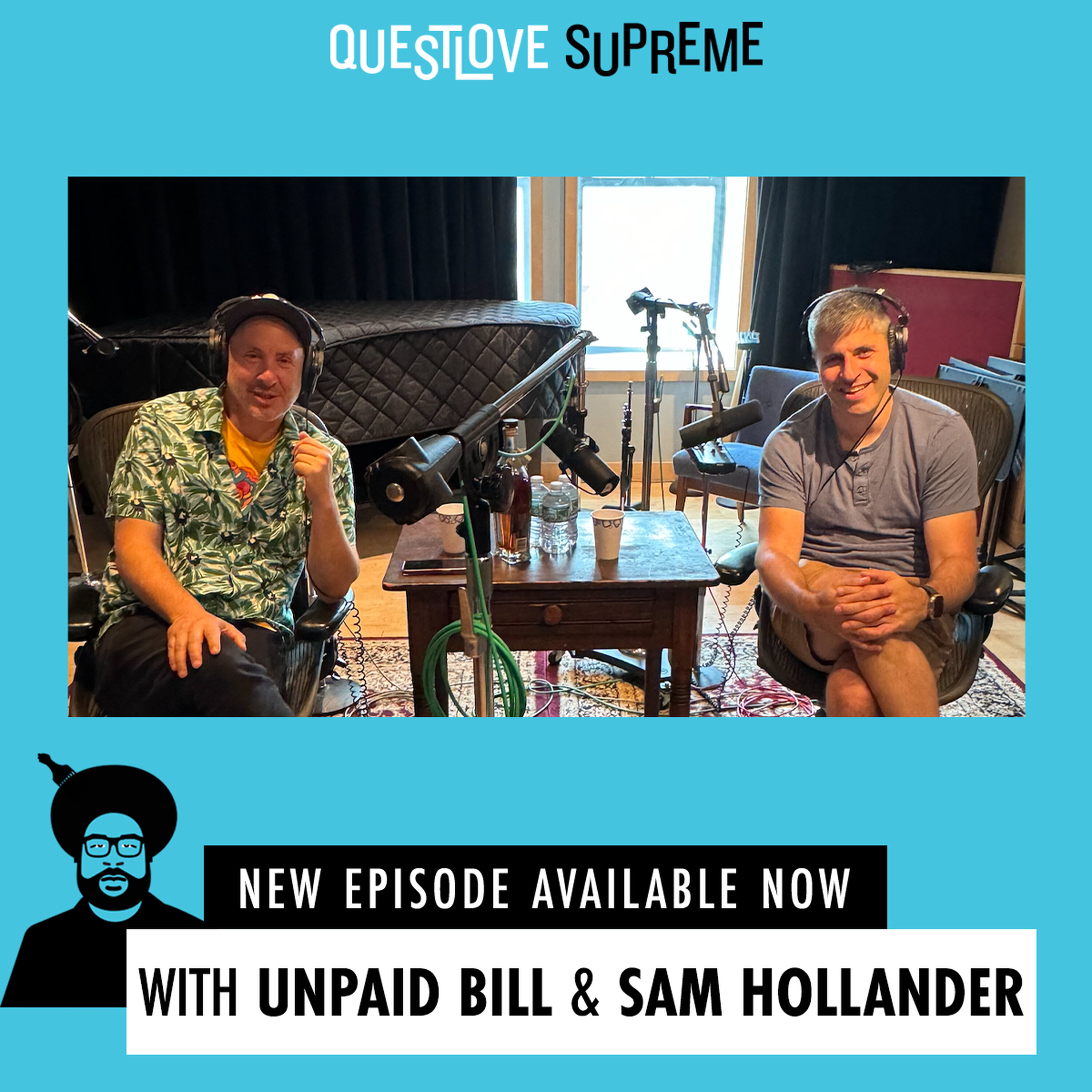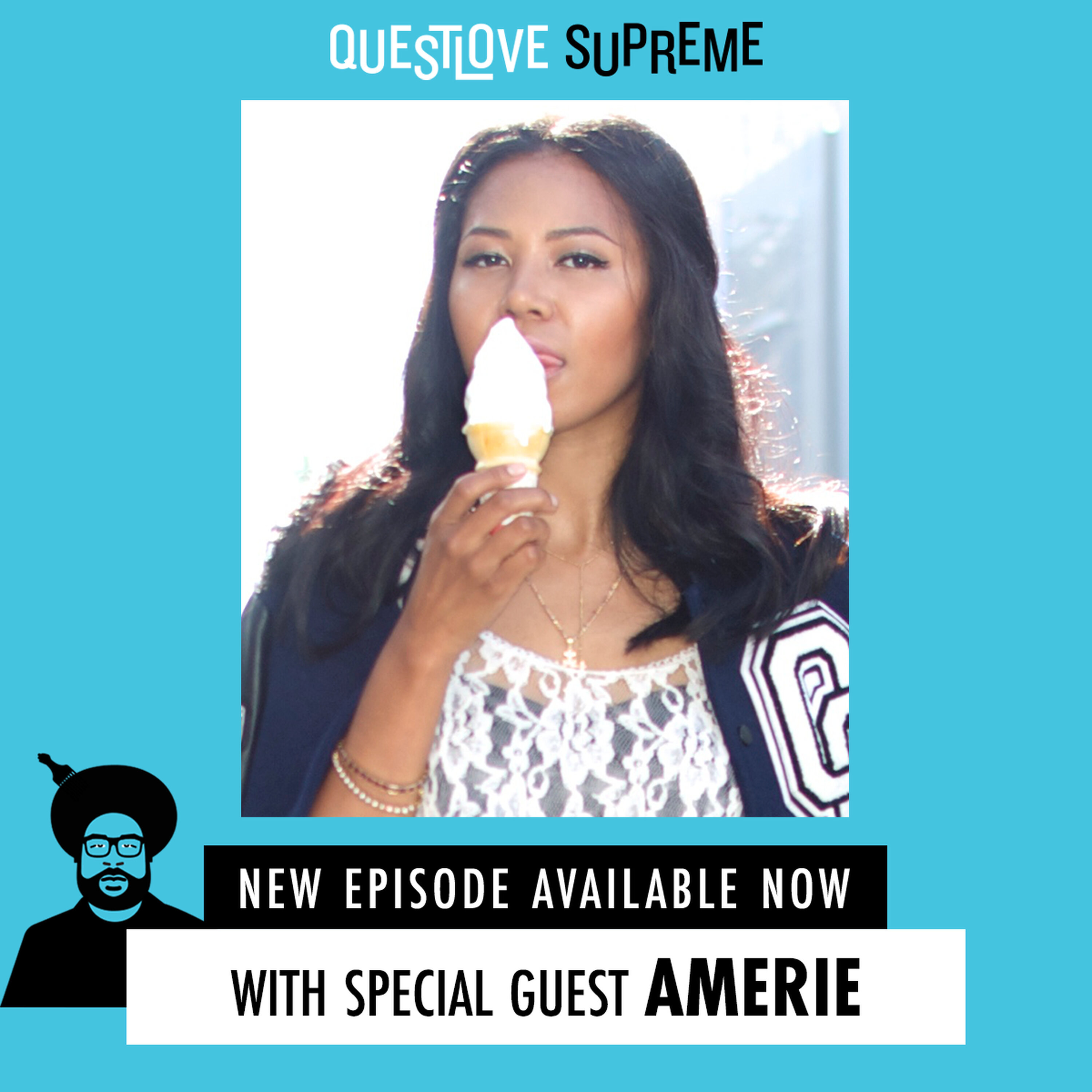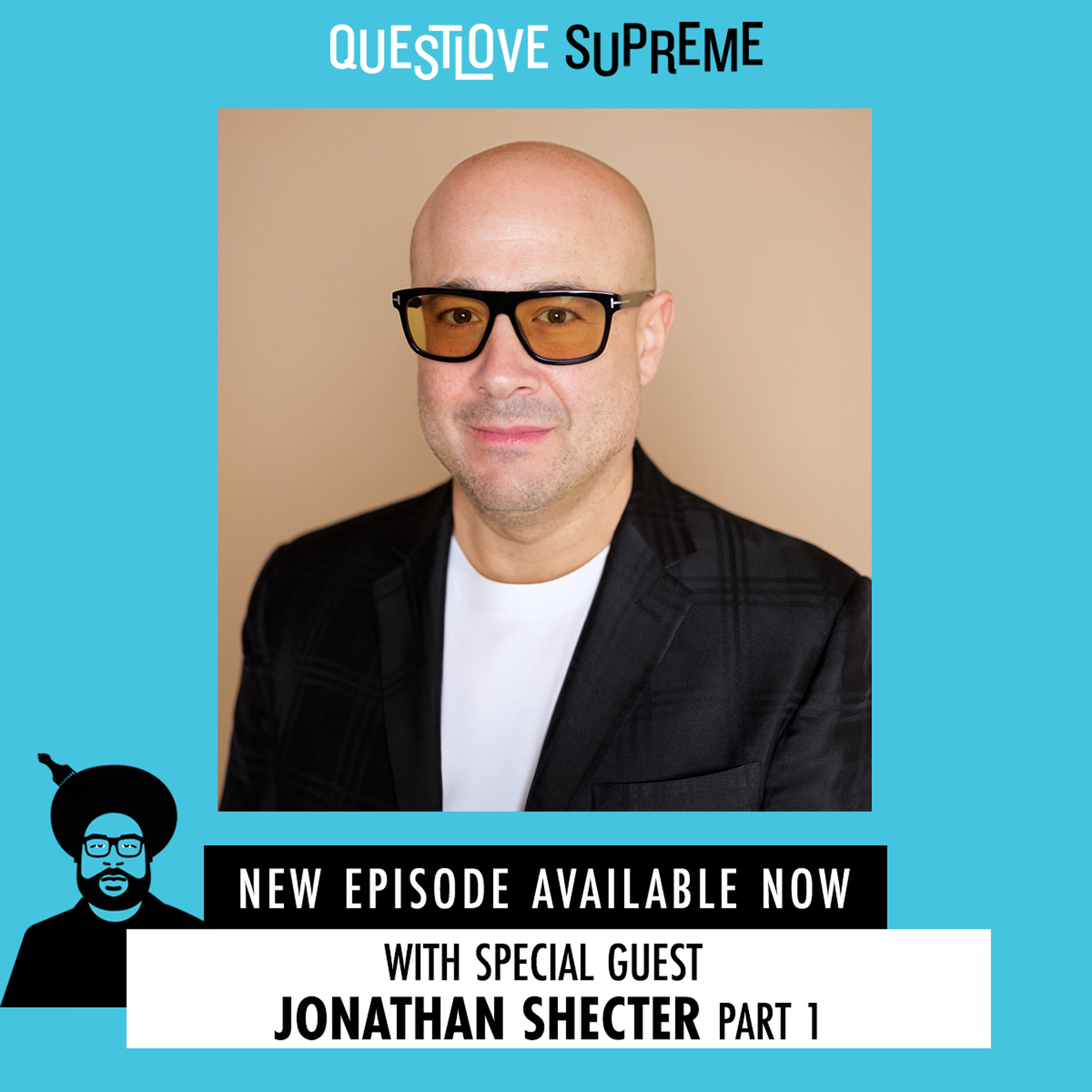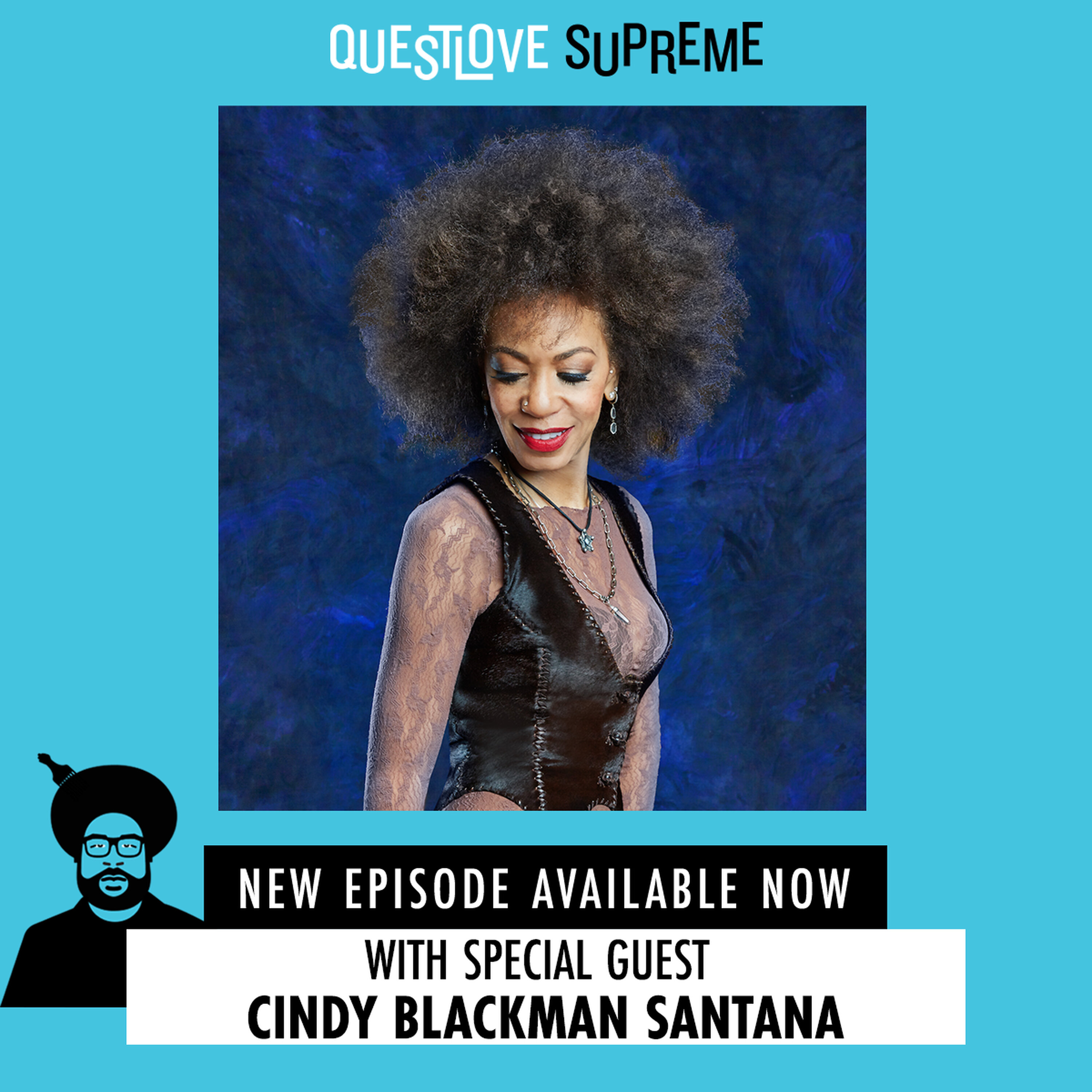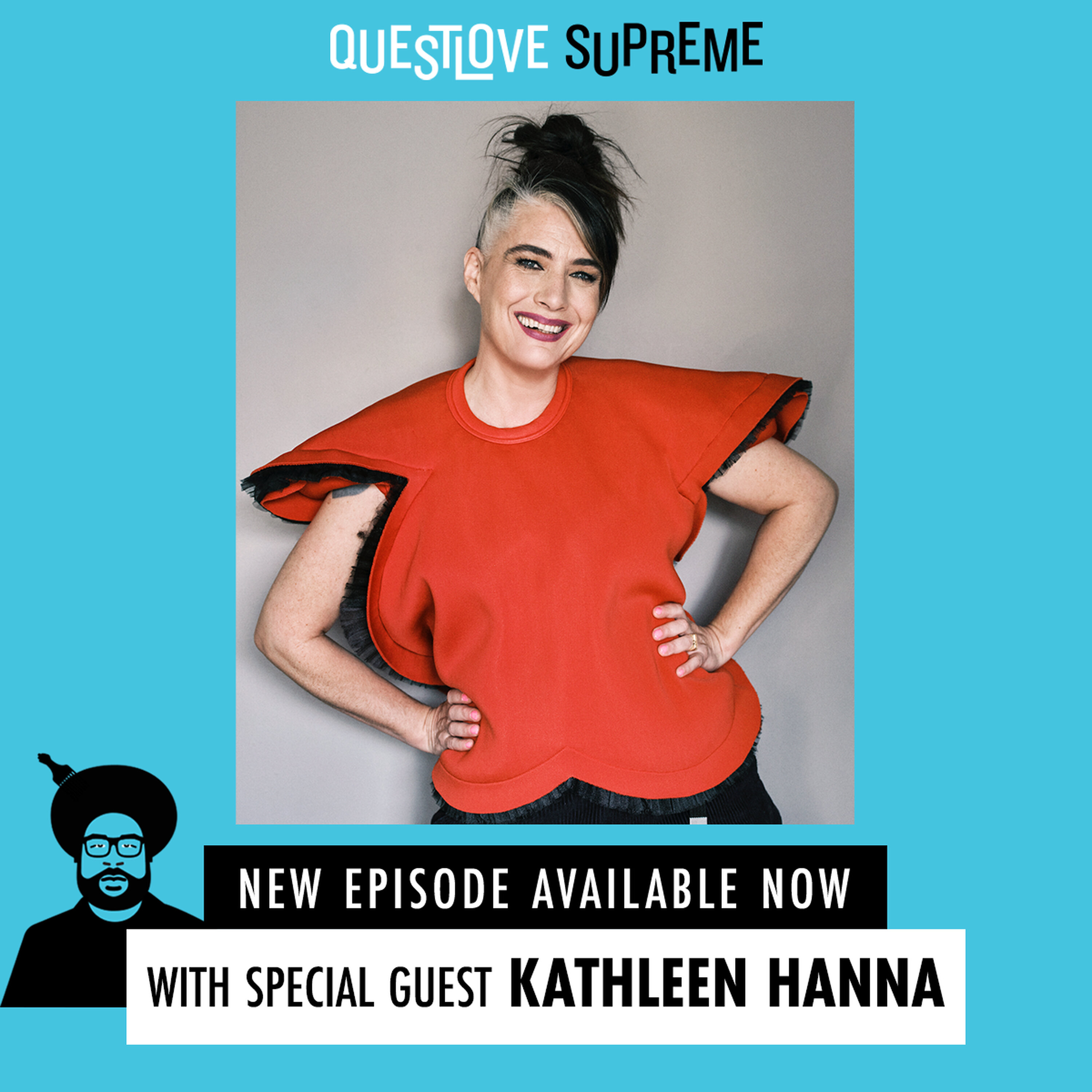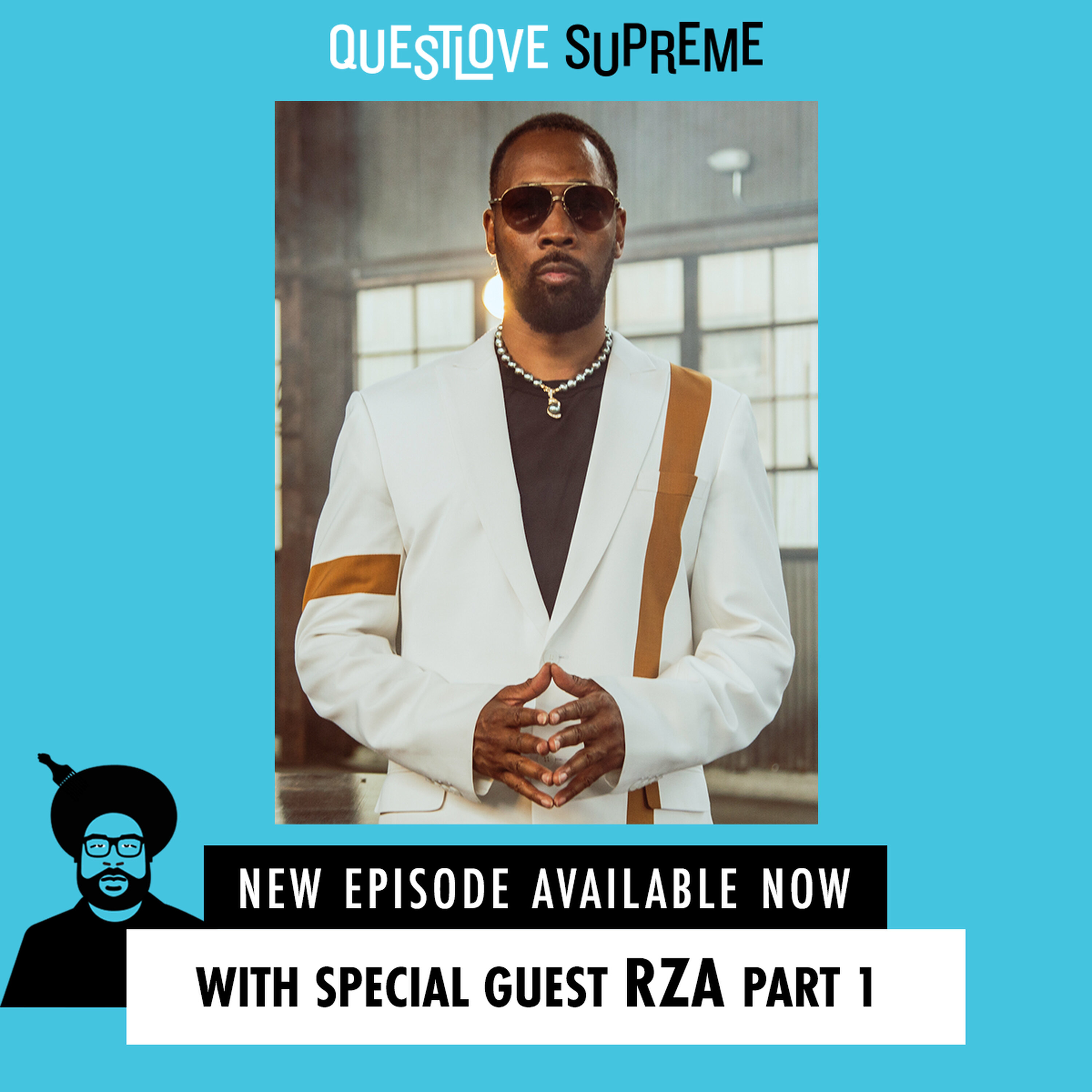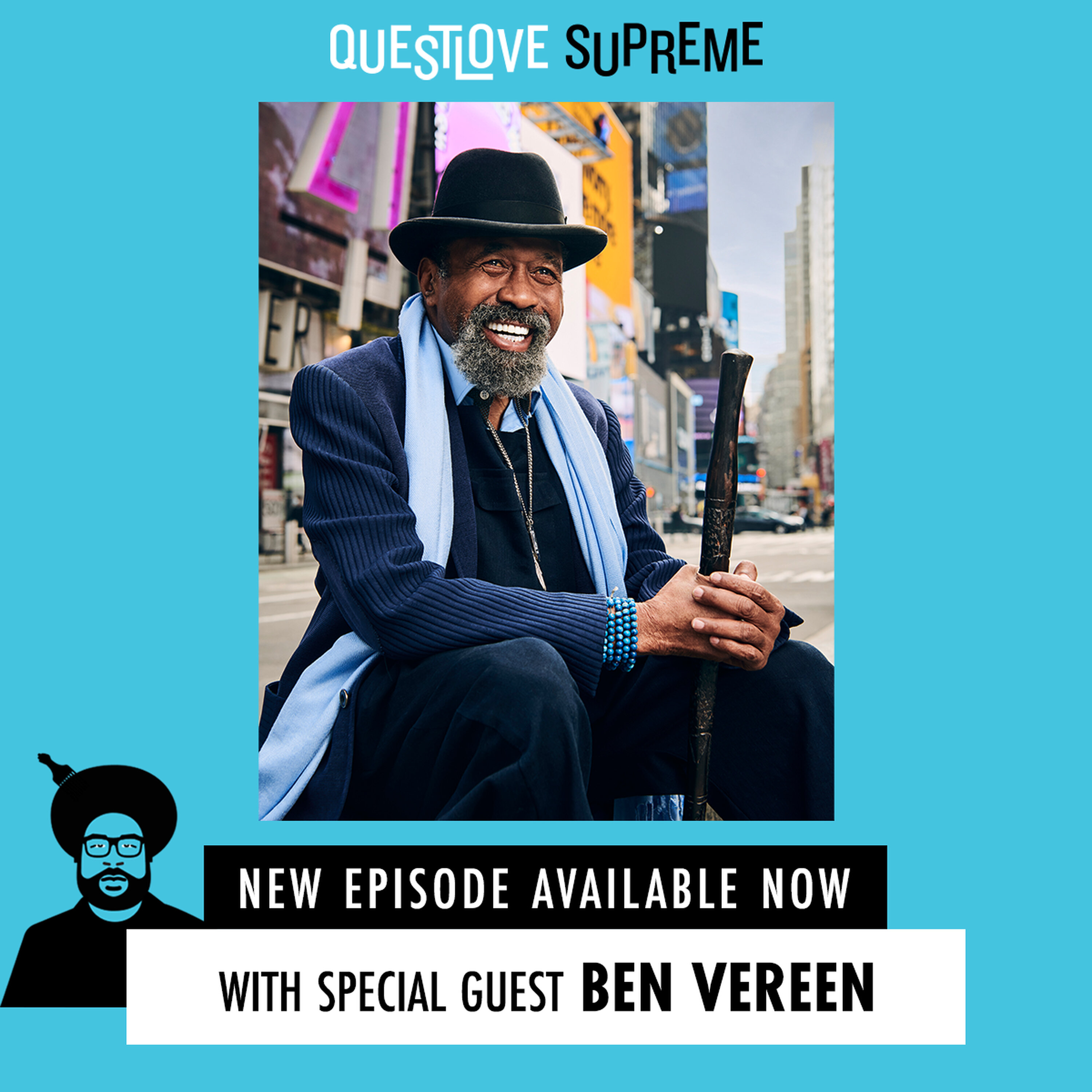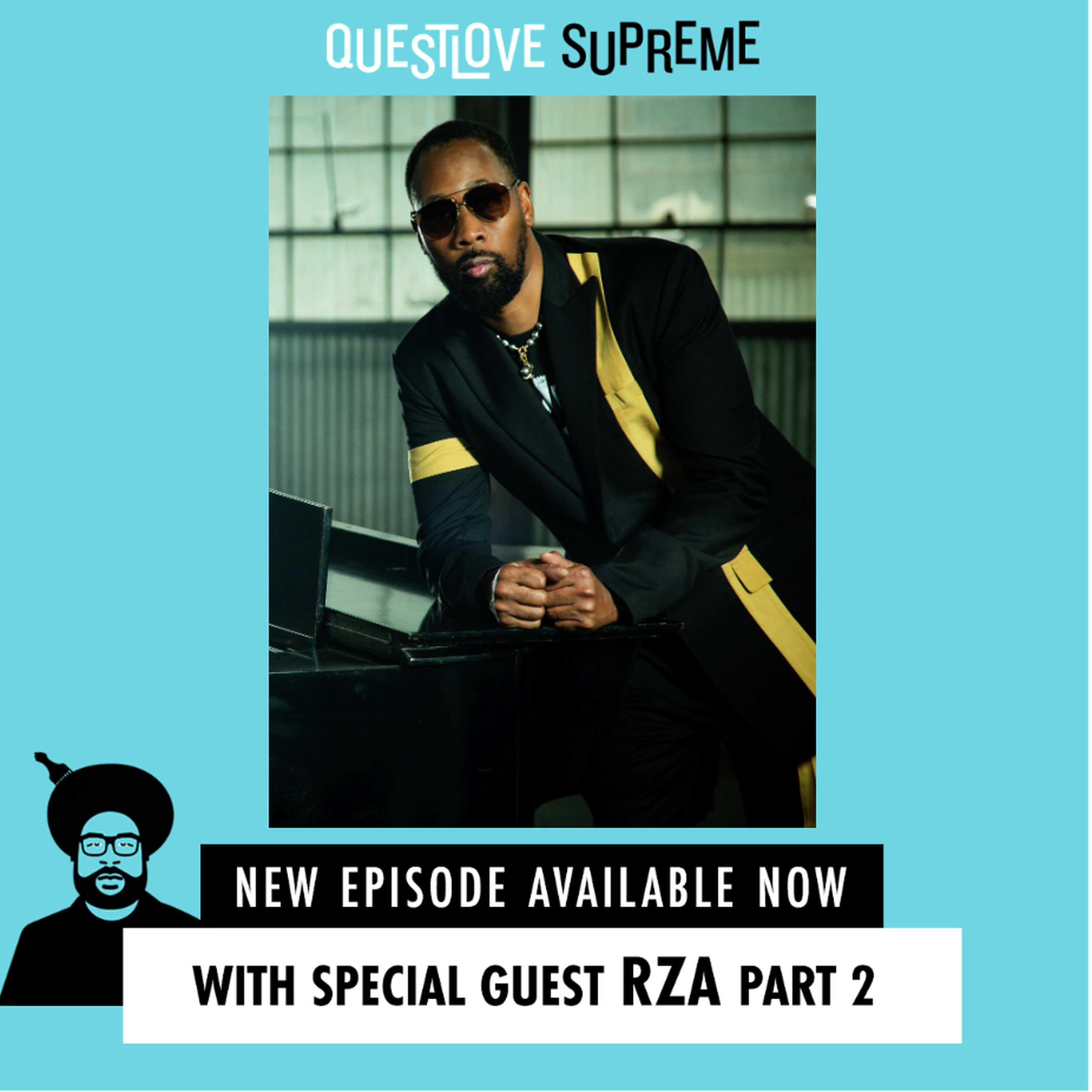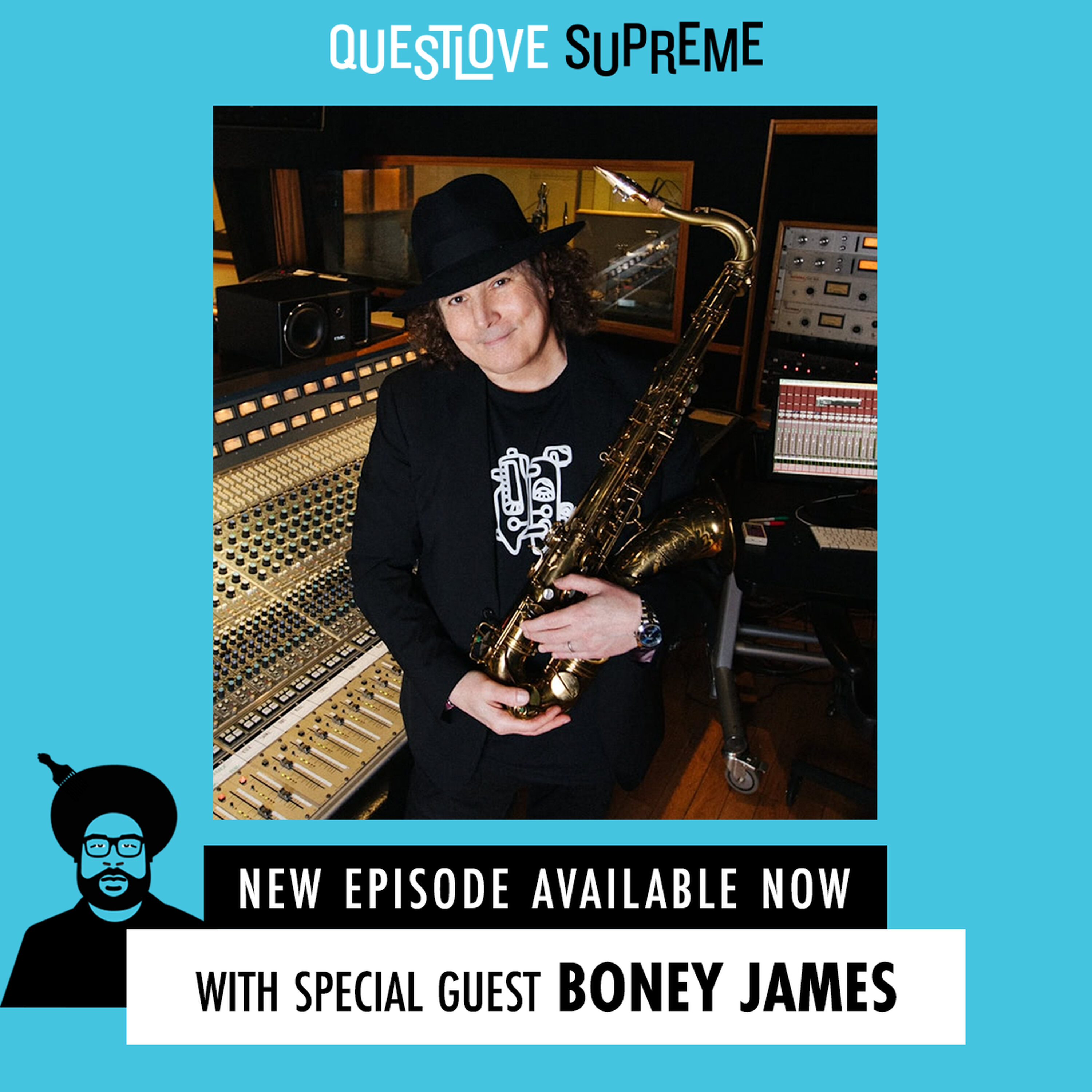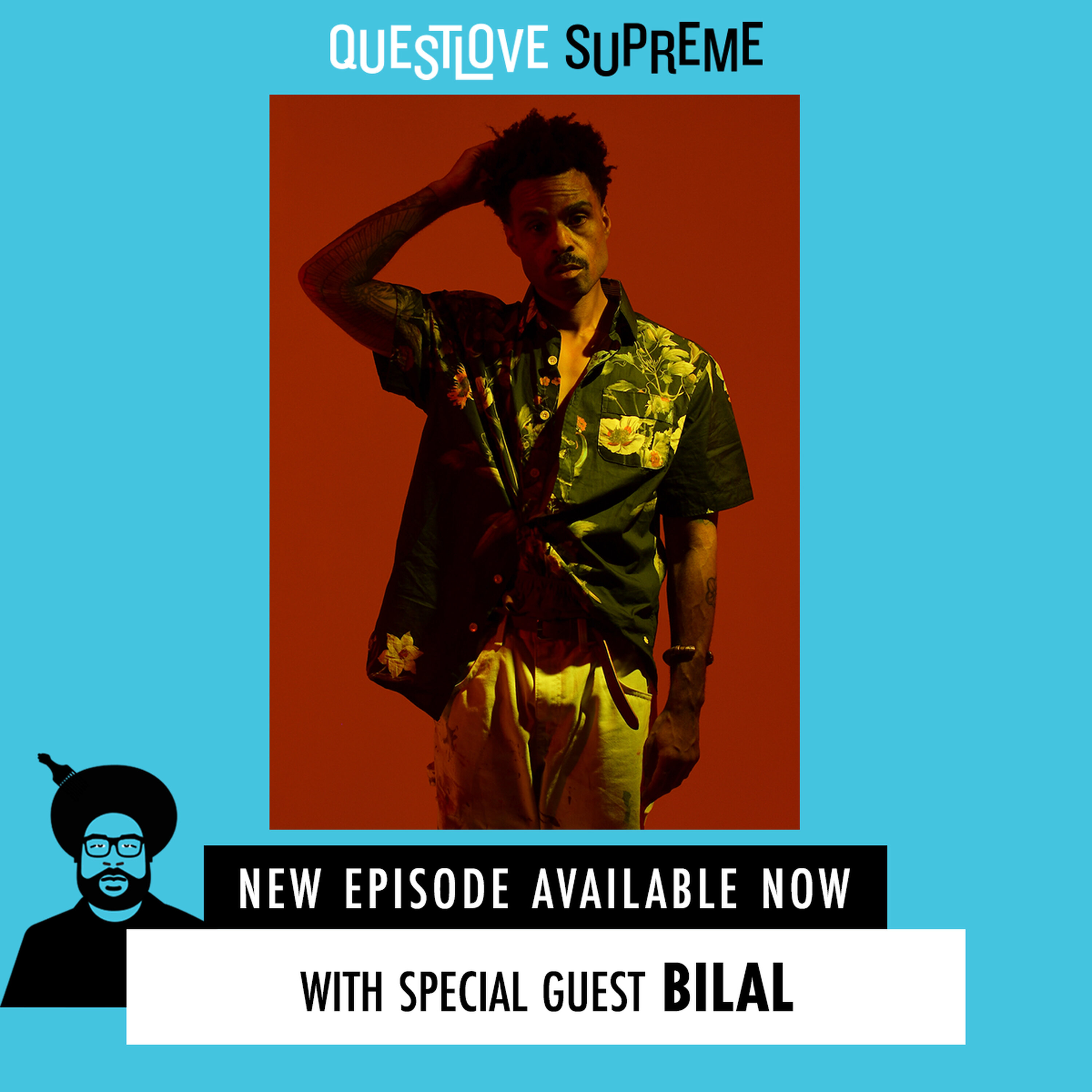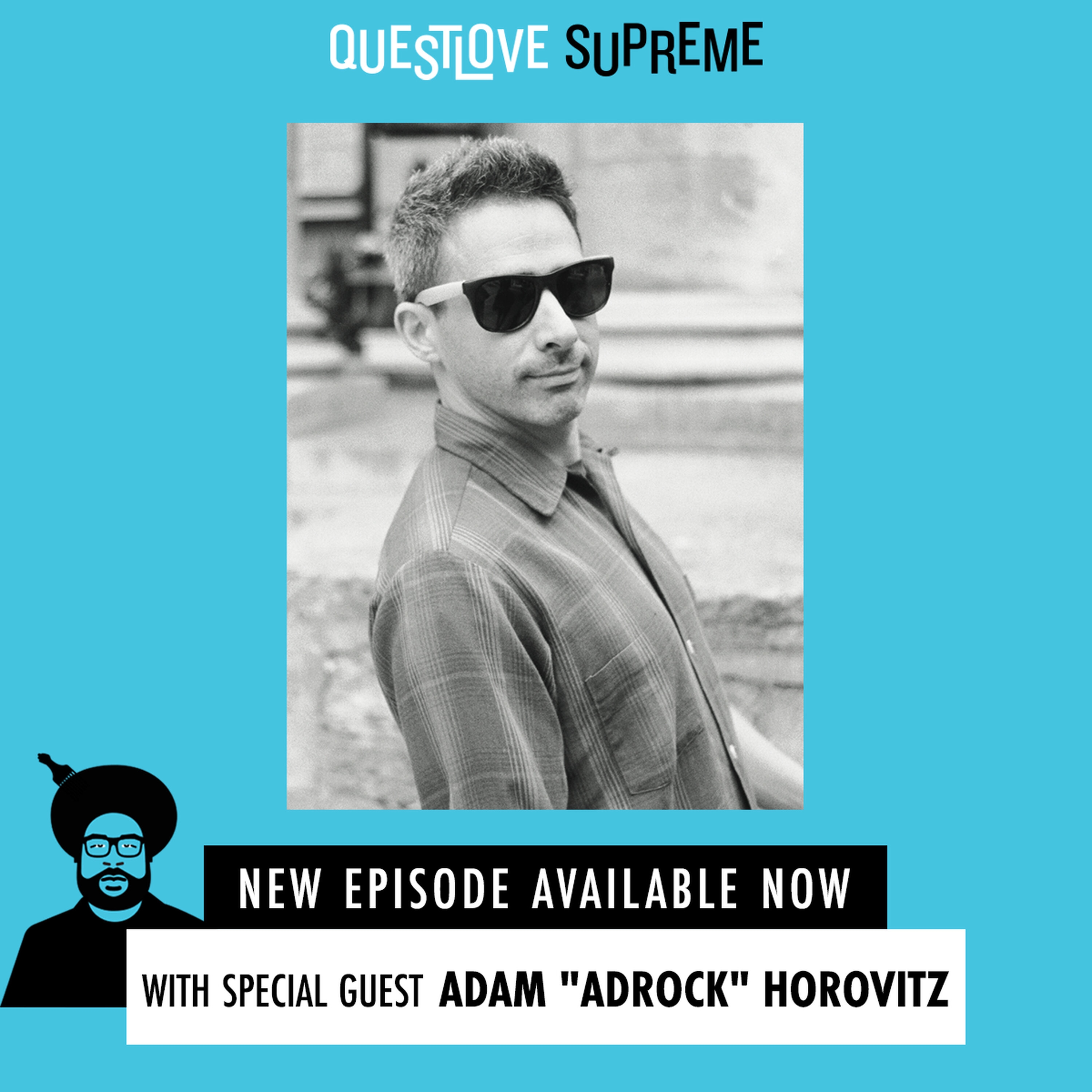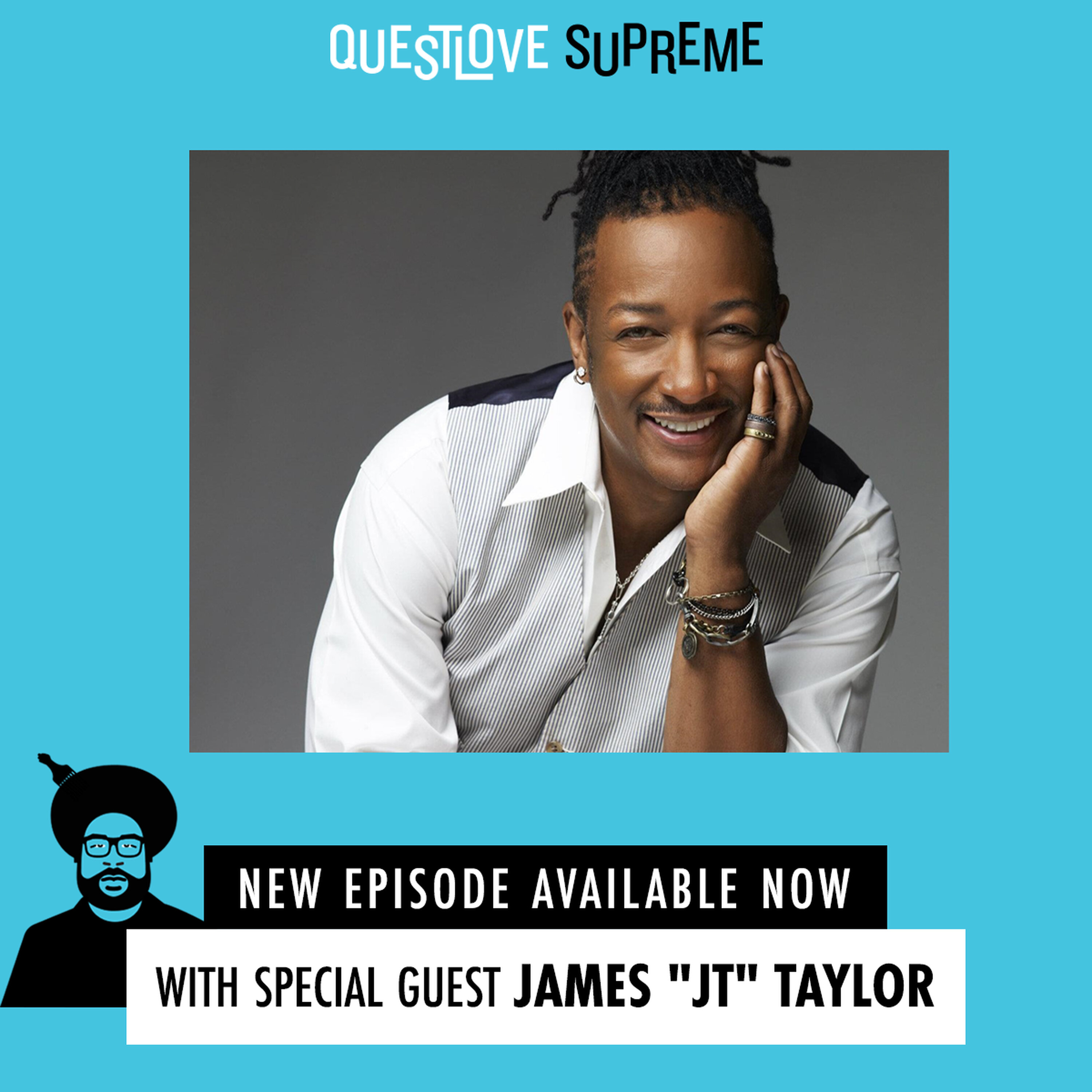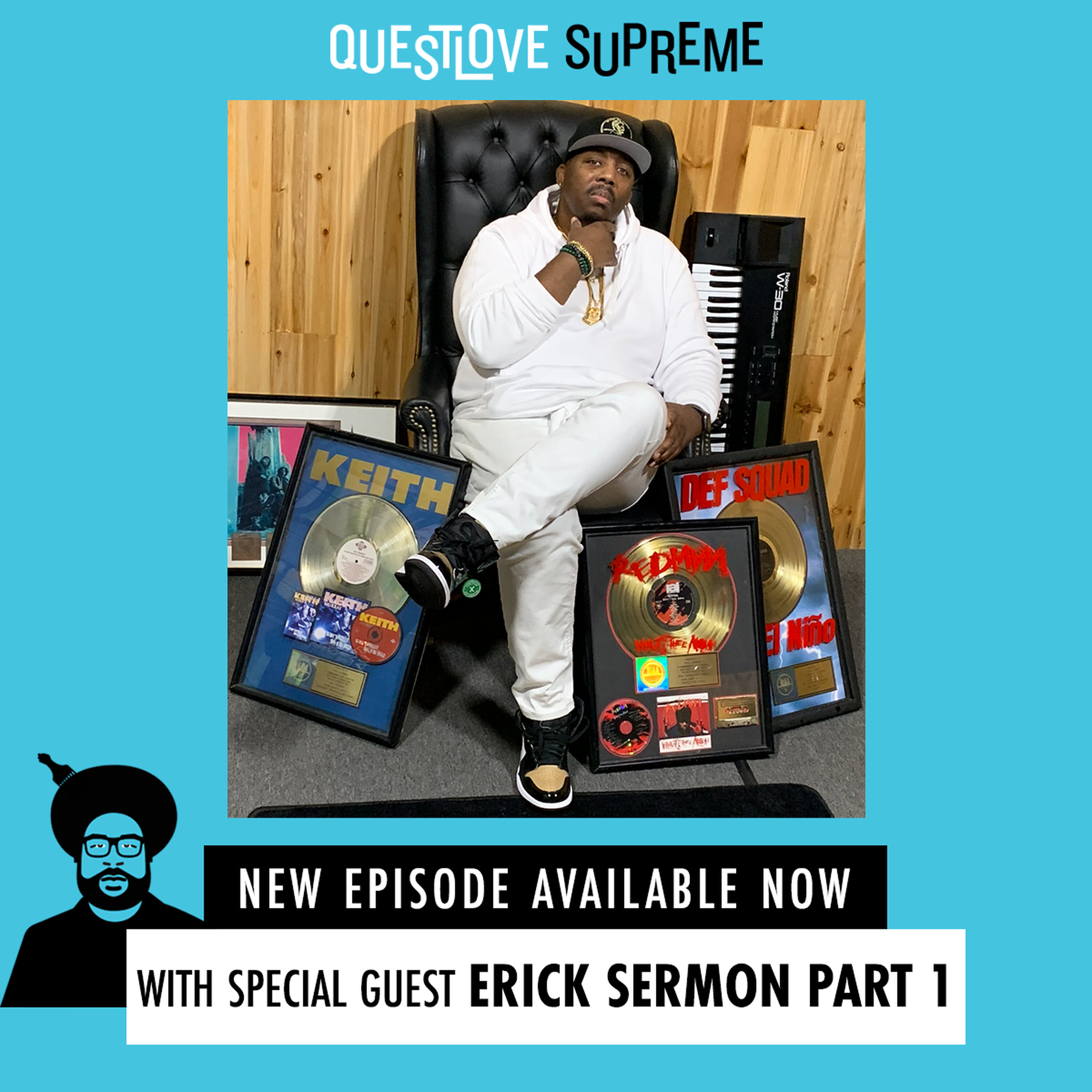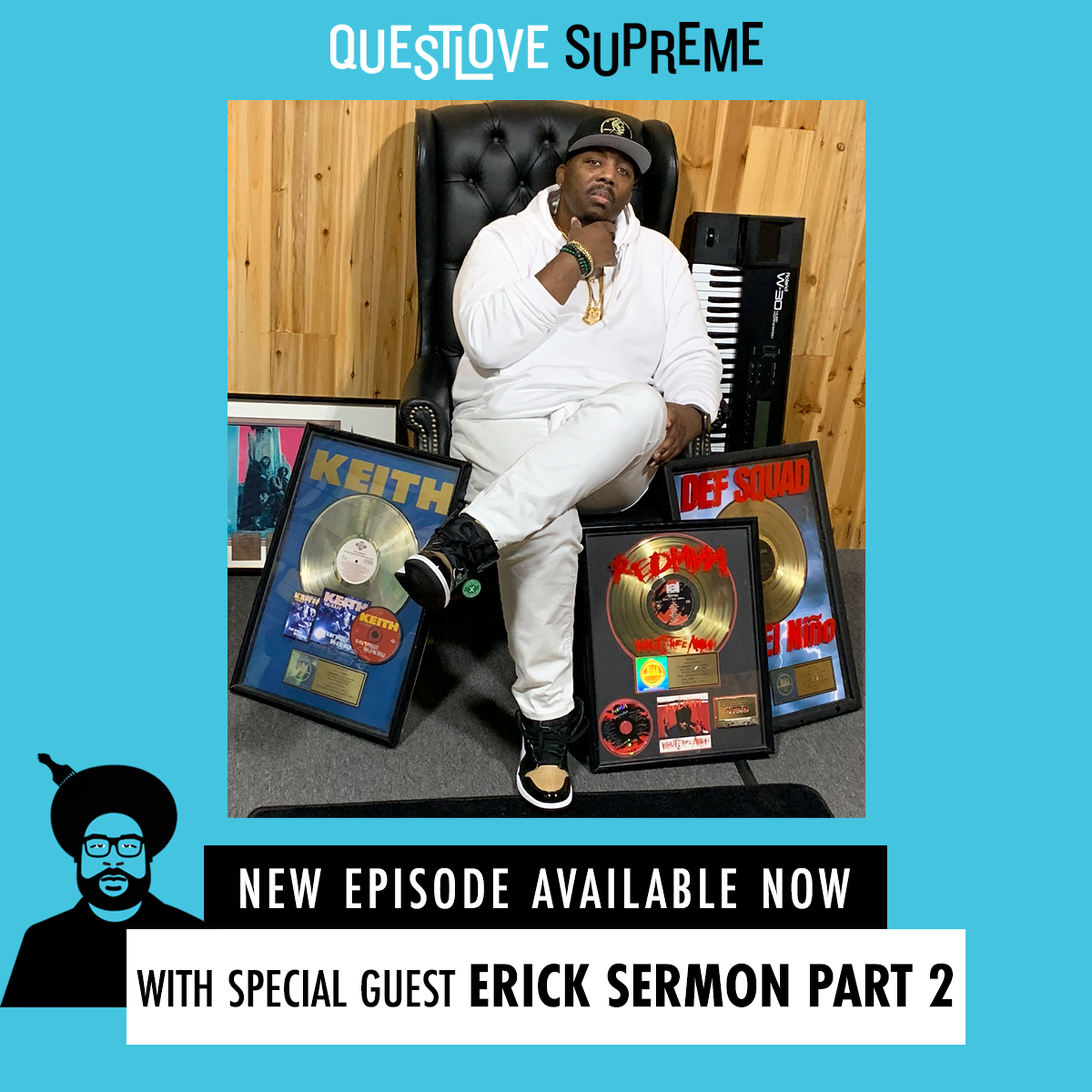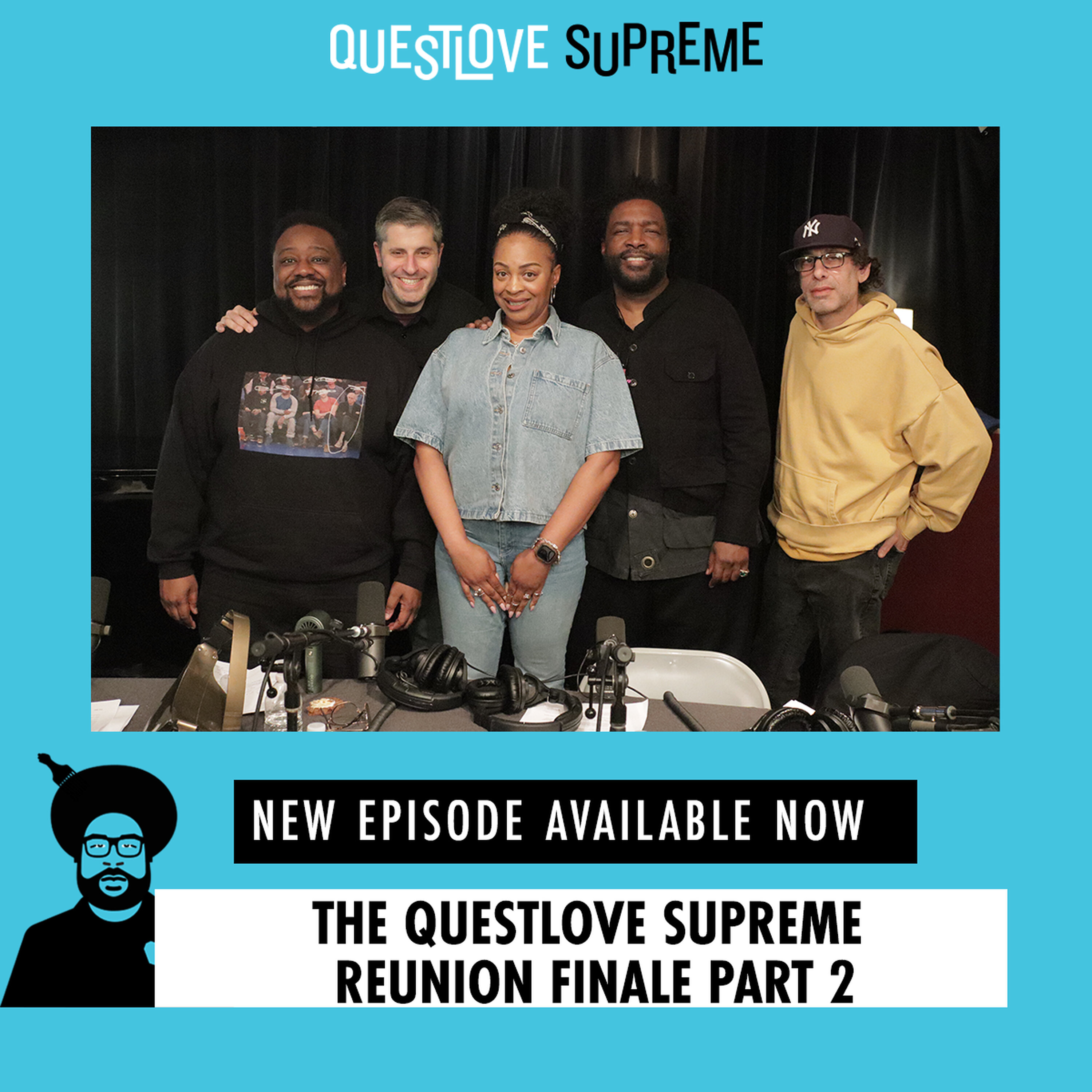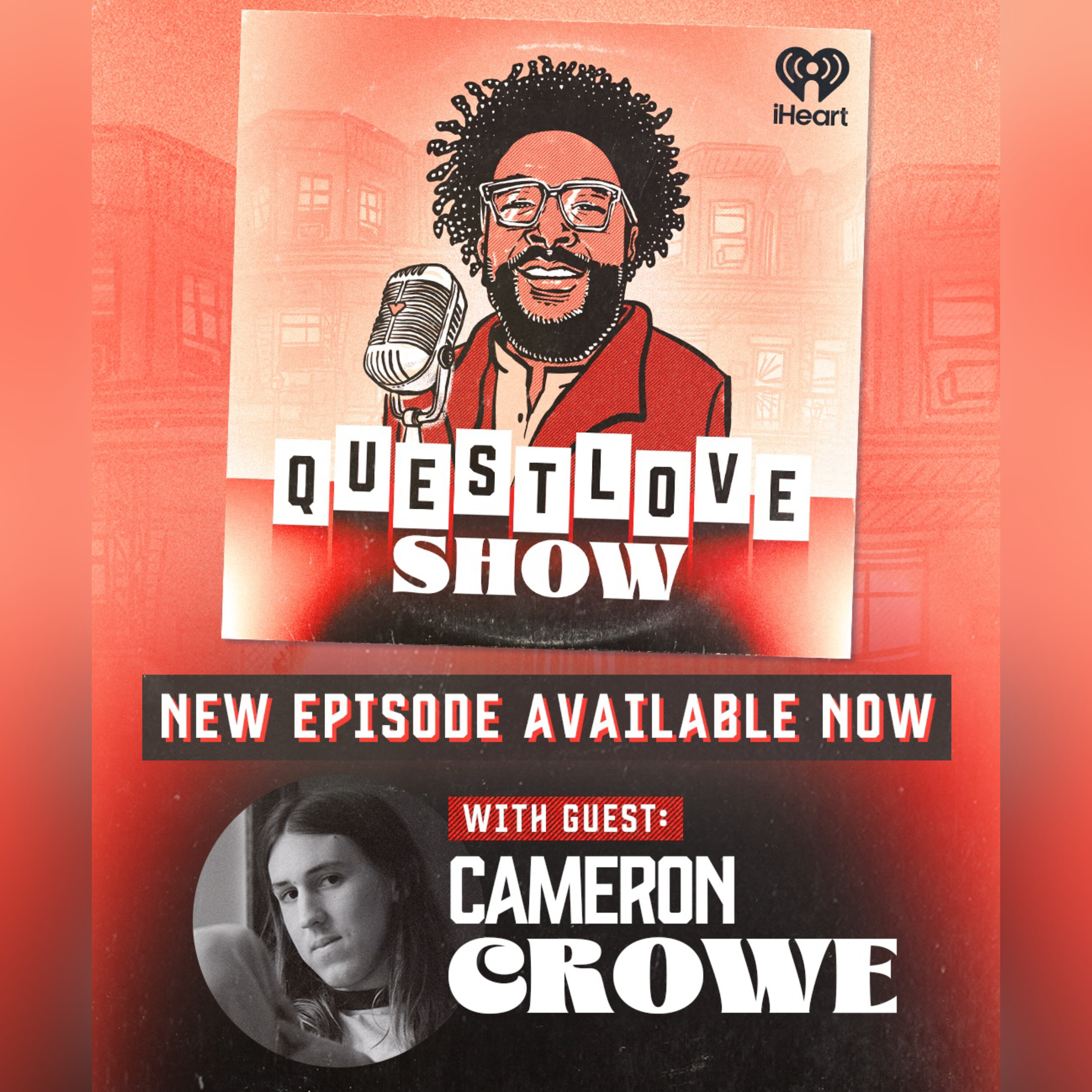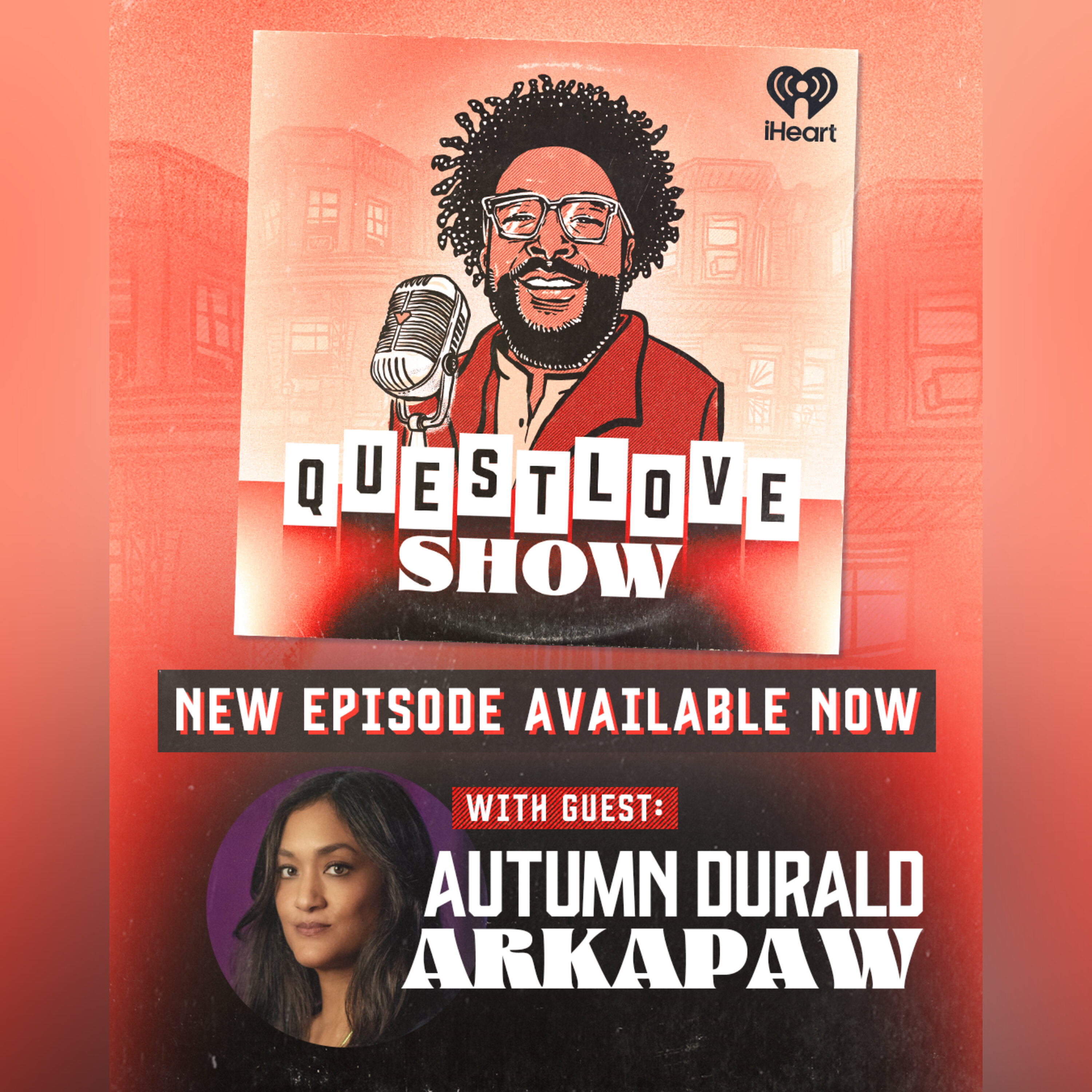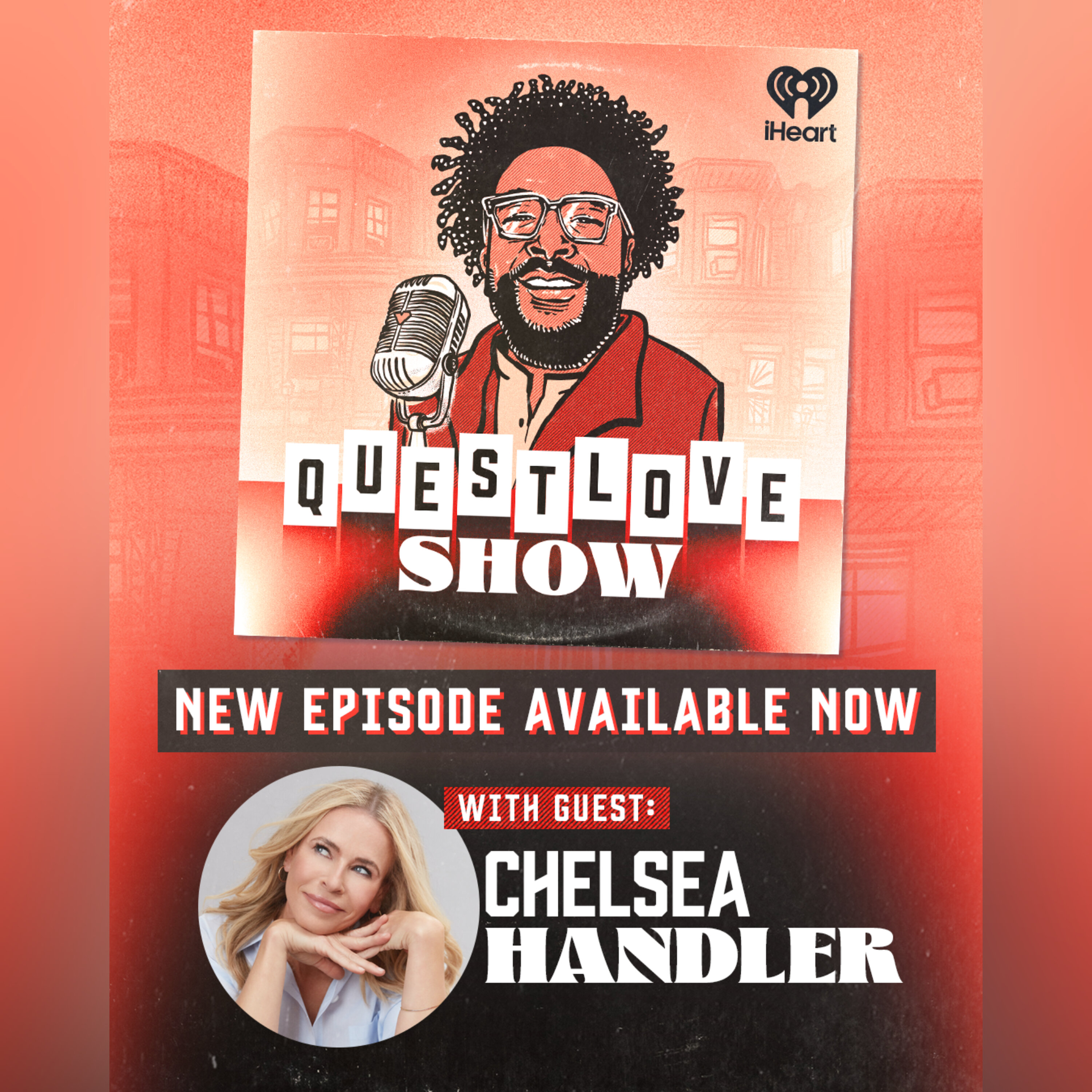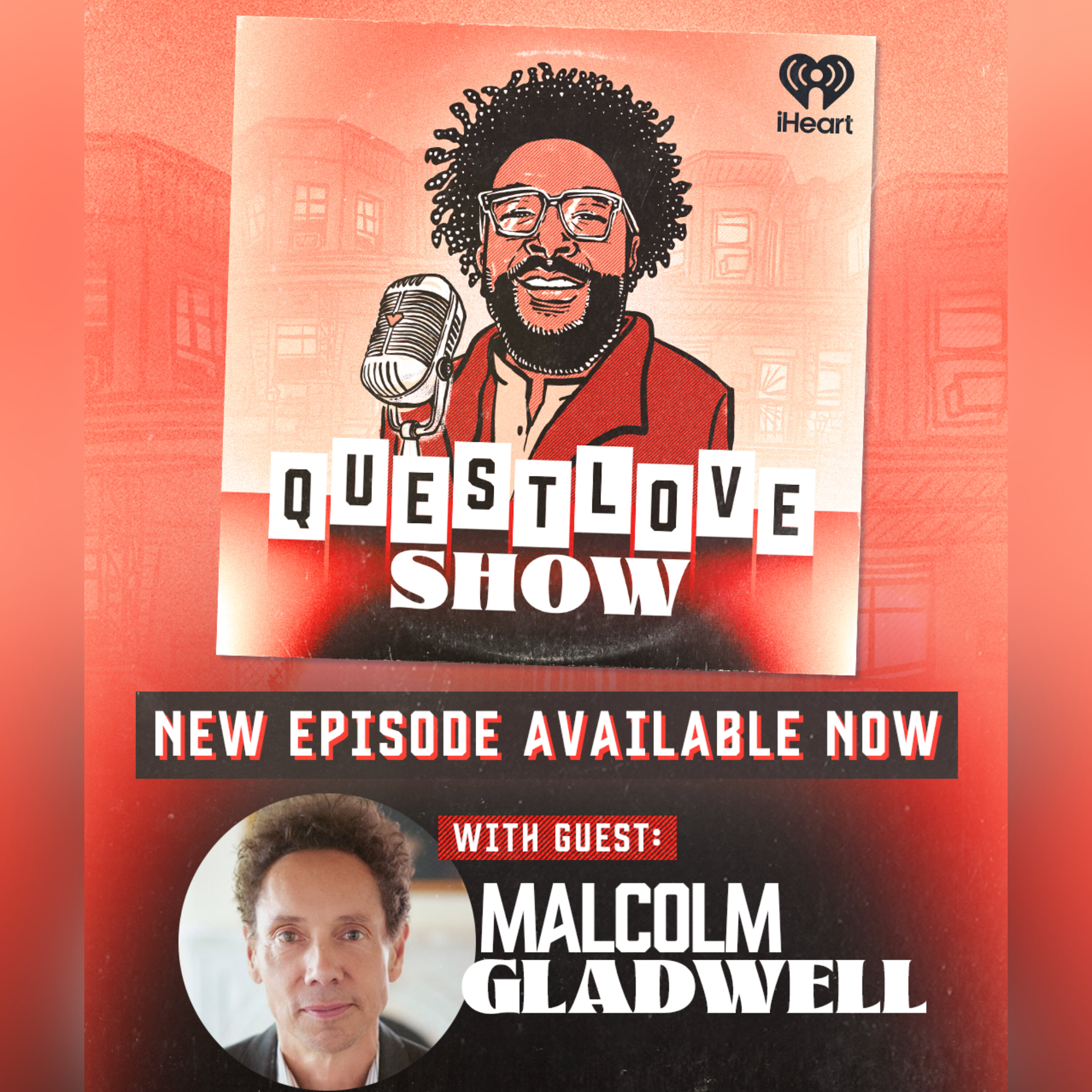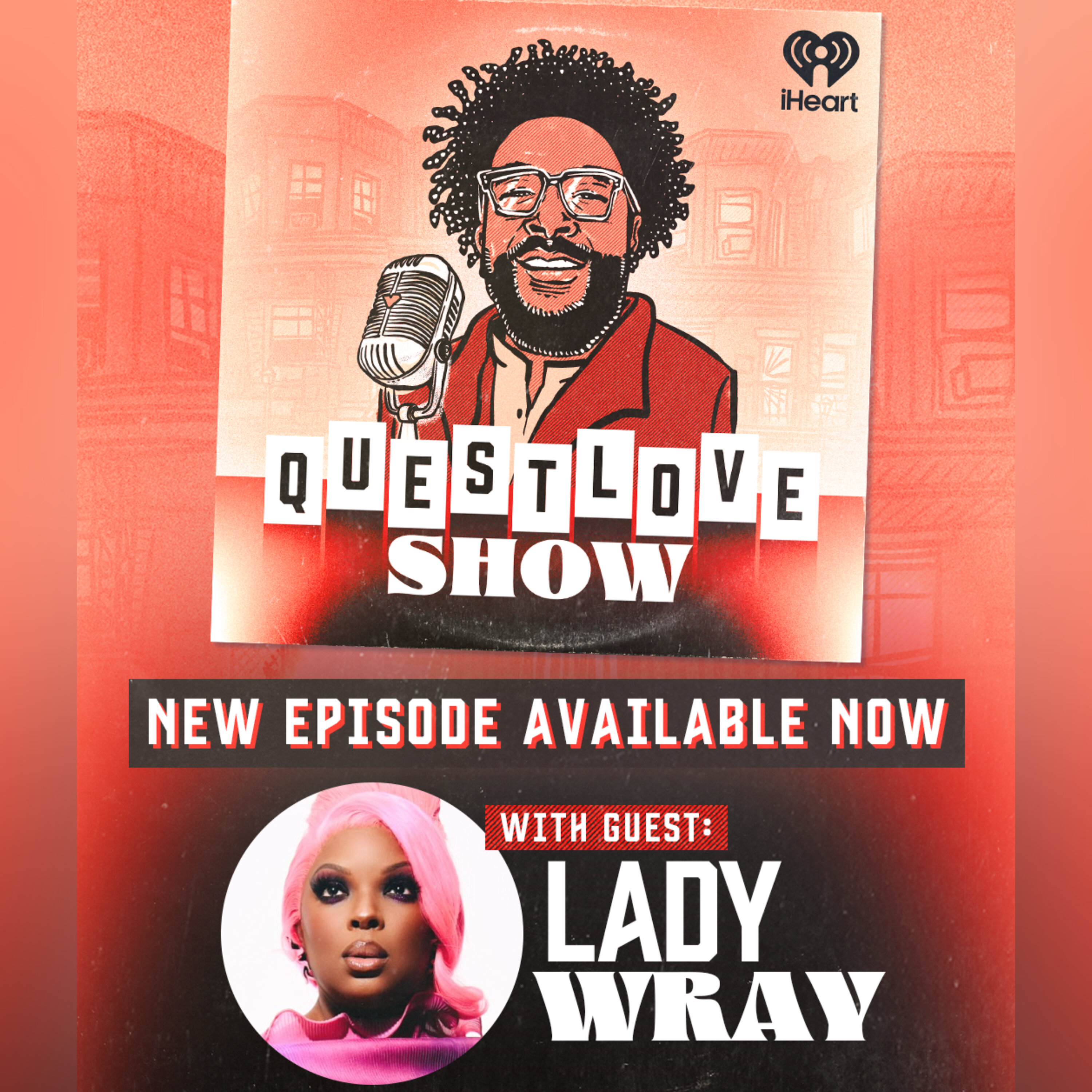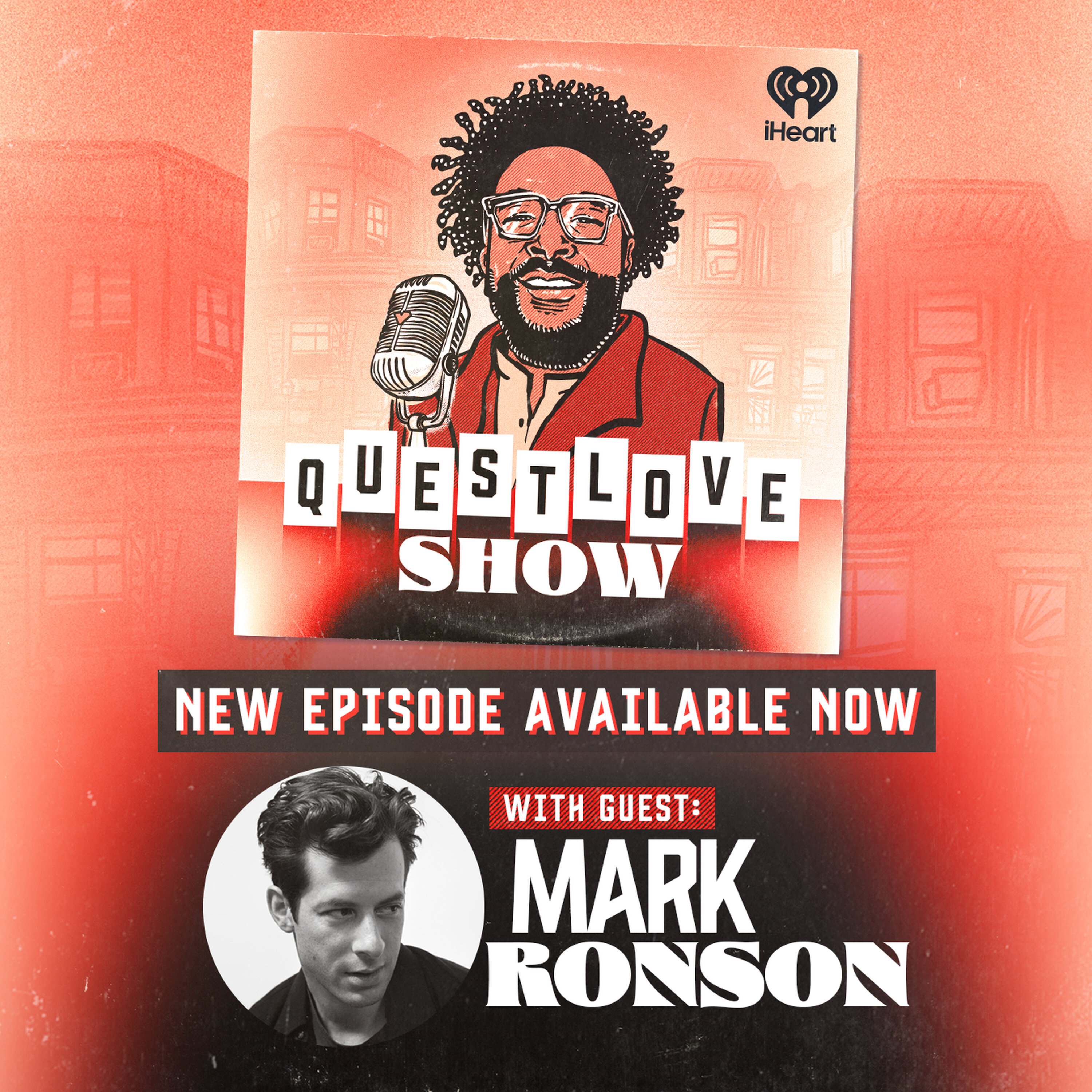Ben Vereen
Ben Vereen joins Questlove Supreme with his daughter Kabara. What begins as a conversation about a legendary, award-winning career in theater, film, and television organically goes someplace much deeper. Ben Vereen shares discoveries about his identity and traces his knowledge of self while speaking about Roots, Sweet Charity, and his unforgettable appearance on The Fresh Prince Of Bel-Air. This QLS episode is a powder keg of emotions, realizations, and timely calls for history and truth from one of our great elders, who is finishing his memoir.
00:00:00
Speaker 1: Quest Love Supreme is a production of iHeartRadio.
00:00:09
Speaker 2: Ladies and gentlemen, Welcome to Quest Love Supreme. Quest Love your host. We are here with the fam like, yeah, hello, where you right now? You're in La?
00:00:18
Speaker 3: I'm in sun La.
00:00:20
Speaker 2: Yes, yes, your your wall situation is so unique.
00:00:23
Speaker 1: Every episode I see a new part of your house I never knew existed before.
00:00:27
Speaker 3: That's hilarious.
00:00:28
Speaker 2: Unpaid bill, Yes, sir, it was good to see you. Everything about you. I complain drinking coffee for QLs, which is a new I vibe, but I'm.
00:00:36
Speaker 1: Super into it right exactly new vibes. I'm drinking applesire lemonade or the opposite of is.
00:00:45
Speaker 3: But that's that thing that's good if you drink first in the morning, that's good of mer.
00:00:48
Speaker 2: Exactly exactly, Sugar Steve, what's that brother? Good morning everybody? How's it going? Very well? Thank you? That's good to hear. Good to hear. What can I say?
00:00:58
Speaker 1: Ladies and gentlemen, we you know we're about checking off our bucket list, dream interviews and our guest today is a legend of the big screen, the big stage, and of the recording studio. Depending on your generation or your taste, certain if my mom were here, she'd go nuts over the fact that, you know, let's start Pippin or Sweet Charity or Hair or all that jazz is with us. Our guest today is one of the first actors that my parents approved of me watching. If you're you know, I've mentioned many times that television really wasn't looked upon unless it was like Sesame Street or music. But Roots was required watching, and I watched all that show even at the age of five. So the fact that the character Chicken George is here in front of me like is mind blowing. Of course, if you're eighties baby, I'm sure, Layah. Are you an eighties baby or nineties.
00:02:05
Speaker 3: Baby today, I'll be eighties, I'll be eighties all right.
00:02:08
Speaker 1: Of course we remember him in Webster. Yeah, even for gen Z society that lives for memes. Of course we know hims Will's dad or the fresh Prince of Bill. There we are in the company of greatness right now, Ladies and gentlemen, please welcome the Tony Award winning Ben Veren and also not to mention his daughter at Kabara, who also helped organize this for us, Welcome to the Quest of Supreme Hello, how y'all doing.
00:02:39
Speaker 4: Oh, thank you so to be here waiting for this quite a long time, sir. You had my friends on and help me on.
00:02:49
Speaker 1: We're gonna have you on right now. Where are you talking to us from? What part of the world are you in?
00:02:55
Speaker 4: I'm in New York City at the dance fit of Hall Author Mitchell's of Harlem, and I'm honored to be I'm working with my daughter on her new piece that she's doing called The Resurrection of ot Cyrus. It's going to be at the met on January seventeenth. I'm directing it, and so we're in rehearsal right now. And I'm honored to be here in Arthur Mitchell's because I remember, I remember you, Tah. I had a conversation with Glenn Turman, my good friends, and we went to the High School of Performing Arts together, and there's one photo that encouraged me on the wall there and it was Arthur Mitchell. He was in his beautiful dance post on the wall and I said wow. And I later became a good friend for them, and now I'm in his studio. So thank you, author.
00:03:42
Speaker 2: So you went to school with Glynn Turman at a performing.
00:03:44
Speaker 4: Arts school was performing our school.
00:03:47
Speaker 2: Yeah, what time period was this, If you don't mind me asking.
00:03:50
Speaker 4: In nineteen oh four days, good old day.
00:03:58
Speaker 1: I'm only asking that because because you know, when I was in first grade in the mid seventies, my parents made a big deal of you know, you're going to a new type of school where you're going to do like acting, art, music, dancing, like all those things. And I was led to believe that schools of that caliber were unique to the seventies. Like I was part of the first generation of performing art schools. So you're telling me that they were performing art.
00:04:29
Speaker 4: Schools before there's the fifties. I started in the fifties, I believe late fifties. I got there in the sixties, and I believe it just began to take on form. It was called the High School for the Performing Arts. Later it's now called Laguadia. They moved up on Tenth Avenue, but we were the first. There was music and art and performing arts. And we had a rival, you know, we said, oh, music and art ain't nothing. You got to go to performing arts, you know.
00:04:58
Speaker 1: Yeah, So in the fifties, you went to a performing arts high school in New York that we still know as the Fame School. Right, you're blowing my mind that there was even the idea of black and white students going to school together studying the arts.
00:05:17
Speaker 2: So what was that experience like for you?
00:05:20
Speaker 4: You understand something. The arts is the one thread that keeps civilization going. We are all creative aspects of the creator that created us. So the arts is the one thing that's going to propel us into whatever experiences we're going to have in this lifetime. So they can't hold back the arts. Well, so wonderful about that time because you know in sixties that's when Neil Martin, Luther King and it's from Malcolm Macks. That's streets, you know, the hippies and the whole movement. So that was all happening then. So performing Arts I got lucky because they needed boys for the dance apartment. Now Glenn Book's coming up from acting. I knew nothing about the arts. I'm from the I sang with Sensational Twilights of Brooklyn. You know, brooking was my home. And when I went to the High School of Performing Arts, it was a whole new world. Man. The arts became a new word in my vocabulary. I saw a dancing sort of first time I saw a serious musician sort of person, I saw serious actors. You talk about Beneth Caroll, you know, yes, Beth Carroll was there. It was integrated, as we call in those days.
00:06:29
Speaker 1: So there was a lot of stigma on me as an elementary school student concerning the arts. It was already like, oh, you're one of those weirdo kids at least, like you know, coming to my neighborhood to go to performing arts school automatically made me kind of like a social outcast.
00:06:49
Speaker 2: Now here's the thing. Music was always my thing.
00:06:52
Speaker 1: But for the first year and a half of me going to that school, the school was like, before you get on that drum set, you got according your rhythm.
00:07:01
Speaker 2: And so they brought a pair of tat.
00:07:03
Speaker 1: Dance hs and they're like, you're going to have to learn how to dance first before we let you on that drum set.
00:07:11
Speaker 2: Of course, be in the seventies what the seventies were, there was a lot of sigma. You say, you dancing, you're dancing?
00:07:18
Speaker 1: Was the idea of dance expression a stigma for you in the fifties as it was for me in the seventies.
00:07:27
Speaker 4: The sixties sixties. Okay, okay, I'm proud of people. Ask me how old that them? I said, you remember Moses. But here's the thing about I also went through that stigma because I ran with gangs. You know, I ran with the Crossair Lords and you know the bishops and the Chaplains and all those guys in Brooklyn. So there I was going all of a sudden. I remember my mother getting a list of things required for me to go into the dance department. I knew nothing about the drama department. I probably woul of the acting department. I probably would love to try it out for that. But the wonderful thing I had a guy named David Wood to talk about the importance of telling you story through dancing, through movement. But the point is that in my neighborhood, if I came home, now, I gotta get a dance bag, I gotta get tights, I gotta get a dance spell.
00:08:23
Speaker 2: I didn't wear a jump suit.
00:08:25
Speaker 4: Yeah, ballet slippers, Yeah, you kidding me. I was walking about Brogans and you know Garrison. I was, you know, a tough kid, and I gotta wear ballet slippers. I wouldn't tell anybody where I was going up for school, and so they said, man's that bad man, wasn't it bag man? And nothing? It is my school stuff. Let's see no not run. Yeah, it was tough. There was something which you came across that bridge and you got in that dance studio, a whole new world opened up. Imagine it's beautiful.
00:08:59
Speaker 2: Was it cathartic for you?
00:09:02
Speaker 4: Yeah?
00:09:04
Speaker 5: That relationship with the neighborhood is so fascinating because we were talking before you got on, of course the kind of beautiful and there's a lot of alignment between some quest love supreme guests in yourself. We talked about Glenn Turman, but when you told that story about being the ballet Slippers and being in the neighborhood, it made me think about Prodigy in that way.
00:09:22
Speaker 3: In the picture of him, who you know is little Albert.
00:09:25
Speaker 5: I'm sorry, I know his rap name is Prodigy, but you knew him as little Albert at Kabar.
00:09:30
Speaker 3: What was the dan studio.
00:09:32
Speaker 6: Bernie Johnson, who is a very famous dance.
00:09:36
Speaker 5: Yeah, I imagine he had the same issues as a little boy coming up with being in a dance school to his grandmother had built. So I was just wondering if you guys, if you remember that as he was a little boy, and that that common thread with you guys in that way, that's interesting.
00:09:50
Speaker 4: Yeah, we you know which we were together. The world didn't matter. It's about us and doing what we did. We had fun. We loved the dance. We love you know, the expression of telling our story through dance. And I'd go into a studio and just take a record player and just hours just dance. You know, do all sorts of makeup stories, make up stories for myself through dance.
00:10:15
Speaker 5: Did you look at someone on TV? Was there a dancer like that you used to watch that you admired. I'm curious who you look to in that way?
00:10:22
Speaker 4: Well, there wasn't many dancers to look to it And I didn't. I wasn't into the concert world, into you going to see barthack Graham or going to see George balance sheet. Matter of fact, when I came to the studio to the school that day, and I'll never forget this, I ok, I wore. You know, they say not to make up a dance said, real dance with Quincy Jones is killer. Joe. I walked here with muter shorts, us kids sneakers, a T shirt, my father's skinny brim hat. I'm sitting outside waiting to go on, and I'm watching all these other kids dancing the balance sheet, rashing to chowpad and you know, all these deep cats of a wow. And I got me to my dance. There was white people sitting at the table. I don't know where they were. Said, I got on my did my little cool d D. I thought I was pretty cool. I sat down and the Citus in story there was a lady named doctor Rachel Yoker, and she came over me. She said, how did you do? She said you like the school? I said yes, I she said it is I. I said yes. I said you mean all right? I said yes. I says what's her name? Was? Said? Vision said what? I said, Benjamin? She said you mean ben Jammin. I said yeah, Benjamin, what's wrong with you? She said, well, do you like the school?
00:11:40
Speaker 7: Yes?
00:11:40
Speaker 4: I she said okay, And then she said, you know these people at the table? I said no, this white people? To me? Said you don't know George Balance. She nah Martha Graham, Na Jerone Robbins, na who they next time school? I had no idea of these people who had would carve the importance of dance into our culture. But I later found out about Catherine Dunham, later found out about Juth Jamison, Jameson, Yeah, oh man, and to be able to save that and have the experience of meeting them and walking the same path with them and having them call me friend.
00:12:31
Speaker 1: Because you know, you dip your hand or your tail into so many creative waters. Normally I asked what was your first musical memory? But I would like to know from you, what's the first thing that you created?
00:12:42
Speaker 2: What was your first.
00:12:44
Speaker 1: Moment that you realize I'm a creative I know that you were born in North Carolina. I don't know when you moved to Brooklyn, But at what point do you realize that you're artistic? Like, what was your first creative project in life?
00:12:58
Speaker 4: I wasn't born North Carolina. My biological mother was Launberg, North Carolina. I was born in Florida, Dade County, Florida. You see, the art is it's tricky and it's wonderful. I'm writing my book now, my memoirs, and I remember playing in the streets and remember having little dance parties. You know, we you know, after school, we do these little dances and as white children was coming down the street one day on Fulton Street, and it was right in the fifties, and they were solicening for your young boys, young kids to put into the art school, dance school, because it's right around the time when the you know, the civil rights are starting out, and so they wanted to show their windows weren't broken. Say, have some a few black kids in school. And that's how I got into the Star Time Dance studio. But I never thought about the fact that my creative aspect that was just part of me. There was natural. I loved to sing, I loved the dance at parties. I didn't have a form to it. I didn't call it modern dance. I didn't call it ballet. I didn't call it tap and an interesting thing, I lived right across the street from a shoe shine Parlow called tip, tap and toe. These are brothers who in vaudeville. And I wondered why these guys on Sundays Because in those days they had the Blue Law in Brooklyn that means bondy liquor. So every Sunday you see a lion wrapped around the block getting the deacons, getting their shoes shine because brothers are being there. They get online and standing and get this shoe shine. You know, so these guys are going to tip tap and toe. We get the rag snapping. You have jazz music playing, and these brothers sit back there and he'd be singing then through a you know, shovel back then snap the rack and then they have a hand a little Dixie cups a whiskey. So the lions are around the corner, the brothers before they go to church. They had to have their little.
00:14:59
Speaker 2: Shine, all right.
00:15:01
Speaker 1: That makes sense because even today, you know, like you're always seeing these terror cart businesses, these random terror card businesses, and you know you'll see them in a lank city or New York or like any cosmopolitan city. And I always wondered, for the life of me, how are these businesses thriving like a woman or anyone reading your future. I just found out that those are basically people that have sort of in place owner or renter's law. In other words, that place used to be a residency, but then once a business district is established, you're not supposed to live in a business district. So basically it's sort of an underhanded way of the city saying you can still live here, but you have to be a business. So thus anytime you see a terror card reading or let me read your future, it's just a residence.
00:15:55
Speaker 2: But they have to have a storefront that's like a business and a wink.
00:16:00
Speaker 1: So that now that makes sense that shoe shine people really had a side business of moonshine speakeasies while you.
00:16:10
Speaker 2: Get your shoes shine. That makes sense. Now, that makes total sense.
00:16:14
Speaker 4: They didn't sell liquor on Sundays.
00:16:18
Speaker 2: Pennsylvania. So wait, New York was a blue law state as well.
00:16:24
Speaker 4: I had a blue law in New York City.
00:16:26
Speaker 2: I never knew that.
00:16:28
Speaker 1: But the thing is is that like I have, my toes also dipped in various waters. But like for me, drumming is always my passion. If you just had one thing to say, that's what I'm known for for you, because again you're known for your singing, your acting, everything, you're direct. What is the one medium in the arts that you say is your north star employment.
00:16:54
Speaker 3: Preach, that's you come on now mayor at this point, that's you do.
00:17:04
Speaker 2: Yeah yeah, but if it's all taken away from me, leave a drum set.
00:17:12
Speaker 4: Yeah yeah, for me, it's leave me my voice. Let me tell my story. Tell my story through song, through dance, you know, tell my story. Let me give it to the young people, let me pass it on. I've lived such a life that it's nice to be able to say, here's yours. Now go.
00:17:37
Speaker 1: Take me through your life as a creative. What was your first step into a profession.
00:17:42
Speaker 4: I just graduated from high school for the performing arts. There's a woman there named Vanette Carroll, and she was doing a sell called The Prodigal Son off Broadway at the Greenwich News Theater. I'm talking about about a professional show, right. I never knew anything my Broadway or the theater. I had never been on a Broadway stage until Bob Fosse. But I go to the show. It was in a graduate Greensbroo theater. It was downstairs, a little theater, and that was my first production. And one night I'm coming out of the theater, I was in my first Son of Bonn and I was lay getting to the theater. I had to spend time with my first wife and got back to the theater and the dance captain had taken my role and gave it to his love. And I wasn't going to have that because it was my role. So I went on stage anyway. So it stage where I said, they can't do that. I said, no, they can't. So I went on stage. Guy, I got dressed, went on stage, and we're fighting doing the show on stage. I'm he's in my place. I'm hitting him. He's hitting me this org and people must say, they're going, wow, this show is so real. I died. So I come off stage. I'm angry. I'm leaving the theater. I'm going to Glenn's house, you know that, getting myself cooled off. And it's a little guy sitting outside of the door and he says, he says, excuse me, Yeah, what do you want? He says, I'm looking for Benjamin Verena. I'm bench Maine. What do you want? He said, you look like you could use the dinner. My name is Langston, used I.
00:19:17
Speaker 3: Wrote this, whoa, Well, you can't just you just drop that.
00:19:22
Speaker 4: You did that? Yeah, took me to dinner, he said, you looked like everybody did it. He took me a little to a little Italian joy in the village and we sat and talked, and he told me about himself and told me a guy he's written the play and invited me up the Harlem for the first time. So that was my first professional job. Uh, and the time would buy. And the next time I got a job was uh you'll read about in the book. Was on the subway. I jumped and turnstile. I went to New York City. I was standing on the corner by my school. I was really depressed. I went by performing arts. I looked at the school and going, where am I going? What's going to happen? And I walked down to the news stand and I opened up a newspaper. Backstage in his audition for that day for a show called Sweet Charity going to a place called Las Vegas, starring Woman and Juliette Prowse, directed by Bob Fosse. And that was the first time I was sept on Broadway Sturge at the Palace Theater. I went to the audition. It was like the opening of all that jazz. Yes, and I went that was one of those kids on the stage stand there washing this cool guy walked down the middle of the aisle smoking a cigarette. He gets up on stage, he does the demonstration for us to do and the ashes never fall.
00:20:44
Speaker 3: I said, this guy, he just smoked to the end and the ashes just grew and.
00:20:49
Speaker 4: Grew hung there, but he did the combination turns and boom and steps and step boom, and he stopped and going you take me, okay, do the steps. We couldn't do this stuff because you too busy watching the asses see if they didn't fall.
00:21:06
Speaker 2: Okay, So my mother is, you know, probably the show's biggest fan, and she will scream on me.
00:21:15
Speaker 1: You drop so many names that she'll scream on me if I don't go in the further detail. And my mom's from Pittsburgh. Okay, I'm gonna ask about Bob Fosse. But you mentioned the legendary Martha Graham. You study under it. What was what was it like studying under Martha Graham.
00:21:33
Speaker 4: Well, I didn't actually have a class about the Graham. I studied with one of her dancers named David Woods. Okay, it was one of the teachers there. It was amazing, you know for me getting into the middle. The first day of school, they have you line up and then they have you change and you get dressed for your class. You go to your classes, and my first day in school, I wore my suit that wore. Would sat twice to Brooklyn. My mother bought me in the tash share case. I stole like my tash Shay case. And then they said, go get dressed. All the guys went and put on their dance clothes. I put on my dance clothes, put my suit back oncu that's what it was raised, you know, don't just walk around your underwear. So I get back out there in my suit on. She said, excuse me, doctor was saying, you're taking class of that. I said, yes, said well, where's your dance clothes? I said, my suit. You can't dance that way. Get in there, put on your dance clothes. And that was the beginning of whoa wonderment. Yeah. But David Woods who was really the foundation of my actings as well, because he would tell us, he say, you can't just dance. It's gotta tell a story. So find the story that you want to tell through your movement. And that's why dance is so personal to me. You know, in Mardern dance you must tell a story. It isn't about just steps out emotion. It's about the story that you're telling. Although it may not be the choreographer may not is telling you his story. But you got to find your story within the movement. What makes you move this way, what makes you sing this way, what makes you tell your story through drama, through the word this way? You have to create it, at least for me. You have to relate to something within you that connects to that emotion. And that's how we dance. That's how I danced for a.
00:23:32
Speaker 1: Lot of us, at least for my generation. This conversation is really transformational as far as like my mind state, because I think every person thinks that their era in the world is the kind of you know, black and white, the color Wizard of Oz thing, like everyone thinks like, oh, when I was born, then suddenly modern times began. But you know, I would assume that until Roots came along, that a lot of African Americans weren't even thinking in terms of their history going back to Africa, unless you know, they were of the generation that watched Tarzan as a kid in the fifties and sixties.
00:24:11
Speaker 3: The Marcus Garvey movement, and he was down with that, right.
00:24:15
Speaker 1: So what I'm asking you is when you're told to tell your story and the vocabulary of our African history really wasn't super enforced unless you were part of specialized movements in your mind. When you are expressing yourself and reaching inside for your emotions and through dance, what is it that drove you creatively?
00:24:39
Speaker 4: Like?
00:24:39
Speaker 2: What are you thinking of when they're telling you tell your story?
00:24:45
Speaker 4: Well, I'm thinking of my emotional feelings and what I feel in that moment of that story makes sense, all right? If I have safe For example, if I tell a story of my this is he keeps him? Were going to performing us? What did that make you feel? Like? How did you feel the first day you stepped on that stage when you stepped into that studio? What was it feeling to you and feeling? What's that story that you want to tell right there? And then that creates a whole movement, yes for us coming up, And I was as far as we're talking about ancestry now, when we talk about black history in my school coming up, in my era, it was one paragraph your slave and Lincoln freed you, you know, and we know that's not true. And long comes a wonderful man named Alex Haley who says, I'm going to watch that because it's not true. And he goes back to Gambia and he finds his roots, and he writes a wonderful book called Roots, and we all now say, and now the world is going WHOA wait a minute, waking up. There was more to it than this what's in our history books. There's more to my story, you see. It's so interesting. When Roots came out, it was just the book and I heard about it, and like a lot of us did, and I just knew I wanted to be a part of that movie, that TV series that was And I went to my agent and I said to him, listen, there's this book. I think ABC is gonna make a movie out of it called Roots Cinder. I really i'd like to be to try out what he says to me, Ben, you're a song and dance man. They're looking for actors, he said, So listen, there's a there's this group that starting out. You got a big hit called your Family's Sister Sledge. He says, they're going to open for you in Chicago, So why don't you go do that? And you have another gig for you guys down in Savannah. So I said yeah, But Kenny said, Ben, they're looking for actors. So I get on. I get on the plane and go to Chicago, Sister Sledge. They opened to me a wonderful these little girls, little girls, and we get to Sabana, Georgia. He used to do a character called Bert Williams about my ancestry. About the performer. There was a time in American history where black people in the theater were not allowed on stage unless we wore a blackface, and he went through that. So I told that story, and coming at the show that afternoon in Savannah, Georgia, there was a guy came backstage and they would staying Margolis and he said, I want you to read my Chicken George And I said, I said, I said, what's the chicken George? He said, we'll shoe it down here shooting the show called Roots, he said, And I said, I don't care. Man, if Chicken George's guy and the boat going, let me yut of here, let me yat here, please please, I'll be there. And that's how I got the bar. But I had no idea how deep it was going to go and what I mean. It opened up a whole avenue for me and for all of us to look back and honor our ancestry, which we must continue to do, to stay forward because our ancestry of the reason why we're here today, their struggle, their fight, their determination to go through slavery. Imagine coming across the water, having being stolen from your family. You're on and you're put on chains, change what was a chain, and you're being put on a boat on it and you put to an island and you're gone away with a bunch of people you've never seen, the white and you see a bunch of other people your color were not the same languages, and we're all chained inside this boat. And someone jumping off the side as they refused to go to They don't know what's gonna happen, they don't want to be a part of it. But the bravery of those people went through that passage and stood on that on that slave block and watch their families being torn apart, which which I think, in my mind, destroyed our cultural togetherness, that strength, and to tell their stories to be forgotten. No, no, not on my watch.
00:29:03
Speaker 2: How long did they give you to prepare that role?
00:29:08
Speaker 1: Take us through the process of preparing, executing and then leaving that character.
00:29:14
Speaker 4: I never looked their character.
00:29:15
Speaker 2: Boar all right, ta good joys.
00:29:22
Speaker 4: Well, for me, it was all because I understand my family. We never sat around and talked about then because we were surviving in the now. My family was the educators or the the you know, they were not of that ilk, you know, if they were field workers, you know, survivors, and so we never sat around talked about education, about government, about what's going on day to day survival. So when I got this, I knew there was a deeper story. When I got the opportunity to tell my story, it was like, how do I find my research? So I called my elders, you know, can you tell me about what it was like during this time that time? And you know, and a lot of it came from imagination once again, what it must have felt like. And Chicken George, he's so beautiful. You know. The one thing I do is that when I get to a character, especially someone like Chicken George, I asked permission to enter into that realm of consciousness. What's like for you? Educate me, teach me. And he took me on his journey. And I tell you the respect and the admiration that the cast and the crew had doing that, it was amazing. It was amazing.
00:30:44
Speaker 3: Did it feel safe?
00:30:46
Speaker 5: Did they provide like a cause you know in twenty twenty if you guys made this in twenty twenty four or twenty five, there would be all kind of counseling on set, and you know when you when you broke out a character, there'd be somebody to make sure are you okay?
00:30:59
Speaker 3: Like, how did y'all handle that?
00:31:02
Speaker 6: Not in twenty twenty four, sorry to jump in now go please cabar. That will come later.
00:31:08
Speaker 3: Oh not in twenty twenty four, My bad? Okay four.
00:31:12
Speaker 4: During that time, it was self nurturing. And that's why I say the cat the crew, even the crew was aware that we were touching upon something that was in other words, I hate to use this word but taboo. But the respect and the reverence that the crew had and would like to see that one scene I never forget the scene where Richard Rowntree was dating my mother time Leslie other one was playing kissing and there's a scene where she had talked him into taking her to find her father and they go back and they're late coming back to the plantation and his masa at the time was supposed to tastise him and Richard Rowntree was supposed to bage for him, not to beat him, and I'll never get this. Richard said, you want me to grobble to a white man?
00:32:08
Speaker 2: Do you know why?
00:32:09
Speaker 3: I am mm hmm.
00:32:12
Speaker 4: I don't grabble for no white man. And the direct said said, Richard, we need this just for the next scene. He said no, he said, he said you can do this. He says, I ain't grabbling no white man. It's like that. And he said, well, he said, just one time, he said. He looked around and looked at them, at Kissey and my mother Leslie, looked at the castle and the crew. You went, you got one shot and he gets down. He does that scene where he says, please bost some morsel, don't beat me. And we just finished the direction that gun. Okay, that was a good friend. Anybody go home. The one said, okay, thank you, frank you very much. Because it was like, I mean, all of a sudden, we had to reflect on the fact that what it must have been like to have the wobble to white people for our survival. That the big you know, I think about my oof, don't get me started. I think about what people went through as slaves, kings, inventors, doctors, leaders being stripped. We built empires and civilizations and now we are at the bottom of the chain. They gave us slop and we made it a proisine. We made it a proisine.
00:33:40
Speaker 5: I can't even get to that extent of thought. It makes me think of also the artists who have had to play these roles. And it's funny because as you said, as you said, this was a taboo thing and now it's not. Now we've had several movies that have followed, and it makes me think about all the black actors who have had to tackle these roles, like from chiwayitel E Joe for to Jamie Fox, to Lapita and Jongo. And I'm curious if anybody ever reached back to you and went, how did you do this?
00:34:08
Speaker 3: How did you do this thing?
00:34:10
Speaker 4: Because we who were there at the first beginning a waiting to say this is how we did it? Because what what? What annoysment? I loved my brother LaVar Burden, love him, yet he felt that maybe I let me take it this way, but he never allowed us to talk to the cast, they say, what did you go through? How did you get there this point? Oh?
00:34:35
Speaker 3: With the newer roots, are you talking about the new roots, the newer roots.
00:34:39
Speaker 4: I said, Okay, they did a good job, but as far as they could do, but we could have given them another layer that's much deeper, because we were there.
00:34:49
Speaker 3: We were I was curious about Thank you for answering that question.
00:34:53
Speaker 4: We cried and wept and what to do, but we knew we had to do it for the art and all the truth story, as far as Hollywood would allow us to tell the truth stories. You understand, Ruth just scrounged upon the surface really went down, But what really went down, You get into those wounds, you go deeper. They were knights. I come home and my wife Nancy, she go you okay, I say yeah, And nights I was just being tears and he was like okay, okay, and let me get myself ready, Okay, let's go do the scene. And although I was friend chicken George, who was like a dandy, but there was that moment when he finds out his father is white. It's gone through and watching your fellow neighbor brothers, they whipped because they didn't want to pick up something they didn't want to do, so they said the same wrong thing because they were field niggas, then the house niggas, because it was to you a little better with the field niggao telling those stories. And I think those stories have not been told enough. As long as my Jewish brothers and sisters can tell us about the Holocaust, we must talk about our Holocaust. Excuse me.
00:36:10
Speaker 3: I agreed.
00:36:11
Speaker 4: Let's read so we know where we are going, otherwise they will do it to us again.
00:36:23
Speaker 3: Did this journey at all make you want to go back to your own roots and find out about who you are? And can you talk about that a little bit?
00:36:32
Speaker 4: When I was with Sammy Davis Junior, I got I was finishing a movie called Sweet Charity with Shortan mclaar, yep, Davis Junior and Sammy and I was I was well, I was feeling pissed to Sammy. Why well, sam went on on TV television those names. He had three channels, the fourth channel came out and he said, well, you know, I know how hard it is for us in this business. So there's any young black entertainer out there? I think no. In those days were negroes in colored right. I want to talk to me. I'm open to talking to him. I mean, you know how much courage it took me to get up the skids from Brooklyn and we open Caesar's Palace. I'm there Caesar's Palace and I'm going into Casino, which I'm hearing stories lean On Morn Hurlbelly had to being trailers outside and walk through the slop before they got on stage. Now I'm staying in a hole in an apartment right across the street from the Caesars Palace, and I'm coming in there and I'm standing there. I see Joe Juis walking down and how tomorrow we giv him money And I'm standing wilk that still gave me money to gamble, and I mean, I'm like, wow, I'm skipping from look at me. And then Sammy says he'll talk to me. Yes. So I'm waiting one day for sam to come to Negros Nook, which the lounge their here there were people like Jack Machel hang out and the Platters, and so he was coming and walking with Fifty's closest friends. So I walk over and I go, mister, mister Davis, I heard that he said, talk to my secretary. I went, what, m hm really Okay? So then I get the show. Sweet Charity I'm on tour with with Cheter Rivera end up in catalog. I get a telegram we want you. I'm doing Daddy blue Bank, a role in the show. You know, I got to sing my own solo. I was excited all let Bob Fosk and trusted business role. Now I get this telegraph, we want you to come to Hollywood to star in the movie Sweet Charity. I went, wow, I'm going to do doing the role, Oh, Daddy Brewbank. Then I get to the movie and they said, no, Sammy Davids is gonna do this role Saturday attitude. Chake my role too, man, I have done do with you. He walks in and say says Sam, he's too sick to do the role. I went, whoa, I'm gonna put apart. Yeah. So I'm standing on line and who should walk through the door in the wheelchair Sammy Davis, Judy and everybody goes.
00:39:08
Speaker 7: Oh, Sam, oh Sam, Oh?
00:39:09
Speaker 4: Say I do I sit back? So saff notices I have this attitude man. He goes, yeah, don't come on the stories. I say, bride, everybody fight everybody over. We're gonna have this much with everybody. Everybody goes, I stand downside. So Sammy sends over on his henchmen. He says, uh, mister Davis like to have dinner with you in Little Santa Monica. I said, yeah, right, cool. I got so excited. I'm gonna put brand new suit. I got the We got to the hotel like an hour before, right, I mean in the restaurant, I said, mister, my name is Benjamin Veren, and miss Davids Many said wait, who wo wo wo wo wo. Well not here, you know, let's see if you're gonna listen listen Benjamin, Yeah, okay, come in. So I go to this long table and I'm the long table. As I got there, like at six thirty. We want to be there at seven seven things there, and I'm looking around the room. There's Joey Bishop, there's you know, Dean Martin, there's Shaw Lucy O Ball, all these celebrities sitting around. And I'm sitting this long table smoking, waiting for Sammy. Nine thirty. No, Sammy, I'm sitting there, said nine. I said, okay, say you guys, you're not coming. So I got up. I started to leave. Who walks in Sammy with the same fifty closest friends. He says, so sit down, sit down, sener. He says, you know, I did a show called Golden Boys several years ago on Broadway and think about doing it again, taking it to London. So from now it's a different time because we have the Black Panthers. There's a black movement going on, and we need somebody who's angry, who's the fire. And his agent says, nudge, you will go asking for the role. And what is asking for the role? I said, Missus Davidson, you got the role. So he hires me to do pull the Boy. Right. So we says, now we're going to do the show, uh in Chicago. Then we're going to London. And he says, we have a passport. I said, no, I don't I have a passport. He said oh. He said, okay, just right down to where you were you were born and you'll send you your birth certification. We've got the crassport and you're gone. I said, okay, so right down to Florida, Miami. Fund I get this letter back saying we do not have a Benjamin Augustus Varene born to an Ssie Varine. However, we do have are born to a Pauline Veren. However, we do have a Benjamin Augustus Middleton born to an SSI middle East Middleton on that date.
00:41:49
Speaker 2: What wait, that's how you found your roots.
00:41:53
Speaker 4: So I called my mother. I said, Mom, you got to call these people I've said, I mean, David, don't take me to London. And I didn't need my passport, I need you. And they they say, said I read a letter, and she went it was quiet. I said, Mom, whoa And she said, I was hoping you'd never know hm. And that's how I had my journey, then my my daughter. When I had my daughters, you know, they came to me, babies came to me and said, Dad, all we have is mom, and but we don't have any We're gonna have children one day, and we didn't know who's in our So I said, okay, So I started searching. I was down in Mexico and ran to a friend named uh La Fever Rocks and La Fever and this lady and I got to talk and went to Mexico to get vitamin drip because in those days, the states. So I go down to meet her and we go to dinner, and I stought, she starts telling me she's a genealogist. So I said, oh yeah. I said, well, and I start telling my story. She said, well, why don't we go searching. So I go to an office in Washington and she worked for the pearson. And that's when the journey began and I found my family about what is it, tabora sixteen years ago?
00:43:19
Speaker 6: Yeah, fifteen years ago around my family.
00:43:22
Speaker 4: And here's the ironic thing, he said, we all read this in the book. The book is much better than this interview.
00:43:28
Speaker 1: This interview is much better than your career retrospective. This might be my favorite episode of the Quest of Supreme. I did not know this was coming.
00:43:38
Speaker 4: So we started searching and we is a wonderful story. When I got married at a very young age, it was to the bishop's daughter of the Holiness Church. When I find my family, come to find out my grandfather was the originator of the Holiness churches in the South piercons Now here's the thing. My first father in law, we go to a place in Connecticut. We haveing Connecticut. We had a thing called Complication. That's where you know, all the black churches get together and we celebrate, you know. And so when I found my family I called my sister Gloria, and it was so weird, you know how it is, you know, you find you just like it was, what a conversation. I said hello, she said hi, I said Gloria. She said yeah. I said, my name is Benjamin. I'm your brother. She said, yeah, they're telling me he told me that. So how she found out? She said, there someone called and said you better sit down. He said, well she got another brother. Said I don't know, I got a brother. Said no, you better sit down.
00:44:53
Speaker 3: Yeah, so it's your oldest sister.
00:44:56
Speaker 4: Huh, oldest sister. You have a Yeah, his name is Benjamin, said Benjamin. She said yeah, she said, I got my Eugene I got She said, no, you have another brother. His name is ben Vereen. You better sit down. So I call her and I say who I am, introduced myself and they said that year they were having me my family. Part of the family was about the Pearsons. And so in Connecticut. Now I lived an hour away from my mother my entire life, and never never, And here's the thing. We're sitting at the table at the reunion and my wife there, my children, my grandchildren, and we're sitting there celebrating there was only supposed to be fifty p or sixty people showing up. If a hundred or two hundred people showed up when they found out I was part of the family, they all come to Connecticut and we're sitting at the table and in walks my wife's aunt and she looks at me. She said, you are Essie's son. Oh God, yes, she said, ESSI was my best friend. I could have been in church with my first family, sitting next to my mother and never knew it.
00:46:20
Speaker 6: And it's heartbreaking because she also really admired him as artist, and she was a fan of his, and she would when he was on television, she would shut off. She would tell everybody to be quiet because she had to have full attention on my father's performances. And but she didn't know that was her son. It's so heartbreaking, he.
00:46:41
Speaker 4: Said, did not didn't know, And I.
00:46:48
Speaker 2: Yo, I'm messed up.
00:46:51
Speaker 4: She's gone when I found you gotta stand something. In the black community in those days, they do things like that. Yeah.
00:46:57
Speaker 3: Yeah, it's like you just send somebody off or you you.
00:47:00
Speaker 4: Know, you know me. Look, the woman lived upstairs with us on Herkim Street. She had fourteen kids, because the document said you don't have to work, just have babies. Said she'd have babies, you know. And there was a lot of that going on in what they called the ghetto. Yeah, and so my mother, my mother. The story I got was my mother just came from New Orleans where she got into the altercation and beautiful and she was working as an orderly at the hospital in Miami. She was coming home one night. She told me it was raining and she was standing in the hall in the storeway, and there was this woman standing beside us, pregnant, and they got a conversation. Name was Essay. They got a conversation going on, and she invited a woman home to her home and she said a few days later she had practice. I can't and she said she went to work, came home and there was a noe beside me saying I don't want to take it. And she said, okay, no man, let's go to New York City. And it's an interesting thing about that scenario because I told my sister, I said, I'm sorry I wasn't here for you as a brother. She looked at me, she said, don't be sorry. She said, you came with us. You probably wouldn't be Benbury.
00:48:28
Speaker 1: I was going to ask you, how conflicted do you feel because you had to go through your life in order to get to this very place right now. But I know there has to be a part of you that wonders in an alternate reality where you're with your actual family, that somehow you might serendipitously wind up in this same position, like how.
00:49:01
Speaker 2: Did that make it?
00:49:02
Speaker 1: How long did it take you to process? And really did it make you feel complete as a human?
00:49:07
Speaker 4: Did?
00:49:08
Speaker 2: It'll leave you more conflicted? About your history is still a.
00:49:13
Speaker 4: Question because my father I have yet to find that family, the Middletons. All I know is he died in Philadelphia, and so we don't know.
00:49:28
Speaker 6: We don't know if that's truly the father to that. We're still trying to figure out the identity of the father, the.
00:49:34
Speaker 3: True How would you do that, Kamar? How do y'all even get to Skip Gates?
00:49:38
Speaker 6: Well, yeah, we've been in touch with Skip Gates. Hopefully we're going to be on next season, and but we've been in that process for a while. But we'd love now.
00:49:50
Speaker 5: I would have assumed he would have been on Find My Roots because it's Octus.
00:49:54
Speaker 1: You'd think, well, not many people were privy to the story, and you're right even right now. I mean, I'm not spoiler a learning because he wrote about in this book Maurice White of Earth, Wind and Fire, same thing.
00:50:07
Speaker 2: He was five years old.
00:50:09
Speaker 1: His mom gave him to the next door neighbor and she went off to Chicago, had a fit, you know, got lucky, married a doctor, had seven children. Maurice joins her at eighteen. But there's something inherently broken inside of Maurice white soul that he was given away. That even though he miraculously kind of wound up in a metaphysical self love space at least musically and creatively to teach us to love ourselves, you know, afrocentricity.
00:50:44
Speaker 2: And all that stuff, But.
00:50:48
Speaker 1: That I believe the emotional blockage that Maurice had with really not coming to grips with I was so unlovable and wanted me. I felt personally led to his Parkinson's disease.
00:51:09
Speaker 4: Oh there, but the scars still I'm dealing with. Accordingly, it's take me some very strange persons you've read got in the book.
00:51:18
Speaker 1: But what can I ask, did you go through any sort of therapeutic process to sort of deal with that feeling, that emotion so it doesn't live inside you.
00:51:31
Speaker 4: Well you know it's going to always live inside of your says how to process your life through that. I've been through many counselors of people like that and try to try to help me, But it really comes down to individual choice of what you choose to be today and how you live each day in processing your life. Acceptance is a big word, acceptance, and I'm grateful that for my journey, would have done it differently had I known, baby so, But I can't say that because I am not the one who's controlling the spiritual aspect of my life. I have my human aspect which is going on the journey that the spirit wants to experience through me. But had I known, I don't know. I can't say I know what I know today, and I'm green the Quest Love show.
00:52:29
Speaker 2: M Okay.
00:52:31
Speaker 1: I wasn't going to make a big rough high of this only because you have such an expansive career.
00:52:39
Speaker 2: And I know where you're going that I didn't want to reduce it to this question that I now feel like I have to ask you yes, yo, man, I'm yo.
00:52:49
Speaker 1: Oh God, you remember the Matthew Knowles episode where hang on, oh shit, I'm sorry, Harry's.
00:52:59
Speaker 3: Strong, what's going on?
00:53:02
Speaker 1: Look for the last year and a half in hearing these stories slid Stone, earth Wind and fire, this this really hits me in my heart only because and the reason why I keep grappling with emotions is again, as human beings were really not you know, we're taught to suck it up, you know, man up, and really not process our emotions. And I was wondering, like, how have we dealt with this for five hundred years? And you explained that through dance, through music, through me drumming. Perhaps maybe that's how I get my rage out my you know that sort of thing. But the reason why your episode of The Fresh Princes of bell Air resonates so much with my generation and millennials and gen z is we all felt Will Smith's pain and we you know, the whole fight.
00:54:04
Speaker 2: And I'm gonna be a man. I'm gonna be alright like that whole Martin.
00:54:07
Speaker 1: I'm gonna be all right, like we're taught to sucking the tears and not show like I won't let you see me sweat or see me cry or any sort of as a sign of defeat knowing what you knew about your own family history. Were the creators of the Fresh Prince of bel Air or Will Smith himself, were any of them aware?
00:54:30
Speaker 4: No?
00:54:32
Speaker 2: Did you? You didn't share with them?
00:54:35
Speaker 6: This information hasn't been really shared publicly.
00:54:39
Speaker 4: I'm just I.
00:54:41
Speaker 1: Thank you for sharing that because it's it's it's it's touched me.
00:54:47
Speaker 4: They knew nothing about this, hadn't been talking about this, has kept it to myself. I'm just beginning to open up about this. But they should choose me to tell this story at that time in my life and here we are talking about it. It was a very deep subject for all of us.
00:55:06
Speaker 3: How was that to shoot?
00:55:07
Speaker 4: Was that?
00:55:08
Speaker 3: What did it make it in your head? Or were you just the constantly professional and just you know.
00:55:14
Speaker 4: Tell that story, find the seed of that story and sharing it and being that man who rejected his son because of his background, his fear, his pain. You know that moment when I'm silent, So I went through so much in that silence as not being said when I'm walking out the door. Was nobody saw that pain, but I went through personally, So I had no words for him, and the writers had no idea this was going down, or why they were chose to write this particular show for me, or why will say I want him to do this part Oh, they didn't know, but the university, and it was beginning of this conversation we're having right then.
00:56:02
Speaker 6: And as a daughter, it was a hard thing to watch as well, because my father growing up was always on the road, you know. And when everyone thinks, you know, when you're this kid of a hate to use the word celebrity, you have this privileged life and everything's great, and you're these fabulous parties and your parents are ever present. But no, I would tell people, when you see my father on television, that's time that he's not with me. He's not with my siblings. And especially when we were young, you know, the only times you would see him is during breaks for school and he was working because those were prime times. And you know, people thought it was cool because at one point he was hosting all the Disney specials, you know, in the holidays, and yeah, great, you get to cut the line at Disney. But I still don't have my father.
00:56:56
Speaker 4: You know.
00:56:56
Speaker 6: My mother was amazing. She did everything that she could within herself, but we also had to grapple and watching that episode for me was because you know it, well, it was an interesting time in my life period. But I was probably in college around that time, and my father and I had gone through a lot, like just emotionally. We've always had this like kind of hard relationship because even as a little kid, it was this whole thing of Dad's coming home. Oh my god, Dad's home. And I would kind of stand back because I was resentful because I didn't have time with my dad. And then it was always the limos here, Okay, the assistants are here putting everything in the car, and he's off again, you know, And I always was kind of the defiant one. I remember this one instance. I don't know if you remember this.
00:57:49
Speaker 4: Dad.
00:57:49
Speaker 6: We're living in Saddle River because my parents decided to move us out of Hollywood. So it was about eight at the time, and you know, spoiled had the Apple computer and the television in my room and everything like that. And I said something to you, Dad, and you were getting ready to go somewhere because the limo was outside. He was dressed up in his tucks and he said, you said what to me? And I said whatever I said, and he like was coming at me and I was in my nightgown getting ready to go to bed. I got up and iran across the property. We had huge property, and I remember standing in this creek that we had because I knew he didn't have time to come into that creek after me, and we just looking at each other. You better get out of that creek, You better get out, You better come here and talk to me. As your father said, huh. He's like, I'm taking everything out of your room, and I was just like, okay, great, because you're not going to be there when I get back, you know. So that part when I you know, we had this relationship for a very long time, and when I did see the episode, I felt that pain on the other side of it where he felt the pain as the adult leaving the child, you know. So it is very emotional, I think for all of the kids.
00:59:09
Speaker 4: So, you know, in tack of that character and the character that I have had to be in my life and I missed those moments now of being there for them. It's an emptiness that I gobble with every day. You did what Why wasn't I there? But I was raised of a mindset of my mother was about providing and so she would often say to me. You know, we'd be sitting around our tenement building and you know we have one of his little pop belly stove and she say to me, Bunny because she couldn't pronounce Benjamin and understood this. She couldn't pronounce Benjamin. I look at my father. They always called me Joe, or she called me bunny, Bunny if all we had was a donut, donut, oh wow. So you know that was the way I was raised. And so when this opportunity of show business fell upon me, all I knew was to do is provide and got caught up in a madness. This all you read about all this in the book, But it's about that missing part which I grobble.
01:00:24
Speaker 6: With as a daughter. I don't want him to feel guilty about it because I'm very privileged. You know, I don't have college loans. You know that was all paid for it.
01:00:34
Speaker 3: I was going to afford the work to the mental work in the council end too.
01:00:38
Speaker 6: Yes. Yes, and my father and I have had this tremendous journey and it's heavy on my heart that he has this guilt.
01:00:48
Speaker 3: But the bar the fact that j'all was sharing this I just got to say.
01:00:50
Speaker 5: And I know Amirs feeling this too, like this is the result of having a black boomer daddy. Like this trauma is not you are not alone in this thing. Understands trauma. And because the beautiful thing to me, as I look at you guys and beautiful daughters, where we are now, where you are with him, wherever he goes, and how you take care of him is just along with my sister k I'm.
01:01:17
Speaker 4: Sorry, I guess yeah, like she's out there somewhere.
01:01:23
Speaker 3: The way the girls take care of you.
01:01:24
Speaker 2: How many children in total?
01:01:26
Speaker 4: I had four five children. I had an Najah whom I lost an automobile accident, and my son. Okay, so I have have three daughter, beautiful daughters, and I'm so honored and privilege, honor. Honestly, I'm blessed. I'm truly blessed.
01:01:47
Speaker 3: Your daughters take care of you different right.
01:01:49
Speaker 4: The people who were handling me in my business. I mean, I've had some messed up people in my life who did not even think about my children. I was in rehab in Utah place called Circuit, and I had had my bow. I've had my bous and alcohol and drugs and things, and I'd find my last cleanup and I'll never forget ron. And my wife came up for counseling, and this has never happened, and I never forget her sitting there and saying, you do not like what it's like being the wife of Ben Vereen. And she said there were times that I have to go through his pockets to find money to pay for my baby Steve. I hit the ceiling. I had no idea the robbery had been happening to my children, and I looked at it. I said, never mind me my babies. Why didn't you go up and say where excuse the expression of the effing books. I want to see them books. Why are my babies? And why didn't I have to go to my husband's pockets to buy money? And I'm busting my ass not spending time with my babies. Keep them yachts and houses and things like that. That's another part of this interview, but one another day.
01:03:23
Speaker 3: That's the whole book.
01:03:26
Speaker 2: When when is this book coming out?
01:03:28
Speaker 6: Opening next ten months?
01:03:32
Speaker 4: In the title thank you for the Journey, I say that you know. Some people ask me you know, They say you know? So we Oh God, you're such a legend. I say thank you for receiving m both. For you, I would not be here. I would not have this journey. I wouldn't be here my daughter, I wouldn't be here talking to the young quest Well, you see, thank you for the journey.
01:04:01
Speaker 1: Usually when our listenership comes to this show, it's more factual things than like a person's story. I want to I want to no no no no no no no no no no no no no. I apologize in advance. Look, I have a lot of ten speed and brown shoe questions. I wanted to know what it was like winning for Pippin, what blob foss he was like all these things that you've been through. But for me, this is a way more important story the totality of your career achievements.
01:04:38
Speaker 2: And yes, I do implore everyone to get this book. Man, I'm just damn Yeah.
01:04:46
Speaker 3: I wanted to ask about ol Perriman and Dan.
01:04:48
Speaker 2: You're right, I mean so many questions.
01:04:50
Speaker 3: Yeah, we can still ask them.
01:04:53
Speaker 2: Let's rapid fire question.
01:04:55
Speaker 5: Okay, Son, can you talk about because we talked about black dance back in like the sixties and seventies, and you talked about how you know it wasn't a thing where you would see us on those stages on TV, but there were so My father as well in New Yorker of your age, and he too is an artist, photographer and a drummer, and he took a lot of photos of the black dancers of that time. And I just wanted you to speak about like he spoke about Al Perryman, and he spoke about just this black dan scene. And I've seen these beautiful photos of the black dancers going to the park where a Mere shot his documentary, And so can you just talk about how and then you kind of see it when you watch the Wiz and you see all this black dance at the end, you know, brand new day, and you see all these dancers of that time.
01:05:36
Speaker 3: Can you just come on, George Face we had you know, we had him on the show.
01:05:41
Speaker 4: George Face.
01:05:42
Speaker 3: Yes, Michael Peters, come on, let's go.
01:05:45
Speaker 4: We'll talk about Michael Peters. Mike, you know, I see he was saying, you know, this year I was I've been watching what they call it not Instagram, you know, young people in general, this stuff you work, we did, But anyway, I'm watching all this and then now finally the Reckoning that Michael Jackson is a product of Michael Peters.
01:06:06
Speaker 3: Beat it.
01:06:08
Speaker 4: I mean, I mean before, I mean he was doing all that boatown stuff, but then he met Michael Peters and broke out the whole New Moonwalking and all these thrillers.
01:06:21
Speaker 2: Beat it was Lester Wilson also part of that.
01:06:26
Speaker 4: Wilson was the foundation for all of us. At Bernie's Johnson's dance studio after school. We would go by Jerry Grimes, Mister Emsley, Michael Peters, Lorraine Fields.
01:06:41
Speaker 3: Oh, Debbie Allen, I shout around too.
01:06:43
Speaker 4: Yeah, we all go to Bernie's Johnson and there was Lester Wilson with Chief Bay Flynn Kunga, and we'd.
01:06:50
Speaker 7: Be dancing and he would he would give us. Oh he was such a smooth, beautiful dancer. Bob Fossey loved That's the Wilson. He talked about Lester Wilson, all of his moves and how liquid and.
01:07:06
Speaker 4: Fluid he was. I looked at him like he was so fluid, so beautiful. Oh, I mission Mester. I was sorry. We died so angry. It's so foolish. But anyway, yeah, Lester Wilson and yeah, yeah, yeah, yeah, I'm glad he had documented all of us. Thank you.
01:07:29
Speaker 5: Since you're telling a story about people, and I just I don't want them to ever forget the power of Judah Jamison. And since we recently lost her, what do you what comes to mind when we say judiph jameson.
01:07:40
Speaker 4: Stature of beauty and fluided. She was the queen oh Oo talking about cry. She cried for all of us. Oh I love Judith. I'm glad she came through my life. That's sitting in the studio, just watcher oof.
01:08:05
Speaker 1: So this journey in your life you are right now and working on what is it that you want us to know, especially in terms of you being in your instructor phase, your your choreography phase, your your your director phase.
01:08:23
Speaker 4: What is it?
01:08:24
Speaker 1: What is it that you want This particular generation, those born in the nineties, him in the two.
01:08:31
Speaker 4: Thousands, attached to the rhetoric that you're human is listening to always know there's a power within you greater than that outside of you, and stay in touch with who you've come to this planet to be. You'll get all the rhetoric from education, edumacation, and you'll get all the rhetoric from society. What they're going through. But you understand that within you is a core of creation and whatever you need to do to stay there, get there, get there and breathe that in and breathe that out for all of us. That's what I want you to do. That's what I want you to know.
01:09:17
Speaker 2: Where you are, well, I'm good, I have a good day.
01:09:25
Speaker 5: It's such a it's such I just gotta say, it's a blessing to be a child of My dad calls you, guys, the last of the new children, this generation. You know, I said to Kabara into Charlie, Melvinmore's daughter. I was like, you guys are of a generation of creation that was just broke all of these barriers for people and also New Yorkers, and so the poet just the rhythm of when you just talk is like unmatched and we can never lose it.
01:09:51
Speaker 3: Just a treasure. I just we honor you.
01:09:54
Speaker 2: Thank you. This is a great emotional episode of Question Love Supreme Sorority.
01:10:00
Speaker 1: I thank you Cabar and Ben for really really being open because oftentimes artists are taught to not overshare or that stuff. But I think now, especially where we are, Yes, it's about honesty about who we are and what we're going through, and things aren't perfect. And I think you know, I too thought I was alone. I am also a son of a traveling musician father and mother that had to go through the same thing. And you know, you often think that you're isolated, but I really this is not just lip service. This moment right now, me speaking to you like I needed to have this conversation, and I love you too for it, and thank you very much for that.
01:10:47
Speaker 2: It's an awesome episode, so.
01:10:49
Speaker 5: Net of a kabar in that way, I'm here too, because Peers, You're right, you're not alone exactly.
01:10:54
Speaker 6: Yeah, I'm surprised we didn't run into each other up on the borsch belt.
01:10:59
Speaker 2: You know what, it's weird.
01:11:01
Speaker 1: I felt as though you and I have cross paths. I know we have common like friends in common or whatnot. This this is this is great to meet you this way, and you know I appreciate it. On behalf of On Sugar, Steve and and Unpaid Bill and Layah Kabara, Ben Veren.
01:11:19
Speaker 2: Thank you very much. This is quest Love Supreme and we will see you on.
01:11:22
Speaker 3: The next go Thank you, hey, thank y'all for listening to Quest Love Supreme.
01:11:29
Speaker 5: This podcast is hosted by an Afro amount, an engineer and a man with too many jobs aka A mere Quest Love Thompson, Why here, Saint Clair Douga, Steve.
01:11:37
Speaker 3: Mandell and unpaid Bill Sherman the executive producers. We'll get paid the big bucks.
01:11:44
Speaker 5: A mere Quest Love Thompson, Sean g and Brian Calhoun asked them for money. Produced by the people who do all the real work Ritney Benjamin, Jake Payne and.
01:11:54
Speaker 3: Yes, why a you a Saint Cleta.
01:11:56
Speaker 5: Edited by another person who does the real work, Alex Conroy and those who approved the real work.
01:12:01
Speaker 3: Produced for iHeart by Noel Brown.
01:12:05
Speaker 2: West. Love Supreme is a production of iHeartRadio.
01:12:13
Speaker 1: For more podcasts from iHeartRadio, visit the iHeartRadio app, Apple Podcasts, or wherever you listen to your favorite shows.
















